It’s not about condoms, but conversion It’s not about condoms, but conversion
Archbishop Barry Hickey clarifies the Pope’s words that caused hysteria in the world’s media and subsequently doubt
Archbishop Barry Hickey clarifies the words that caused hysteria in the world’s media and subsequently doubt
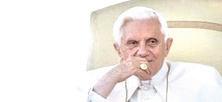

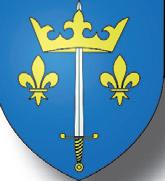
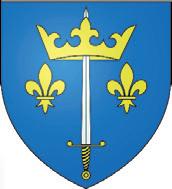


Pray for doctors, MPs
Archbishop pleads for prayers to save Australia’s unborn from hidden holocaust
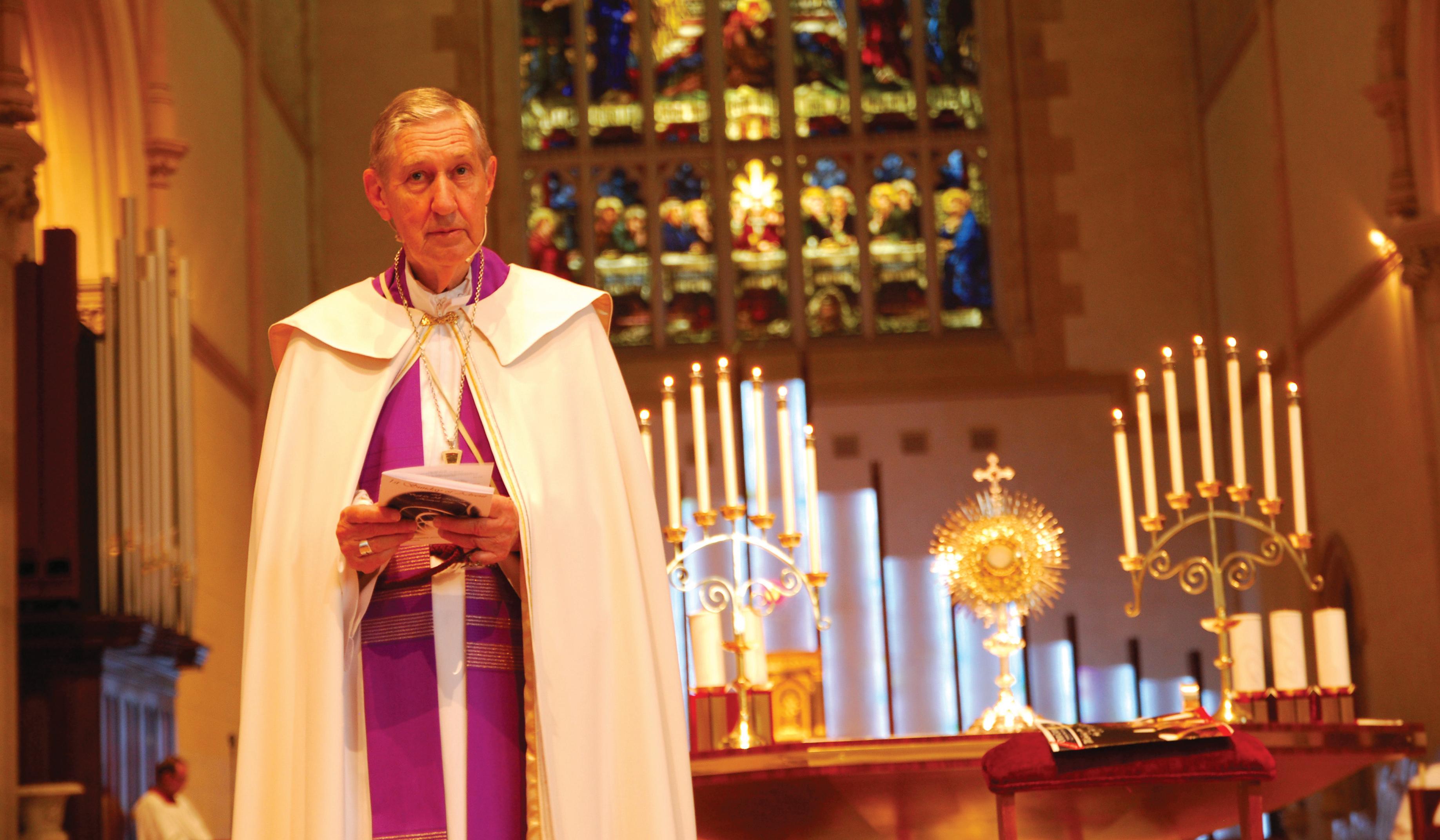 BY BRIDGET SPINKS
BY BRIDGET SPINKS
ARCHBISHOP Barry Hickey has urged people to pray for the conversion of politicians’ and doctors’ hearts and for strong families, as it is through them that children, including the unborn, are best protected.
He made these petitions as reflections on the Joyful Mysteries – those encompassing the conception, gestation and birth of Christ –during a Holy Hour of Adoration of the Blessed Sacrament at St Mary’s Cathedral on the Vigil of the First Sunday of Advent, 27 November.
The Holy Hour, which followed the Vigil Mass, was offered at the request of Pope Benedict XVI, who urged the world’s Bishops to join him in a Vigil for All Nascent Human Life.
“Aware of how much threat there is in today’s world to children who are conceived in the womb, he has asked us to pray that their journey be a safe one, that their lives be protected,” Archbishop Hickey said during his homily in the Mass.
Prior to the Vigil, the Archbishop wrote to many different groups
and movements throughout the Archdiocese to promote the sanctity of unborn life, either by going to their parish to pray for all nascent human life or to attend the Vigil in St Mary’s Cathedral, to pray that “the current acceptance of abortion in our society will be seen as the tragic mistake that it is and that we all respect nascent human life”.
There was a strikingly youthful presence in the congregation who stayed after the Vigil Mass to join Archbishop Hickey in praying the five Joyful Mysteries of the Rosary and for Benediction.
The Archbishop gave a short meditation and reflection on each mystery before it was prayed, drawing on themes from his recent Pastoral Letter on Children.
The First Joyful Mystery – the Annunciation - was offered for all pregnant mothers in the hope that every child conceived is to be loved. The second – the Visitation - was offered for strength for all families.
“The best protection comes for tiny children through the family. Therefore, we pray that families today be strong,” he said.
“At the same time, we think of
families in great poverty. Even in our affluent country, there are many families who do not pay their mortgage, families who can’t pay their electricity bills, whose water is turned off because they can’t pay it.
“The whole family suffers, the children suffer.”
The Third Mystery – the Birth of Our Lord - was offered up so that the scourge of drugs may disappear from human society so that families and children may be protected from the damaging effects of drugs.
The Fourth Mystery – the Presentation of Jesus at the Temple - was prayed for the conversion of hearts - for politicians, for those who form social policy and for those doctors who perform operations that kill the unborn childthat they may see that every child conceived is to be preserved, loved and given a chance to grow.
The Fifth Mystery – the Finding of the Child Jesus in the Temple - was offered for those who were present and those who work to preserve life and offer support and protection for women.
Pope Benedict XVI also welcomed the beginning of Advent
with a prayer for life and a defence of the human embryo.
The Pope presided over an evening prayer service at the Vatican on 27 November, part of a worldwide pro-life vigil.
Pope Benedict XVI said it was an appropriate initiative to launch Advent, the liturgical period in which the Church prepares to celebrate the birth of Jesus.
In a homily, he said the Church’s teaching against abortion comes from its teaching about the dignity of every human life and its concern that the unborn is most vulnerable to “the selfishness of adults and the clouding of consciences”.
“There are cultural tendencies that seek to anaesthetise consciences with spurious arguments,” the Pope said.
Regarding the human embryo, the Pope said science itself has demonstrated the embyro’s autonomous capacity of interaction with the mother, the coordination of its biological processes, the continuity of its development and its complexity as an organism.
“It’s not a question of a collection of biological material, but of a new
living being, dynamic and marvellously ordered, a new individual of the human species,” he said.
“This is how Jesus was in Mary’s womb; this is how we each were, in our mothers’ wombs,” he said.
The Pope cited the early Church author Tertullian, who reasoned that abortion is wrong because, as he wrote, “He is a man, who is to be a man.” The Pope added that “there is no reason not to consider him a person from the moment of conception.”
Pope Benedict emphasised that the threat to human life does not end at birth.
He added that children today are often subject to abandonment, hunger, poverty, disease, abuse, violence and exploitation; faced with this “sad panorama of injustices” before and after birth, the Church calls everyone to responsibility, he said.
He urged leaders in politics, economics and communications to do everything possible to promote a culture that respects human life and to establish a network of services that support human life.
Wednesday,1 December 2010 THE P ARISH . THE N ATION . THE W ORLD . THERECORD COM AU THE R ECORD WESTERN AUSTRALIA’S AWARD-WINNING CATHOLIC NEWSPAPER SINCE 1874 $2.00
Solemn occasion: Archbishop Barry Hickey leads an hour of adoration praying for all nascent life at St Mary’s Cathedral on 27 November.
PHOTO: BRIDGET SPINKS
ADDITIONAL REPORTING BY CNS
among the faithful. Page 7 among the faithful. 7
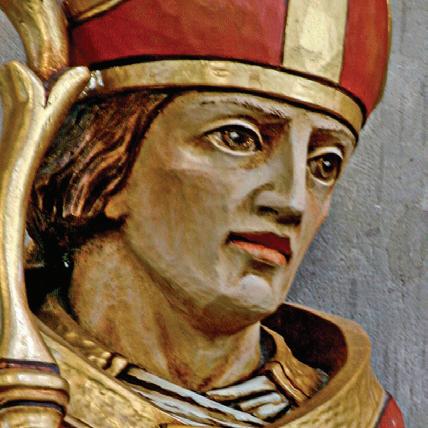
Charity looks for new home
BY GLYNNIS GRAINGER
IN the giving stakes, CherryDell Riupassa punches above her weight but the life’s work of this ordinary pensioner and single mother is facing a significant hurdle.
Joseph’s Coat, the WA-based Christian charity she founded to help destitute children in third world countries has to find new premises to house its merchandise and packing rooms.
Ms Riupassa told The Record that they are looking for a new home as their 12-month loan of a cottage owned by a Christian church in Bayswater comes to an end.

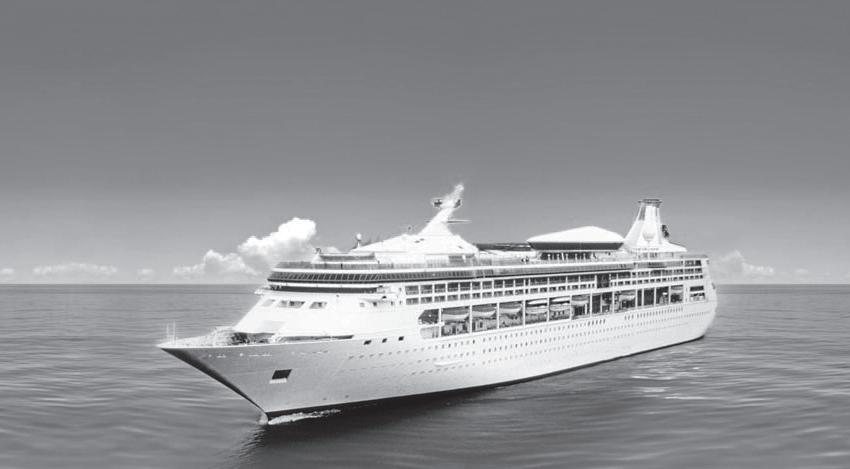
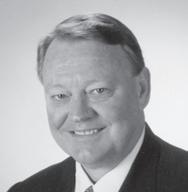
The Parish. The Nation. The World. Find it in The Record.
Each month the organisation sends around 20 parcels of clothing, linen and toys overseas.
“Christians help us and all the officebearers are Christian, including Catholics,” Ms Riupassa said.
“Abandoned children, children with AIDS, children living on rubbish dumps and girls rescued from brothels are among those we help.”
Her work began in 1981 while she was living in the United States. She started out sending clothes to children in Lebanon through friends she had in the United Nations.
After living in Perth for 10 years, she began sending parcels to the Philippines and South Africa in 1985.
Apart from clothes, Joseph’s Coat sends knitted teddy bears, beanies, scarves, rugs,
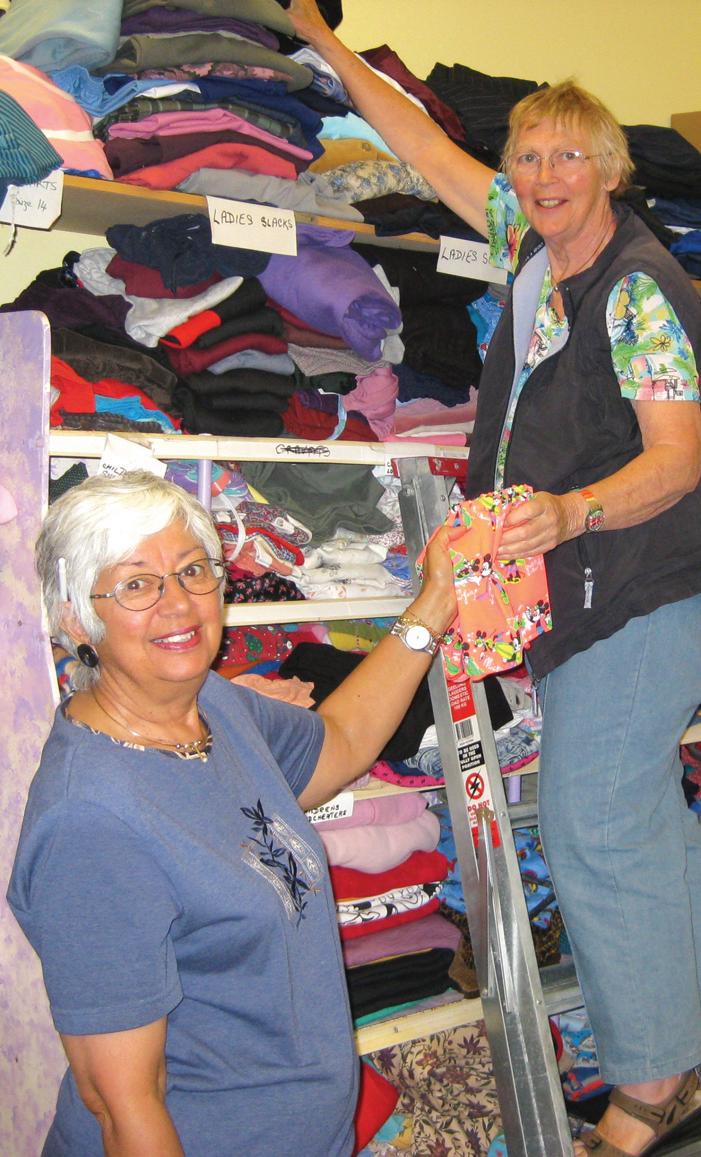
nappies, towels and soap, while responding to specific requests for essential items.
The organisation formed JCI Medical Outreach to send medical items to refu-
gee families, leprosy clinics, street kids and people with disabilities amongst others in countries such as Cambodia, Ecuador, India and Romania.
Joseph’s Coat supplies Christian Brother Olly Pickett, at Wangara, with all-new rugs and toys that go out with his wheelchairs – nearly 1,000 rugs a year, and hundreds of stuffed toys.
Seven wheelchairs have just gone by container to Uganda – at a cost of $13,000 a container, including Customs – paid for by a man in Northam.
She gave a lot of help to the late Fr Brian Morrison with his charity work with the Papua-New Guinea tsunami, or tidal wave, and to the Maldives, with the Boxing Day tsunami.
Volunteers work at the cottage from 9.30am to 12.30pm on Mondays and Fridays – the latter when country people come and stay in Perth for the weekend. Six men in Albany and two in Perth make wooden toys for the parcels.
A stall is held once a month outside the Stirling Community Centre at the back of Karrinyup Shopping Centre, borrowing a couple of trestles from the City of Stirling.
The charity has appealed for members of the public to consider helping out; whether sorting, packing, sewing bags, or helping to transport parcels overseas and interstate when travelling.
Donations can be sent to: Joseph’s Coat Inc, PO Box 1503, Osborne Park BC, WA 6917, telephone/fax 9446 9624.
Care givers called on



THE R ECORD New Contacts
Editor
Peter Rosengren office@therecord.com.au
Journalists
Bridget Spinks baspinks@therecord.com.au
Mark Reidy mreidy@therecord.com.au
Anthony Barich abarich@therecord.com.au
Advertising/Production
Mat De Sousa production@therecord.com.au
Accounts
June Cowley accounts@therecord.com.au
Classifieds/Panoramas/Subscriptions
Bibiana Kwaramba office@therecord.com.au
Record Bookshop
Bibiana Kwaramba bookshop@therecord.com.au
Proofreaders
Chris
Contributors
The
Adelaide
Website:
The
10
11
12
14
ST JOHN of God Healthcare distributed prayer cards to all its care givers this year with the call to action, Go and do likewise, for its Foundation Day celebrations across the organisation on 7 October.
The celebration commemorated the founding of the Sisters of St John of God in 1871 in Wexford, Ireland. In celebrating the day, we renew our commitment to our Mission and Values.
Prayer cards – which double as bookmarks – featured a prayer expounding our five Values: Hospitality, Compassion, Respect, Justice and Excellence.
The cards also feature aspects of a series of paintings in St John of God Health Care’s West Perth boardroom, which were commissioned to reflect and honour the organisation’s heritage and founding story and to inspire our actions today. Like the paintings, the prayer cards profess the Sisters’ motto Caritas Christi Urget Nos (The love of Christ urges us) as well as the scriptural call to action, Go and do likewise (Luke 10:17).
These phrases express the motivation behind the services provided by our founders and now entrusted to us, as well as the intention of our Mission today.
Artist Jillian Green said of the artwork: “I have used both natural and manmade symbols associated with Ireland as well as some patterns adapted from the Irish pages of the Book of Kells. Contemporary design devices have also been incorporated to reflect the forwardlooking focus of the Mission today.”
Visit babies online
FAMILY and friends scattered around the world can now enjoy a live ‘virtual visit’ with babies born at St John of God Hospital, Murdoch, thanks to an innovative service currently being trialled.
The Look@MyBaby service, which was developed in Australia, features a small web-cam attached to the baby’s cot which streams live video over the internet to a mobile phone or computer.
The hospital’s Director of Nursing, Robyn Sutherland, said the new service helped connect families across long distances and could also be valuable in managing visitor numbers.
“Our new babies receive many welcome visitors, but Look@MyBaby can give friends and family the option of enjoying a ‘virtual visit’, giving our new mums a little more time to relax before going home,” Ms Sutherland said.
Several new mums have taken up the complimentary offer of Look@MyBaby available during the trial period. New mum Aemy Chan said she thought the service was great, not only for her friends and family overseas, but also locally.



THE R ECORD New Contacts
15
“We have been showing off Buddy to our friends and family in Malaysia and Singapore, but it’s also good for people in Perth who can’t come to see him,” she said.
Parents can register for Look@MyBaby as a paid subscription service for the duration of their hospital admission. A unique security code ensures parents decide who is given access to a virtual visit.
Jaques Eugen Mattes
Debbie Warrier John Heard Karen and Derek Boylen Anthony Paganoni CS Christopher West Catherine Parish Bronia Karniewicz Fr John Flader Guy Crouchback
Record PO Box 3075
Terrace PERTH WA 6832 21 Victoria Square, Perth 6000 Tel: (08) 9220 5900 Fax: (08) 9325 4580
www.therecord.com.au
Record is a weekly publication distributed throughout the parishes of the dioceses of Western Australia and by subscription.
Record is printed by Rural Press Printing Mandurah and distributed via Australia Post and CTI Couriers. SAINT OF THE WEEK Nicholas fourth century December 6 From the ninth century in the East and the 11th century in the West, Nicholas has been one of the most popular saints in Christendom and art, and the patron of many countries, dioceses, churches and cities. He was bishop of Myra in Lycia (now Turkey). According to folklore, he saved three girls from prostitution, restored to life three murdered children hidden in a brine-tub or saved from death three unjustly condemned men. There is no evidence that he attended the Council of Nicaea in 325 or suffered persecution for his faith. ?Santa Claus? comes from the Dutch form of his name: ?Sinte Klaas.? Crosiers 200 St. George’s Terrace, Perth WA 6000 Tel: 9322 2914 Fax: 9322 2915 Michael Deering 9322 2914 A division of Interworld Travel Pty Ltd ABN 21 061 625 027 Lic. No 9TA 796 michael@flightworld.com.au www.flightworld.com.au Take to the waves in Style • CRUISING • FLIGHTS • TOURS • with a cruise from our extensive selection. OFFICIAL ENGAGEMENTS 2010 DECEMBER 1 Finance Office Annual Mass of Thanksgiving –Archbishop Hickey 2 Blessing of buildings at Corpus Christi College –Mgr Michael Keating 3 Centrecare Launch of WA Suicide Prevention Strategy – Archbishop Hickey End of year Mass for Neo-Catechumenate Way –Archbishop Hickey Justice Support Forum, East Perth –Mgr Brian O’Loughlin VG 4 Youth Mass, Vietnamese Catholic Community –Archbishop Hickey 5 Mass at Bandyup Prison – Archbishop Hickey 6 Emmanuel Centre Christmas Party –Archbishop Hickey 7 Catholic Marriage Education Service Board end of year gathering - Bishop Sproxton Annual Pregnancy Assistance Mass, Morley –Archbishop Hickey 8 Launch of Cathedral History – Archbishop Hickey 7.30 pm St Mary’s Cathedral Novena Mass –Archbishop Hickey 9 Graduation Mass, University of Notre Dame Australia – Archbishop Hickey Opening of buildings, St. Patrick’s School, Fremantle – Mgr Brian O’Loughlin VG
The
Mercedes College Staff Mass, St Mary’s Cathedral
Archbishop Hickey
–
Profession of Carmelite Sister, Nedlands –Archbishop Hickey Shopfront Christmas Party, Maylands –Archbishop Hickey
Embrace the Grace Mass, New Norcia –Archbishop Hickey
Catholic Pastoral Centre Annual Thanksgiving
– Bishop Sproxton St Lazarus Day Service, St Bartholomew’s –Bishop Sproxton
Mass
Heads of Churches
Rivervale –Bishop Sproxton
Meeting,
CherryDell Riupassa, below, with Joseph’s Coat volunteer Gini Bristowe. PHOTO: GLYNNIS GRAINGER
Page 2 THE PARISH 1 December 2010, The Record
Gentle, prayerful Sister goes to God
BY GLYNNIS GRAINGER
MERCY Sister Pauline Crowe, whose life ministry was primary teaching, was 77 years a nun when she passed away peacefully at Catherine McAuley Nursing Home on 6 November, aged 97.
Her Requiem Mass was celebrated in Our Lady of Mercy Chapel, Wembley on 10 November.
The Sisters of Mercy Perth said in their death notice that they fondly remembered the gentle, prayerful woman who extended mercy to many.
Sr Mary Pauline was born on 30 June 1913 at Gortnaglough Rath, County Clare, Ireland to Lizzie and James Crowe, and was the second of five daughters.
In November 1930, she left Ireland for WA and came to stay with her uncle, Fr O’Gorman, who was then parish priest of East Guildford.
Apparently, he nurtured her vocation to the Religious life and influenced her entrance to the Perth Sisters of Mercy on 1 January 1931.
She was professed on 8 December 1933 and, on her reception day, received the name Sr Mary Benedict Crowe.
Some years later, after the Second Vatican Council which ended in 1965, she reverted to her birth name Pauline.
In the field of primary education, Sr Pauline was regarded as a very thorough teacher and a hardworking school administrator.
The scope of her teaching positions ranged from rural areas to city suburbs, including Victoria Square, Subiaco, South Bunbury,
Dardanup, Herne Hill, Bayswater, Belmont, Guildford, Bridgetown, Gosnells, Queens Park, Victoria Park and Carlisle.
As Principal of some of the above schools, she was known for her firm discipline which was balanced by her great kindness, not only to students, but to families as well.
Sr Pauline was a perfectionist, who expected a lot of herself and the best from everyone.
She was also a very successful teacher of piano music and theory, which she took out of school hours.
She was a very social human being who had a great capacity for friendships and had many lifelong friends.
Over many years, in many of the places where she ministered, she worked as a Sacristan in the local parish church, where her goodness, kindness and support of priests was exceptional.
Even from a distance, Sr Pauline was much loved by her family members and more recently by her nieces, nephews and their children, with whom she kept in touch by letter and phone.
In her last years at Mercy Aged Care, she was one of the most loved residents at the Centre, with her gracious manner and growth into an acceptance of her ageing, which was tangible and inspiring.
Her attitude touched and influenced people responsible for her spiritual and care management.
May this beautiful lady, who was transformed in the sufferings of her later years, be now at peace with God in the company of her family members, her Sisters of Mercy and her close friends.
Horizon House bolstered
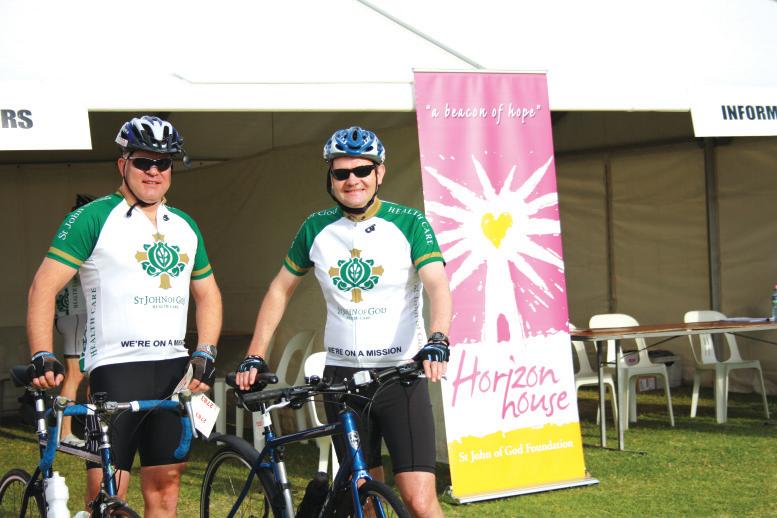
OVER 4,000 cyclists hit the streets of Perth on 21 November to raise money for several charitable causes, including a St John of God Health Care project that provides long-term accommodation and hope for some of the city’s most vulnerable young people.
The annual Santos Great Bike Ride, which began in 2004, hopes to raise over $100,000 from this year’s event, with the money being divided between St John of God’s Horizon House Project, Hope for Children and the Heart Foundation.
Horizon House has four homes currently operating in Western Australia (Wanneroo, Wilson, Bunbury and Geraldton) that provide disadvantaged 16 to 22 years olds with accommodation and intensive support within a family environment. Residents of the four homes were a part of the Horizon House Cycling Team who participated in the ride or helped as volunteers on the day and raised $6,425, the second highest of any team.
The Great Bike Ride, which ran between Perth and Fremantle, was one of several events organised in the month of November to raise funds for Horizon House projects said Mike Board, Group Manager of Youth Services at St John of God health Care.
“The number of people supporting Horizon House during November has been quite astounding. We have been inspired by the commitments that have been made by volunteers, fundraisers and sponsors in recent weeks,” Mr Board said. “The staff at St John of God Foundation worked tirelessly to organise events and coordinate hundreds of volunteers who helped make the Great Bike Ride a success. The carers and young people at Horizon House also made a big commitment to the fundraising effort.”
Anyone wishing to find out more or donate to Horizon House go to: http://ssjgfoundation.org.au
Bishop’s brother built East Vic Park church
Geraldton Bishop’s brother built East Victoria Park Church on brink of milestone
BY JUSTIN BIANCHINI JR
THE Our Lady Help of Christians Parish Church in East Victoria Park that celebrates its 50th birthday this month was designed by a renowned WA architect and built with voluntary labour under an Italian migrant builder who is the father of the Bishop of Geraldton.
The late Peter Overman designed Our Lady Help of Christians Catholic Church in East Victoria Park as a student initially for a university project.
He approached then parish priest Fr Francis O’Connor with the design and parishioner John Bianchini set about building the parish’s new church with the help of many parishioners.
Descendants of those original church workers and the very workers themselves will attend a celebratory Mass on 12 December and look forward to the welcoming back of former parishioners and friends.
“People are just so excited to be coming,” Rose Bianchini, John’s daughter, said. Rose is the younger sister of Highgate parish priest Fr Peter Bianchini.
Bishop Justin Bianchini of Geraldton, John’s younger brother, said that while his recollection of the details of the building of the church are vague –“perhaps because I was in Italy at the time of its construction” – “Johnny’s enthusiasm continued to flow for many years”.
“My clearest memory of Johnny in regard to Our Lady Help of Christians Church in East Victoria Park was his exuberance,” the prelate said.
“While he faced work and play with this zest generally, I remember him being extra excited about the church.
“Johnny’s faith and belonging to our Church was paramount and so being involved with his
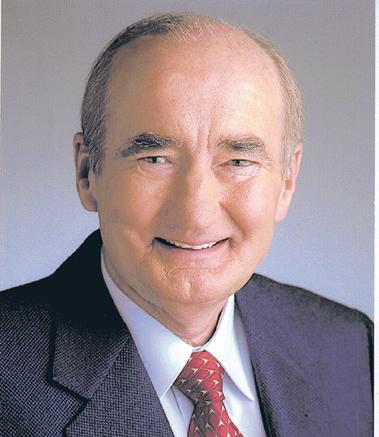
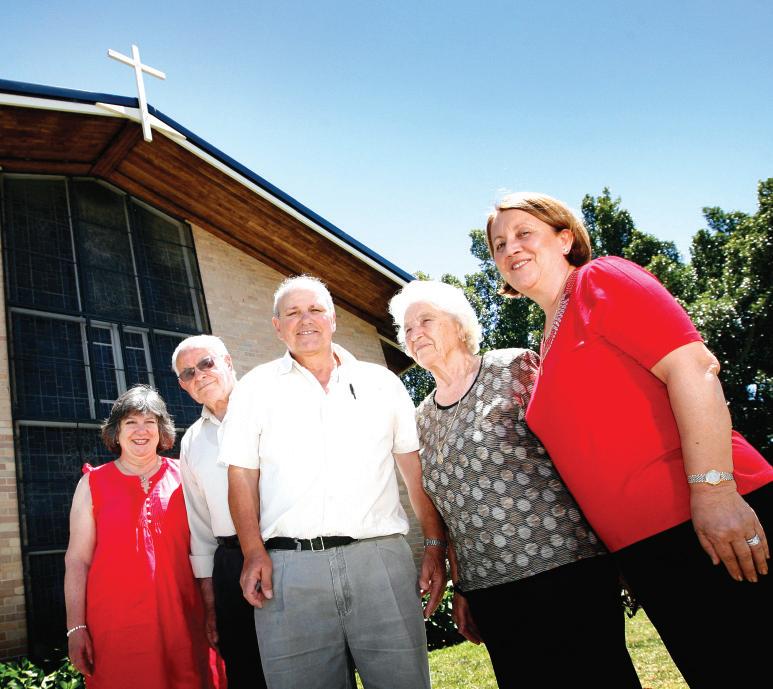
own parish church in this way was a highlight in his life. The work he put into this church was incalculable, however it was superceded by the joy and good feeling Johnny experienced.
“As Johnny generously gave his time and his high quality work skills and supervision to the project, he did it with immense pride. He was just so proud of ‘our church’ which he spoke often about.
“Our dad - Pop to us all – with his stone masonry skills, had to be drawn into the whole project by his son. Accordingly, the graceful yet sturdy stonework for the grotto and the retaining wall for Xavier College (now part of Ursula Frayne Primary School campus) was Pop’s contribution. “I personally have always admired the craftsmanship of my father, Marcello and my brothers. Our Lady Help of Christians Church and surrounds stands as a shining example of this by Johnny and our Pop.”
As the church anniversary draws near, Rose said that “all the Italians (in the community) are telling me stories and giving me
old photos and memorabilia”. The church’s milestone coincides with the 75th anniversary of the East Victoria Park parish, established by Fr O’Connor with a church which doubled as a school in 1935. The 12 December celebration starts with a Mass at 9.30am followed by refreshments. Current parish priest Fr Chinnaiah Arulraj Mulaguri has planned 11 days of Holy Hours of Eucharistic adoration leading up to the celebration.
The adoration will take place from 6.30-7.30pm from 1-11 December, preceded by Mass.
Bunbury Bishop Gerard Holohan will preside over the service along with fellow former parishioner and priest Peter Bianchini.
Joining them will be Fr Arulraj and former parish pastor Brian Harris, health permitting.
Those people attending the celebration are encouraged to bring photographs and memorabilia from their time at the parish.
For details about the event, call 9361 1167.
- story and photo courtesy of Community Newspaper Group
Just over the Causeway on Shepperton Road, Victoria Park. Phone 9415 0011 PARK FORD 1089, Albany Hwy, Bentley. Phone 9415 0502 DL 6061 JH AB 028 JOHN HUGHES Choose your dealer before you choose your car... Absolutely!! WA’s most trusted car dealer
Local parishioners Rose Bianchini, Tony Mancini, Sebastian (Sam) Zammit, Maria Radi and Pam Blascetta in front of Our Lady Help of Christians Parish Church in East Victoria Park. PHOTO: SIMON SANTI
Page 3 THE PARISH 1 December 2010, The Record
New priest embraces the Kimberley’s crosses
BY MARK REIDY
WHEN Fr John Purnell headed into a remote corner of the Diocese of Broome in September, within weeks of his ordination, he knew he would encounter youth suicide, petrol sniffing, alcoholism and domestic violence.
Based in the Aboriginal Community of Balgo, deep in the Kimberley region, Fr John said that his eyes had been opened to the challenges five years earlier during a 12 month stint as a volunteer in the region.
During that period, Fr John said that he believed he had been able to make a positive impact during the many long nights he spent supporting the petrol sniffing gang that roamed the area and he is now looking forward to reigniting his relationships within the Community.
He believes that his call to reach out to the most marginalised and vulnerable was planted in his heart during the many trips he made to India after he had completed high school.
Fr John, who was an Anglican at the time, was inspired by the work of the Jesuits in the slums and leprosy camps throughout India.
It was a call that stayed with him as he studied theology for four years at St John’s Anglican College in Morpeth, NSW and one that eventually drew him back to India.
“I loved my time there so much that I ended up studying at the Jesuit Theological College in Pune for the next four years and completed a Masters in Eastern Philosophy” he said.
It was also where he converted to Catholicism before returning to Australia and joining the Jesuit Novitiate in Sydney.
At this point, Fr John continued to harbour a desire to return to India but eventually came to accept that, as a Jesuit Novice, this would not be possible.
“Because of the continued yearning and call of God for me to do Mission work I decided that the most challenging place in Australia
At a Glance
What’s happening around the Archdiocese?
Embrace the Grace Youth Conference
Life. Truth. Freedom. This classic end of year youth conference will host over 150 young people 16-35. Special guest speakers include Archbishop Hickey and Auxiliary Bishop Don Sproxton, Anna Krohn, Jonathon Doyle, Sr Bernadette Pike, Dr Amanda Lamont and Paul Kelly. Registrations are now due and forms are available at the Respect Life Office or at the Catholic Youth Ministry Office. Contact the RLO on 9444 5320 or respectlife@perthcatholic.org.au for more information.
When: 8-12 December at New Norcia. Cost $270 but sponsorship is available.
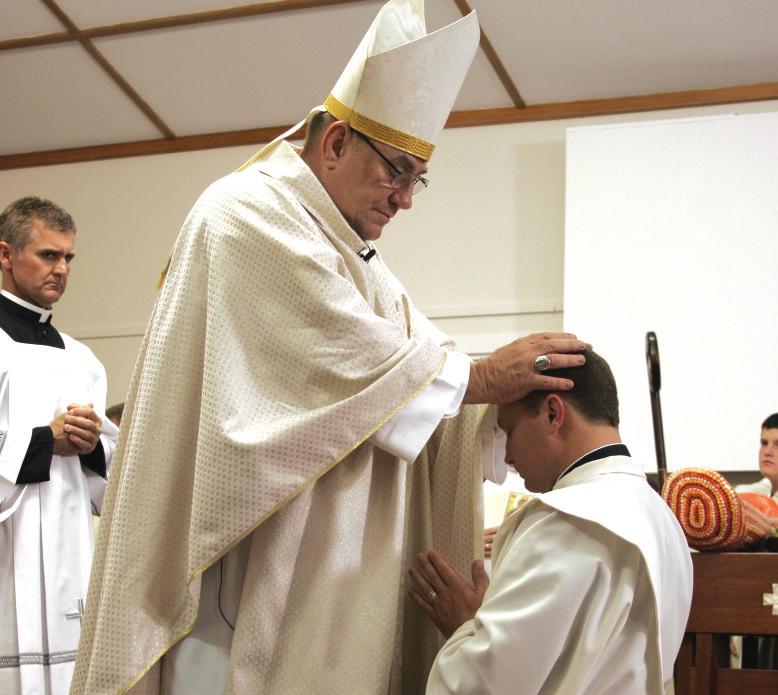
would be in the remote Aboriginal regions in the Kimberley.”
It was then that he completed his 12 months as a volunteer before Bishop Christopher Saunders sent him to Rome for four years formation at the Pontifical Beda College where he also completed another Bachelor’s degree and Master’s, this time in Ecumenism.
Fr John returned to the Broome Diocese for his Ordination and has hit the ground running since his appointment as Administrative Priest of the Balgo, Mulan and Billiluna Communities.
It took a few days for him to apologetically reply to initial contact from The Record, explaining that he had been dealing with funerals and attempted suicides during the previous week.
It is a far cry from the organised and timetabled existence of college life but Fr John is at peace with his placement and knows that this is where God wants him to be.
“Out here, time is nothing and this is one of the biggest adjustments,” he said.
Kukerin
Christian Inspiration Dinner
Kukerin is located 300km south east of Perth at the bottom of the wheatbelt region. The farm is located 2km past the Kukerin turn off. The dinner will be a chance to welcome the Christmas season, hear a talk, listen to and play music. All welcome. Donations welcome to support charities on the night. For more information about accommodation options, directions or details about the event or Mass on Sunday, contact: Cathy or Nick Kelly 9871 9032 or Mary Nenke 0898 646 054 or Suzanne Nenke 0427 840 728.
When: 4pm on 4 December at Cambinata Yabbies Shearing Shed, Kukerin.
Schoenstatt Shrine
Nativity Play and Christmas Carols at the Shrine
The Schoenstatt Sisters of Mary invite anyone who would like to sing and dance in the Nativity Play to participate or just come along.
the local culture because people are able to recognise that he is prepared to work hard for them, especially in his dealings with troubled youth.
He also believes that efforts to incorporate such cultural notions as the Smoking Ceremony and Water Blessing into the Liturgy, as well as the two predominant languages, Kukaja and Walmajari, have contributed to a deepening of his relationships. Learning these languages is another challenge that Fr John is slowly attempting to take on.
It was Fr John’s missionary heart, along with his willingness to embrace the culture and remoteness of the Kimberley region that encouraged Bishop Saunders to appoint him to the Balgo Mission.
When contacted by The Record Bishop Saunders said that he was confident that Fr John would be a wonderful pastor to his people.
Adelaide life vigil draws 100
BY ANTHONY BARICH
ADELAIDE’S 40 Days for Life campaign drew over 100 pro-life activists, bringing to residents’ attention the practice of abortion in their midst in October.
Volunteers participated in the global campaign from 22 September-31 October, taking turns to pray in front of the Pregnancy Advisory Centre in Woodville in the city’s western suburbs. The campaign, which originated in the US, brings volunteers together throughout the world to pray, fast and hold vigil outside abortion clinics as well as operating outreach programmes to local people.
Georgina Pinwill, a 26 year old law student, directed a group of 15 teenagers who door knocked throughout the suburb, an initiative which organisers believe is crucial to the campaign’s success.
“I can try to plan the day with appointments and so on but something always interferes with that plan so I have learnt to simply go with the flow.”
It is a philosophy that Fr John has had to weave into his clerical duties as he shares his time between the three Communities, which mainly consist of Indigenous people and a small number of nonIndigenous schoolteachers.
“Travelling between them all takes a lot of effort as the roads are all unsealed and the trucks and rain tear them to pieces.”
He drives to Mulan every Sunday morning for Mass and then on to Billiluna for Sunday night Mass where he stays overnight.
“The following morning I take Scripture classes with the school kids in Billiluna. We have fairly good attendances at the Masses and also for Baptisms and Funerals. However, there are not so many on weekdays,” he said.
Fr John acknowledges that the lifestyle can be very draining but feels that he has been accepted into
The Nativity Play is specially aimed at children. Picnic dinner followed by carols and Nativity Play. Bring chairs/blankets and a picnic tea and settle in for a relaxing family evening. Coffee and tea provided. Tel: 9399 2349.
When: 6.30pm on 4 December, at Schoenstatt Shrine, 9 Talus Drive, Armadale.
Holy Family, Como
Catholic Charismatic Renewal
There will be an end-of-year Mass and celebration on 7 December. Prayer teams will be available after Mass for personal prayer. A collection will be taken up. Please bring a plate for light supper. Queries to Dan on 9398 4973. When: 7pm on 7 December at Holy Family Church, corner Thelma St and Canning Hwy, Como.
Disciples of Jesus
Summer School of Evangelisation
The Disciples of Jesus Covenant Community will run a week of retreat, prayer, fun and fellowship
“He has already shown his capacity to be humble, to work hard and to be committed to seeing that justice for his people is realised in everyday life”, the Bishop said.
“Being a man of prayer and a person who draws much spiritual sustenance from Scripture, Fr John is well and truly able to be everything God has called him to be”.
Bishop Saunders also said that the Diocese of Broome had been founded specifically for service to the Aboriginal people and that Fr John now belonged to a long and heroic tradition of missionary endeavour.
“He is welcomed as a servant of the Gospel, called to evangelise and minister to a people for whom the Good News has much to offer. Like those who went before him –the Cistercians, the Pallottines, the Salesians and the Benedictines - he will need to be firm in his resolve to preach Christ, to be dedicated and determined in the face of any adversity, to be utterly convinced of his calling to be a faithful priest and to be intense in his love for his people”. It is a challenge that Fr John has already well and truly embraced.
at New Norcia for young people 16-35 and the young at heart in the new year. Cost is $365 per person ($345 till 30 November, 2010). Enquiries and bookings phone Richard Egan on 0416 148 008 or email registrarsse@disciplesofjesus.org. For more information, visit www.summerschool.org.au. When: 9-16 January 2011, New Norcia.
Catholic Youth Ministry
World Youth Day Picnic
The WYD Picnic is an afternoon for fun in the sun. It is for any young person who is planning to be a WYD Pilgrim or who would just like to support those going. It will be a way to build the pilgrim community in Perth. There are BBQ facilities available nearby, or picnic-ers can bring their own prepared lunch. BYO everything. For more information contact CYM on 9442 7912. When: 1-4pm on 5 December at City Beach. Send your At a Glance items to baspinks@therecord.com.au.
Event coordinator
Marguerite Wills said that while teens were initially fearful of venturing into strangers’ homes, they have gained in confidence and are inviting people to put 40 Days for Life signs in their front yards.
The teens reported that many Woodville householders were oblivious to the fact that there was an abortion clinic in their neighbourhood.
Miss Wills reported that the campaign “seemed to draw Catholics who would never dream of going to an abortion clinic out of the woodwork”, as well as other Christians.
The volunteers joined prolifer campaigners in 238 cities around the world who participate in 40 Days for Life campaigns over Lent and the September-October period.
South Australian organisers were trained by the international movement, The Helpers of God’s Precious Infants, founded in Brooklyn, New York by Mgr Philip Reilly.
Paul Hanrahan, who has previously organised the event in Sydney, trained the group on building relationships with local police and councils.
The Archdioceses of Sydney, Melbourne and Brisbane participated in the campaign in Lent this year, with the NSW event starting and climaxing with Auxiliary Bishop Julian Porteous leading over 200 in procession.
While pro-choice students from Adelaide University had promoted a counter-protest on the social networking website facebook, only 12 showed up on 22 September to face the 60 pro-lifers. Miss Wills said it appeared that the pro-lifers’ own peaceful event set the tone as “they never said a word to us”. TV cameras were set up waiting for a confrontation, but the students just sat down and talked among themselves,” Miss Wills said.
The event had the support of Australian Catholic Bishops’ Conference President, Archbishop Philip Wilson of Adelaide, and was attended by former Adelaide Archbishop Leonard Faulkner.
The Record understands that activists in Canberra, Darwin and Perth have also shown interest in hosting the event.
Bishop Christopher Saunders of Broome ordains Fr John Purnell to the priesthood.
Page 4 THE PARISH 1 December 2010, The Record
Condom debate a chance for priests to explain teaching
BY ANTHONY BARICH
THE public debate on the Church’s teaching on condoms, triggered by Pope Benedict XVI’s comments in a new book, is an ideal opportunity for parish priests to clarify it for the faithful from the pulpit, the Caritas Internationalis president said.
Salesian Cardinal Oscar Rodriguez Maradiaga, Archbishop of Tegucigalpa, Honduras, told The Record Catholic newspaper of the Archdiocese of Perth that many Catholics do not know what the Church teaches in this regard.
The controversy started when Vatican newspaper L’Osservatore Romano published on 20 November excerpts of a book-length interview with German journalist Peter Seewald called Light of the World: The Pope, the Church and the Signs of the Times.
In it, when the Pope was asked whether it was “madness to forbid a high-risk population to use condoms”, he replied: “There may be a basis in the case of some individuals, as perhaps when a male prostitute uses a condom, where this can be a first step in the direction of a moralisation, a first assumption of responsibility, on the way toward discovering an awareness that not everything is allowed and that one cannot do whatever one wants.”
“But it is not really the way to deal with the evil of HIV infection. That can really lie only in a humanisation of sexuality.”
Cardinal Maradiaga laughed off claims made in secular media that the Pope has changed the Church’s teaching on the use of condoms, saying “of course not” when asked if it was true.
“It has been the doctrine of the Church all the time that when there are emergency cases the principle of double effect (applies),” he told The Record by phone during a fourday trip to Australia. “The Pope was only quoting the extreme cases, so I believe it is coherent (with existing
Antenatal screenings ‘genocide’
A GROUP is threatening to take the New Zealand government to a human rights tribunal over its antenatal screening programme for Down syndrome children.
The Ministry of Health introduced the programme without public consultation in February.
The group – a combination
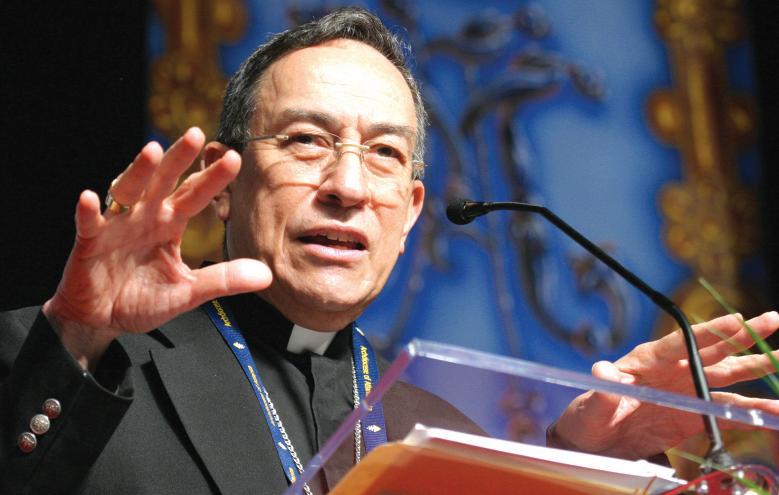
Catholic teaching).” The Church teaches that the principle of double effect may be employed when one is considering an action that is morally good, yet the action involves one or more unintended bad consequences. As these consequences are side effects, and not directly willed, the choice that brings them about is morally acceptable.
“This could be a good opportunity for us in the parishes to clarify and to teach, as very many Catholics do not know what the Church teaches (in this regard),” said the Cardinal, who has completed three separate doctorates in philosophy, theology and moral theology and holds a diploma in clinical psychology and psychotherapy.
“It is the chance for the priest to speak about it, who in our modern Church is also teacher. We, as disciples of Christ, have a lot to learn; we cannot pretend that in special matters all the baptised know everything, as we are always learning and trying to implement what the Mother Church is teaching us.”
Melbourne Archdiocesan
of pro-life supporters and Down syndrome parents - claims that antenatal screening for Down syndrome violates Article 2 of the UN Convention on the Prevention and Punishment of the Crime of Genocide, as it imposes measures intended to prevent births within a specific human group. They say it discriminates against people with Down syndrome.
Article 2 of the convention defines genocide as any act committed with intent to destroy, in whole or in part, a national, eth-
Office for Evangelisation director, Marist Brother Mark O’Connor, brought the Cardinal to Australia with Franciscan Cardinal Wilfrid Napier, Archbishop of Durban, South Africa for the 25th anniversary of the Dom Helder Camara lecture series which focuses on the Social Doctrine of the Church.
Cardinal Maradiaga said that the Social Doctrine of the Church is “the most well kept secret, as many people have never heard about it, yet it’s so important”.
“It’s important as it changes the mentality of many people who think that working for the social doctrine in the Church is mixing in politics; (but) it’s just doing our duty to evangelise the culture of politics and economy,” he said.
“Many people think that Christian life is only in the temple, but you cannot divide the human person - we live in society, so social life has to be illuminated by the Gospel, and this is the role of the Social doctrine of the Church, founded in the dignity of the human person.
“This is the first principle of the
nic, racial or religious group as such, one of which is by imposing measures intended to prevent births within the group.
The others are: Killing members of the group; causing serious bodily or mental harm to members of the group and deliberately inflicting on the group conditions of life calculated to bring about its physical destruction in whole or in part.
Cabinet papers state that the programme would reduce the number of Down syndrome births. About 90 per cent would be aborted.

Mater Dei packs bags for homeless
BY BRIDGET SPINKS
A YEAR 7 religion class at Mater Dei College in Edgewater spent their class time on 25 November packing 80 Christmas bags with soaps, deodorants, toothpaste and toothbrushes for the homeless.
“We’re learning that Christmas isn’t only about getting presents; it’s about giving things to the less fortunate and we’re brightening up their Christmas,” Year 7 student Alex, 12, said.
The bags will go to 80 homeless: 50 men and 30 women between 18 and 70 years of age. The Year 12 students decorated them with the words “Merry Christmas”.
Another Year 7 student, Crystal, 12, said that it was good to share some of their joy with people who don’t have as much as they do.
Students and staff had brought in a number of goods to donate to the Christmas hampers that would be prepared for distribution through two LifeLink charities, DayDawn and RUAH.
Likewise, hampers were also prepared for refugees in the Christmas Island Detention Centre and for those that the St Vincent de Paul Society reaches.
The hampers which the Year 7s packed with toiletries will go to RUAH, a charity that will distribute them to the homeless.
Seven hampers containing mainly goods in a big laundry basket and over $300 in shopping vouchers has already gone to DayDawn.
Hampers prepared with playing cards, books, pens, balls, toys and other presents will go to refugee children on Christmas Island.
There are up to 40 Year 9-12 students at Mater Dei involved in the Social Action group coordinated by Elizabeth Copeland. These students ran a number of fundraising initiatives throughout the year for various charities.
Some of these funds bought shopping vouchers that went into the DayDawn hampers.
The students in the Social Action group have also driven the
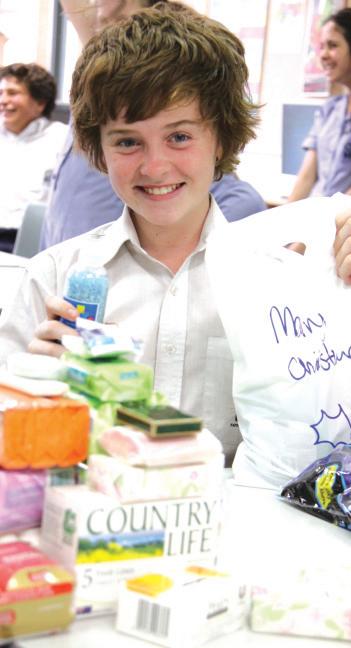
hamper packing that has taken place over the last few weeks as part of Homeroom that at Mater Dei, as part of a vertical pastoral care system, has students from Years 7-12 in each homeroom.
Director of Mission at Mater Dei and Sister of Mercy Kathy Kettle said that packing the Christmas hampers was the practical dimension to the college’s mission which is based on the college’s patron, Mary, the Mother of God.
“When we look at her characteristics, there are plenty of examples of Mary not just contemplating: she responded quickly. After she had heard her own news of the Annunciation, she bolted over to her cousin to accommodate a need,” she said.
“The mission of the college is to imbibe that sort of spirituality so that no matter what the situation of the student - whether at home or at school - they have that foundational understanding of response to a need, the outreach,” she said.
“If an educational institution doesn’t have a mission, it lacks a little soul and character,” she said.
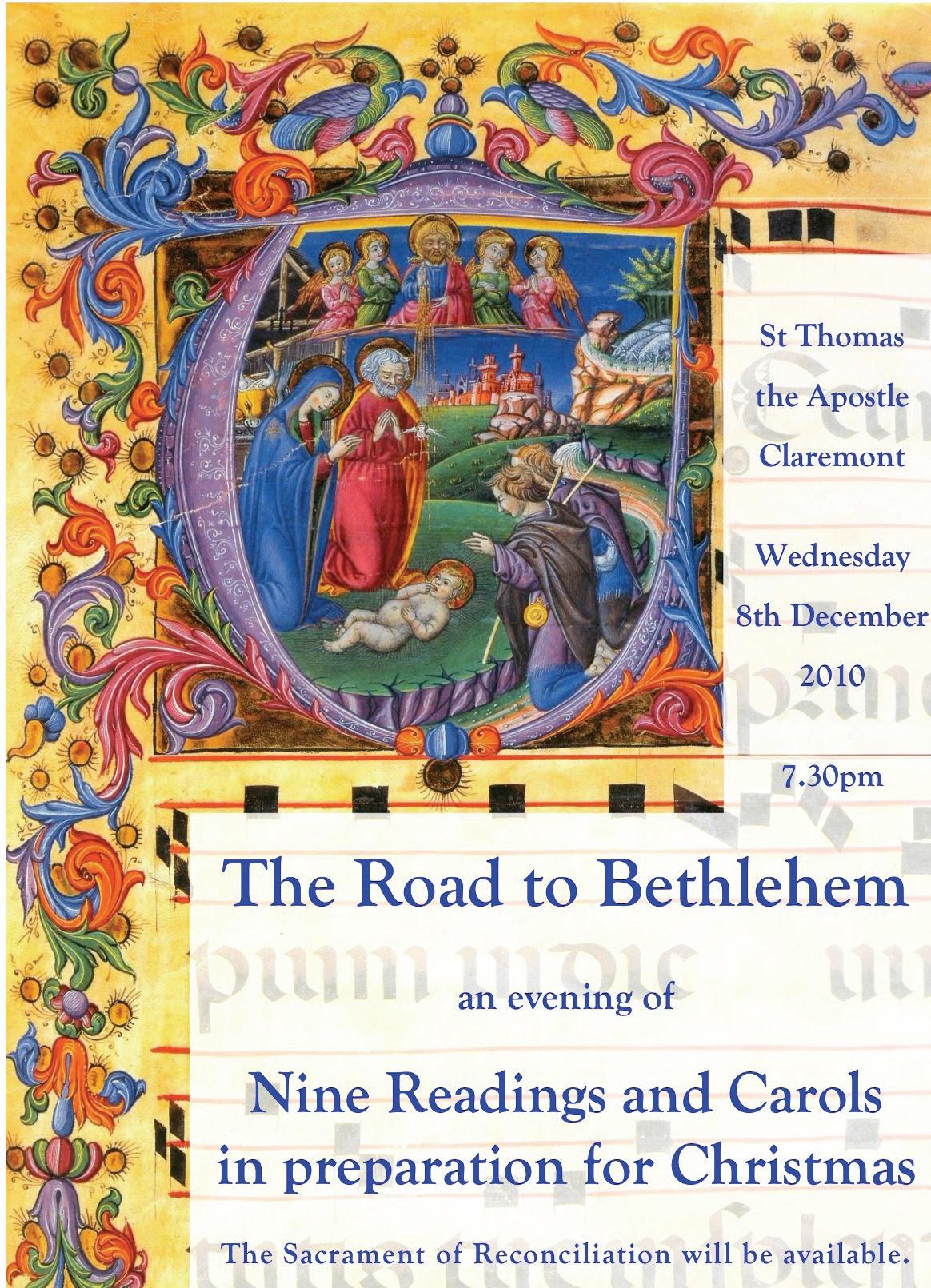 Honduran Cardinal Oscar Rodriguez Maradiaga of Tegucigalpa, who told The Record that the debate triggered by Pope Benedict XVI’s comments in a new book-length interview regarding condoms is an ideal opportunity to explain to Catholics of Church’s teachings on the subject, as many don’t know it. CNS
Graeme Scullion, Year 7, packs Christmas bags for the homeless.
Honduran Cardinal Oscar Rodriguez Maradiaga of Tegucigalpa, who told The Record that the debate triggered by Pope Benedict XVI’s comments in a new book-length interview regarding condoms is an ideal opportunity to explain to Catholics of Church’s teachings on the subject, as many don’t know it. CNS
Graeme Scullion, Year 7, packs Christmas bags for the homeless.
Page 5 THE PARISH 1 December 2010, The Record
PHOTO: COURTESY OF SCHOOL
Wanneroo man to win world for Christ
BY ROBERT HIINI
A former Wanneroo man has been ordained to the diaconate in Rome after seven years of study and formation in the US and Italy.
Fra (Brother) Giles Joseph Mary, formerly Kevin Atherton, was ordained on 24 October in a mediaeval Franciscan church in the town of Tarquinia, less than an hour north of Rome.
The newly appointed Cardinal Valasio de Polis CS presided as Fra Giles continued his journey towards becoming a priest for the Franciscan Friars of the Immaculate.
Speaking with The Record, Fra Giles said it took him 20 years to accept his vocation and that 17 of those years were spent “living a life much too normal.”
“I lived without really thinking much about my proper end and the meaning of why I had been given the gift of life.
“However, the Hound of Heaven was often at my heels, reminding me every so often, with ‘coincidences’ that God had called me to serve Him exclusively.”
As Kevin Atherton, Fra Giles lived an ordinary life: he bought a house, travelled and thought about eventually marrying, settling down and starting a family.
It was the Great Jubilee year in 2000 and praying to Our Lady of Perpetual Help at the North Perth Monastery that brought him the grace to consider God’s will for his life.
Three years of Masses and Rosaries later, he decided to enter the friary in May 2003.
“I finished my last day of work, and to my great consolation the Gospel of Mass that morning was that of the rich young man who was asked to sell all his goods in order to follow Christ more perfectly,” Fra Giles said.
He was sent to one of the friaries in the US for a year before entering the novitiate in the Franciscan Friars of the Immaculate novice house in Connecticut.
“Before one makes his initial vows, he, along with his superior and spiritual director, has discerned whether he is called to be a Religious Brother or study for the
priesthood; in my case it was decided to allow me to try the studies for the priesthood,” Fra Giles said. Fra Giles made his perpetual vows in the Order in September of last year.
“After a load of miracles in order to pass all the exams [studying philosophy in Massachusetts], I was sent to our seminary in Italy to commence my studies in theology.
“Since all the classes in Italy were of course in Italian, I was given a year to pick up the language before beginning lessons. Three years, and about one thousand exams later, by God’s inexplicable Mercy, I was approved for ordination to the diaconate,” Fra Giles.
Fra Giles is currently completing his final exams before, God willing, being ordained to the priesthood in March next year, after which, according to the missionary nature of the Order, he will await his posting.
“I could be sent to any corner of the world, even Australia, in order to win the entire world, in union with our Lady, for the Most Sacred Heart of Jesus.”
Men come alive at Willetton parish
ENGINEERS and businessmen
taught over 50 men how to truly glorify God by being fully alive as males at the parish of Sts John and Paul in Willetton over 19-20 November.
Rob Falzon and Peter Shakhovskoy, both trained engineers who held senior business positions, facilitated a retreat called menALIVE, where the speakers used their talents and abilities in the biggest growth market in Australia – getting Catholic men to re-activate and celebrate their faith.
The pair travelled to Perth to deliver the weekend at Willetton Parish, then at Morley Parish the following weekend.
So far more than 5,500 men across Australia have attended this retreat which, according to those who participated in Willetton, was “truly an inspiring and unforgettable weekend”.
“When you think of a retreat, you think of attendees who are mostly clergy and a bunch of devout women who attend anything and everything to do with the church,” a participant told The Record
“However, it was encouraging to see this group of over 50 men ranging from 20 to 80 years setting aside an entire weekend to grow deeper in their faith and their relationship with God.”
Perth Auxiliary Bishop Donald Sproxton joined the retreatants on the Saturday morning before heading for the Catholic Bishops Conference in Sydney, which he said was his own menALIVE experience. While the retreat was nonresidential, all meals were provided by the generous donations from parishioners.
Simon Bowen, Willetton Parish Council chair, said: “The reason why this retreat is so successful is that the menALIVE team have got the right balance between things that men like to do and prayer”. The retreat included sharing in pairs and small groups, hearing testimonies, guidance with Scripture reading and sharing, opportunities
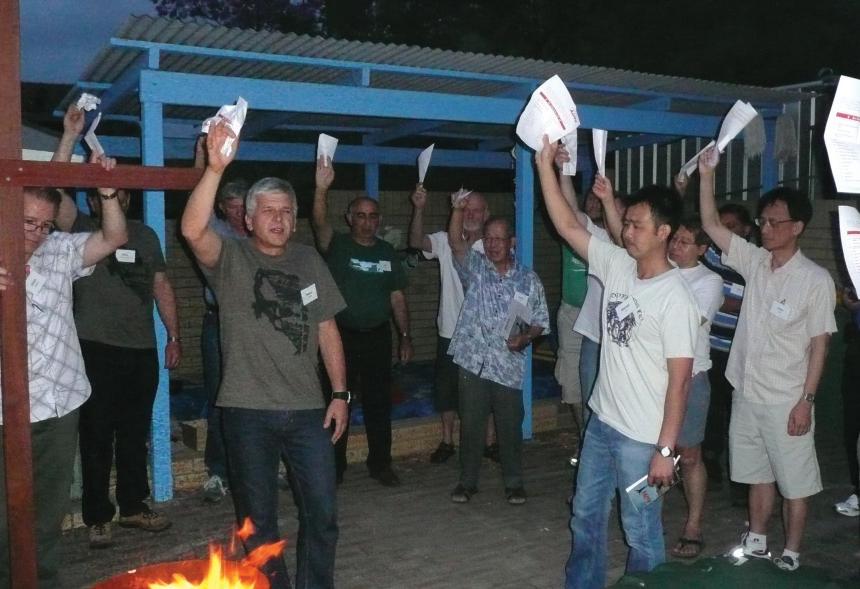
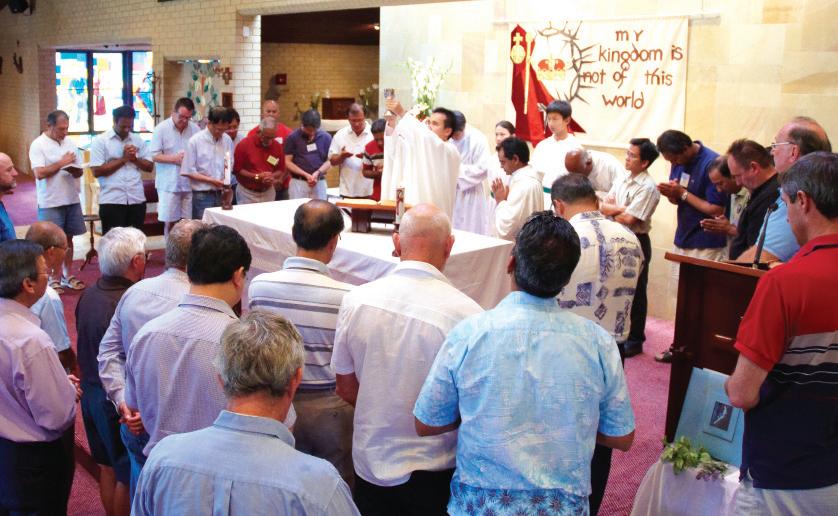
for personal prayer, the Sacrament of Reconciliation and concluded with the Eucharist.
At the closing Mass, Willetton Parish Priest Fr Thai Vu said it was a sight never seen before - witnessing the singing of the 50 enthusiastic men, seated in the first three pews of the church “lifting the roof off the church”.
Retreatants said the highlight of the weekend was the simple rituals that were dispersed through the two days which helped connect the faith experience into their daily lives, that day and into the future as well. Attendees were urged to keep up the fruits of this weekend by
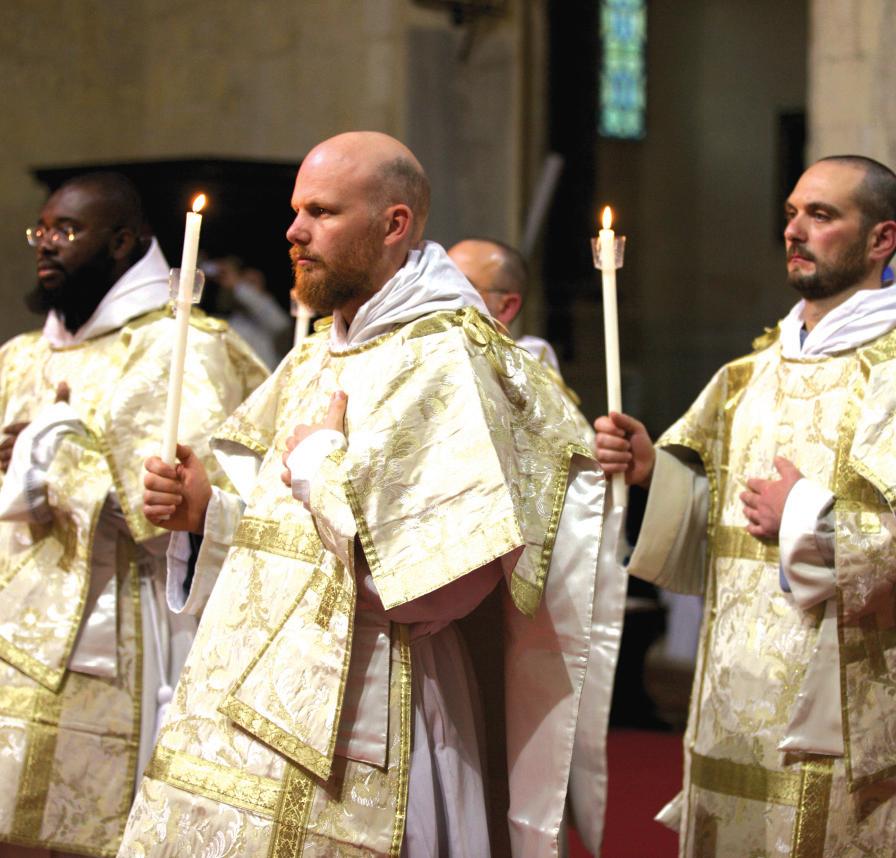
Servite goes to God
BY BRIDGET SPINKS
SERVITE priest Fr Frank (Francis Joseph) Christie died peacefully surrounded by three Irish relatives on 23 November at Hollywood Private Hospital after a battle with pancreatic cancer.
Fr Christie was diagnosed with the disease about a month before he died and was offered chemotherapy but refused on the basis that if it was not going to improve his health, he was ready to go, a friend of ten years, Servite Fr Peter Porteous said.
Fr Christie was born in Dublin, Ireland on 12 September 1927, studied for the priesthood and was ordained in Ireland in 1956.
He held appointments as a priest in Chicago; Kwazululand in South Africa; Denver, Colorado; Portland, Oregon and in California before coming to Australia to serve in the Perth Archdiocese.
His appointments in the Perth Archdiocese began in 1981 and included being parish priest at St Denis’ in Joondanna, work in the Wanneroo parish and service as chaplain at St John of God hospital, Royal Perth Hospital and Graylands Hospital.
Fr Porteous said he had a wonderful bedside manner, thrived on his work at St John of God and enjoyed working in Graylands with those suffering with mental health issues.
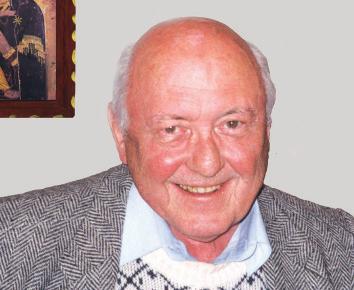
praying. He had a deep love for Our Blessed Mother, which was reflected in the way he accepted his death,” he said.
Servite Fra Christopher Ross administered the last sacraments three to four days before he died and is sure he would have received this sacrament from the Hospital Chaplain as well.
On the last day he was conscious, Fr Christie was talking, laughing and joking with those around him as he had his photo taken.
Fr Porteous was struck by how peaceful he was.
He didn’t appear disturbed at all and was very matter of fact about his death with an attitude of, “oh well, time to go home,” Fr Porteous said.
“There was no sadness to it,” he said.
After Fr Christie lost consciousness, Fr Ross prayed the “Prayers for the Dying” for his brother priest.
joining a small group, using their talents in a parish group and supporting their parish priests.
A retreatant reflected to The Record that “if the Lord asked Abraham for 50 righteous men to save Sodom and Gomorrah, imagine the results on this parish, the diocese, the country and the world at large, if more men had this transformational experience”. The menALIVE team said that they already have a full year booked for 2011 with a couple of spare weeks. Go to menalive.org.au and be ALIVE because “the glory of God is truly experienced when men are fully alive” (St Ireneaus).
“He loved working as a chaplain in that one to one ministry,” he said.
Fr Porteous, who was ordained for the Order of Friar Servants of Mary or Servites in January 2009 and who will be the new parish priest for St Denis’ Joondanna from December onwards, said that Fr Christie has left a beautiful legacy and that people came to visit him from his various occupations and the parish.
“He was very happy, easy to talk to and prayerful. My images are of him praying the Rosary at 11pm,” he said.
“He was always in the chapel
Although many people have the sacrament of the Anointing of the Sick, not many have these prayers said for them; they are for people who are actually dying.
The family could say these prayers, because although lengthy, there is no sacrament involved, he said.
Fr Christe’s sister-in-law, her sister and his niece were present day and night at his bedside for the last two weeks of his life.
They were there when he died but had to return to Ireland before the funeral.
The Funeral Mass was held at St Denis’ Joondanna at 2pm on 30 November and Fr Christie is now buried at Pinnaroo Valley Memorial Park Cemetery in Padbury.
Page 6 1 December 2010, The Record THE PARISH
Fra Giles Joseph Mary, formerly Kevin Atherton, at his Mass of ordination to the diaconate on 24 October in an old mediaeval Franciscan church in Italy. He says he wants to help win the world over to Christ.
It’s not about condoms but conversion
Pope Benedict XVI’s comments in a recently launched book-length interview may trigger many questions, but the faithful should seek the answers in the right place: Archbishop Hickey
POPE Benedict XVI has issued a call to conversion in his recently published comments on the use of condoms. He has not sought to alter the Church’s attitude to condoms as a preventive measure for HIV/AIDS, according to Archbishop Barry Hickey.
“The Church’s business is to call people to conversion, not to minimise the immorality of certain acts,” Archbishop Hickey said yesterday when commenting on the news flurry that followed certain comments by Pope Benedict XVI in his latest book.
“Only a change of behaviour to self-control, chastity, or fidelity to one married partner, will ensure that HIV is not transmitted,” he said.
“This is what the Church has to offer in the fight against AIDS.
“This is what the Pope has advo-

cated and it is what the promoters of condoms should also be doing. “Instead, they seem intent on doing everything possible to encourage sexual freedom and are very reluctant to promote the obvious human solution of selfcontrol.”
The Pope’s words in his book created confusion as the world erupted with a rush of questions: Has the Pope changed his mind on condoms and now approves them? Is he advocating condoms as a good way of preventing the transmission of HIV?
Is he encouraging homosexual prostitutes (or any prostitutes) to use a condom? Will he now
Bishops welcome asylum ruling
BY ANTHONY BARICH
AUSTRALIA’S Catholic bishops have welcomed an 11 November High Court ruling that guarantees all asylum seekers the same access to the country’s legal system whether they arrive by plane or boat.
The landmark ruling means that all asylum seekers including, for the first time, those who arrive in Australia’s excised migration zone, have the right to appeal the results of their refugee applications in Australian courts.
Sandhurst Bishop Joseph Grech, the Australian Catholic Bishops’ Conference delegate for migrants and refugees, said “all Australians will welcome the High Court’s judgement that the rule of law must be followed by decision makers employed by the Australian Government”.
“Most Australians would perhaps be surprised to learn that such a requirement has not been standard practice,” Maltese-born Bishop Grech said on the day of the ruling.
The number of people seeking asylum in Australia jumped by 30 per cent last year despite global numbers remaining steady, according to United Nations statistics released in March 2010.
According to the Australian High Court, the persons employed by the contracting company engaged by the Department of Immigration to assess reviews of asylum seekers’ claims for refugee status “did not treat the provisions of the Migration Act 1958 (Commonwealth) and the decisions of Australian courts as binding, and, further, failed to observe the requirements of procedural fairness”.
Bishop Grech said that it is “a matter of great concern that people
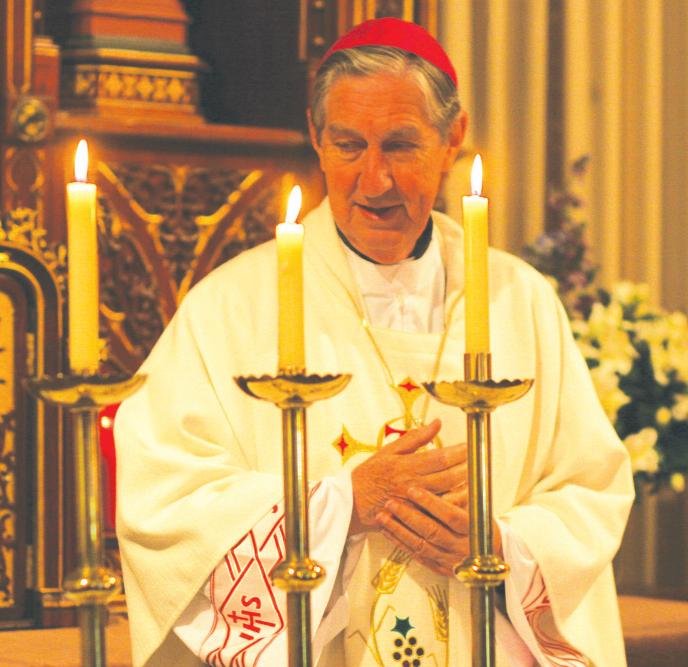
approve condoms as a legitimate contraceptive?
Archbishop Hickey said he had closely examined the words of the Holy Father and read what many other commentators had said.
“The Pope has said nothing to change the official policy on the use of condoms in the matter of HIV, and certainly nothing to
change the teaching of the Church on contraception. The Pope is a successor of St Peter, the Rock. He, too, is a rock in the leadership of the Church. There is not the slightest reason to doubt it.”
The Archbishop said that the Pope had referred to a hypothetical homosexual prostitute with AIDS who wore a condom out of concern
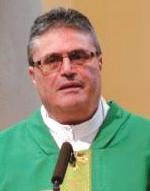
who are tasked with reviews that can be life or death matters are not required to consider the basic rules of Australian law”.
“Following this significant judgement, surely the time has come to address the situation and to consider seriously moving all asylumseeker processing onshore,” Bishop Grech said.
“The Bishops of Australia sincerely hope that this is the end of the so-called ‘Pacific solution’ in which those seeking asylum in Australia are moved to remote offshore locations in order to avoid their access to Australian laws”.
“Mere political expediency is no justification for detaining such people in remote areas. Following this important ruling of the High Court, on behalf of the Catholic Bishops of Australia, I call upon the Australian Government to take immediate steps so that asylum seekers currently held in detention would be afforded the protection and the justice enshrined in the Migration Act”, Bishop Grech said.
for the safety of the other person. He said this concern might lead to a further awakening of his moral sense, enough perhaps to cause him to turn his life around.
Elsewhere, the Holy Father had made his opposition to condoms as a prevention of disease very clear and had said that they might make the situation worse.
The reasons why condoms might make AIDS transmission worse are:
● They give a false sense of security to those engaged in sexual acts because condoms have a high failure rate.
● Continued use over even a short time will guarantee the transmission of HIV or any other sexually transmitted disease.
● Condoms do not encourage a change of behaviour, and only a change of behaviour in terms of self-control, chastity or fidelity to one married partner will ensure that HIV is not transmitted.
On his trip to Africa last year, the Pope said that only responsible human behaviour could overcome HIV/AIDS transmission, and that barriers like condoms only made matters worse because they did not require any change to a more moral lifestyle.
Health authorities whose only solution to HIV/AIDS is the condom should look again at its inadequacy as a policy and try to understand the Church’s opposition to it.
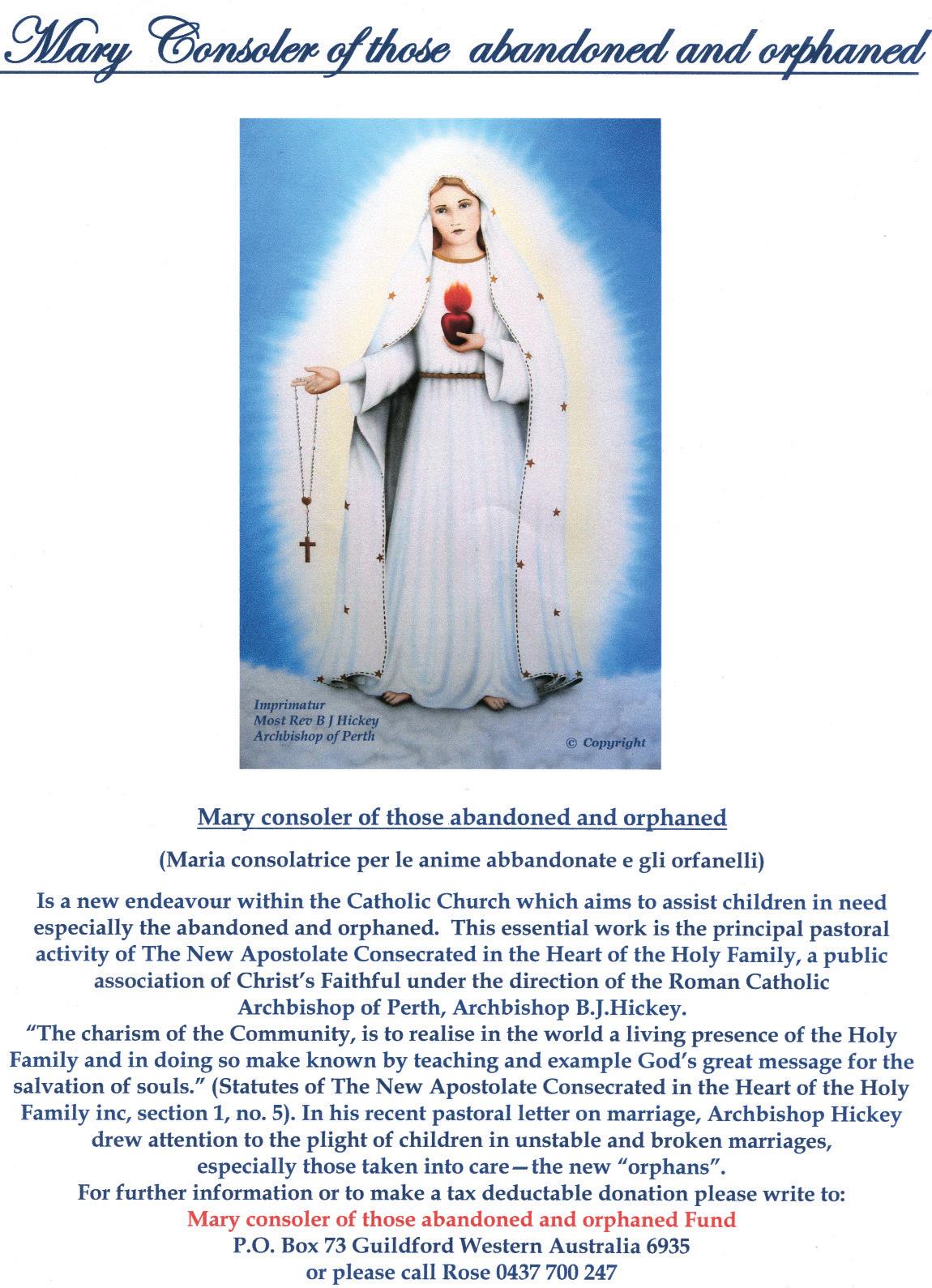
Page 7 THE PARISH 1 December 2010, The Record
Bishop Joseph Grech
Above: Archbishop Barry Hickey. Left: The book-length interview which, when reported by the secular media, has caused confusion among Catholics.
Mental health for the community (II)
Following our look last week at the community’s mental health problem arising from the inability of large sections of the community to understand the nature and meaning of marriage, it is time to examine our serious problems in understanding human sexuality.
There are moral truths associated with the exercise of human sexuality, but these are little understood in the public arena, and, worse still, there is often a deep resentment about the existence of a moral law.
These problems stem mainly from the mistaken idea that the moral law is something imposed on us from outside – by custom, by law, by the Church, or even by God Himself.
In reality, the moral law is the truth about human nature. It is who we are and how we work. It tells us what is true to our nature and that we will suffer negative consequences if we choose to act in ways that are untrue to our nature. A big part of our nature is that we are social beings, and therefore the moral law embraces our relationships with others and with society.
Considering how opinionated and misguided we humans can be, it is not surprising that there is debate about what is moral and what is not, but the present circumstance that so many people deny the existence of morality is disturbing.
Modern science confirms the existence of the moral law in human nature. The polygraph – also called the lie detector – measures changes in the human body whenever we prepare to tell a lie. It is called a polygraph because it can graph changes in many systems - the cardiovascular system, the neurological system, the strength of the muscles, the frequency of the brain, and many other aspects of our biochemistry. The tests reveal that whenever we are untruthful, we weaken ourselves. The moral law is the truth of our nature, and whenever we breach the moral law we weaken ourselves, sometimes a little, sometimes a lot, and with repetition always a lot.
This certainty that there is a moral truth running through all of us creates an obligation of good sense to think carefully about what we believe and what we say about moral matters.
The enthusiastic support shown by the secular media for condoms and their concomitant eagerness to attack the Pope and the Catholic Church on this rather tatty subject reveals no such rational thought, nor any dedication to truthful information.
In relation to HIV/AIDS, the consistent finding of population studies conducted by reputable social scientists is that the higher the levels of distribution and use of condoms, the higher, not lower, the levels of HIV infection. This information has been widely published around the world, and has been known in one form or another for at least ten years. This should not be surprising because condoms have no moral status in human relations, so why do the secular media keep pretending they are the solution to the problem?
And why do the media keep trying to pretend that the Church is somehow to blame for the AIDS epidemic? It is well known that the major causes of the spread of HIV and AIDS are promiscuity, prostitution, infidelity, and homosexuality activity.
The Catholic Church teaches unwaveringly against all of these, and explains its teaching with great clarity and clear links to the truth about human sexuality. Do journalists imagine that people sit around deciding that they can ignore the Church’s teaching on any or all of these matters, and then concluding for no reason at all that they cannot ignore the Church’s teaching on condoms? For that matter, do journalists imagine that all the people in Africa and Asia who have AIDS have actually heard of the Catholic Church, let alone her teaching?
Forgotten work
The Church’s teaching on human sexuality is just one part of its comprehensive strategy for saving lives in the third world
The Catholic Church is Africa’s primary care giver for AIDS victims
According to UN statistics, over 22 million people in Africa are infected with HIV. This comprises 67 per cent of the world’s population of HIV infected persons. The majority of these persons are in Sub-Saharan Africa. In 2002, Canadian Jesuit Fr Michael Czerny founded the African Jesuit AIDS Network based in Nairobi, Kenya, as a way to help Jesuits in Africa address the problem of HIV and AIDS.
Worldwide, the Catholic Church is the major caregiver for those who are HIV positive and those who are suffering from AIDS as well as also caring for those affected - especially widows, orphans and others who are carrying the burden, according to Fr Czerny.
“If you look at it medically, perhaps worldwide, the Church offers 25 per cent of AIDS services,” he said.
“My guess is that the average in Africa is closer to 40 per cent, maybe even 50 per cent. The further away you get from the big cities, the closer it gets to 100 per cent. Often, the only AIDS services in the remote areas are the Church clinics.
“Since HIV and AIDS is not only a sickness but also an enormous cultural, personal, family, social and spiritual problem, what the Church can do, and what I think we can be proud of as a Church, is that we address the whole person and not just the infection - not just the medical part. “So an HIV positive person can look to the Church for a wide range of care and support which can be summed up as being accepted as a person and encouraged to continue to live as fully as possible, as long as possible, and not to allow HIV/AIDS to be a death sentence.
“I think many Africans would say: ‘The Church was with us before AIDS. The Church is now generously with us during AIDS and the Church will be with us after AIDS’.
“In that sense, the Church is not seen so much as a service provider but as that reality which we call ‘Mother’: The mother who is there and has always been there and will be there as long as she is needed.
“The Church in Africa calls herself the family of God in Africa; that is the definition coming from the first Synod on Africa and so I would say that basically the Church deals with HIV and AIDS as a family. We try to make everyone feel that they are part of a family, whether they are in need of care or whether they are in a position to offer some kind of care.
“We base our work on a story from Matthew’s Gospel (8:3). There was a leper who dared to approach Jesus - which in itself was against the law - and he challenged Him, saying: ‘If you want to, you can heal me’ and Jesus did two things. He said: ‘I want to’ and He reached out and touched him and healed him. In this very short scene, we have many dimensions of AIDS care, of true pastoral ministry.
“The first: ‘Of course I want to’, is this readiness to help. Someone who is in deep trouble and very upset, and perhaps very cruelly rejected by everyone on whom he has ever counted, can turn to the Church and know that there will be a positive response. There will be no judgement. There will be no calculation and the answer is, ‘of course we want to’. Secondly, we reach out and touch. I think it’s the most fundamental gesture in response to AIDS.
“A person who has, especially in recent times, heard they have an HIV positive diagnosis, feels as good as dead - they feel inhuman and unfortunately society, culture and sometimes even family, will treat that person as dead. When we reach out and touch that person, that’s when they will say: ‘When I first found out that I was HIV
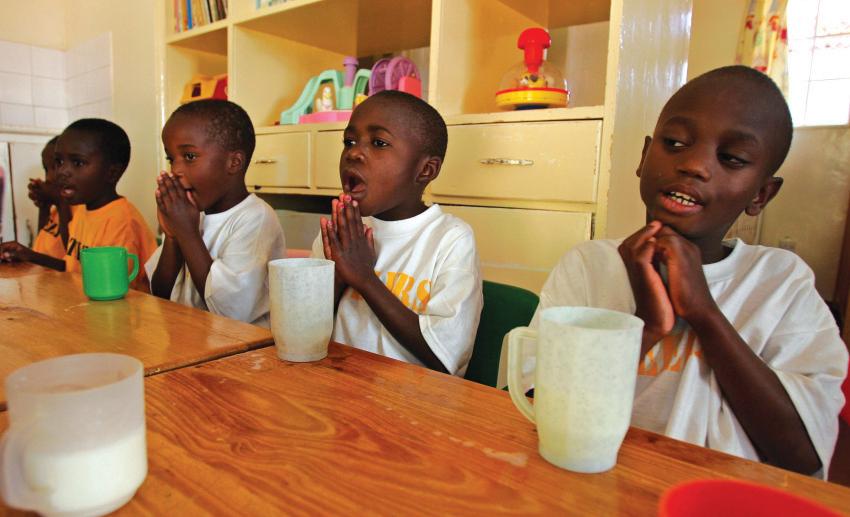
Above: Children pray before having a glass of milk at Nyumbani home for HIV-positive children in Nairobi, Kenya in 2004, when up to 1.9 million children under 15 were living with HIV/AIDS in sub-Saharan Africa, according to UNICEF. PHOTOS: CNS
Right: Medical lab technicians watch for a result on a small HIV test strip in the laboratory of Our Lady of Apostles Hospital in Akwanga, Nigeria in September. The hospital, run by the Diocese of Lafia with assistance from Catholic Relief Services, offers treatment for HIV and AIDS and provides basic health services to the rural community of agrarian farmers.
positive I was dead and now I feel alive’. And some people will even go further and say: ‘Before I became positive I was wasting my life. I was throwing my life away by my misbehaviour. Now, unfortunately, I’m HIV positive, but now I’m really living and I’m living my life responsibly for my family and for others’.
“Statistics bear out the fact that the wide distribution of condoms as a prevention strategy does not succeed. It does not bring down the rate, and this is what the Holy Father said. He didn’t deny that a condom might be useful sometimes. What he denied was that the promotion of condoms, as a primary prevention strategy, does not succeed. It does not achieve its objective. It does not bring down the average rate of HIV in the population. But people became very agitated because they didn’t listen carefully to what he said and because they were not well informed and because there was a lot of ideology, emotion and interest behind this whole issue, and so there was a lot of controversy.”
Dr Edward Green, then Director of the Harvard AIDS Prevention Research Project, said: “As a scientist, I was amazed to see the closeness between what the Pope said in Cameroon and the results of the most recent scientific discoveries. The condom does not prevent AIDS; only responsible sexual behaviour can address the pandemic. There is a gap between what is now considered normal or acceptable in globalised culture: the culture of media, of advertising, of marketing. Those values are in sharp tension with traditional Catholic values and with traditional African values.
“Perhaps we could sum up the cultural value of globalised culture regarding sexuality, as the reliance - and I would say the promotion - of the idea of mutual consent. That is to say that the norm for sexual behaviour is the consent of the two participants and as long as the two participants are beyond the minimum age and freely consent, then there is no other norm to be applied.
“The idea that we have in the Church and the idea that we have in Africa is that there are other norms and those norms don’t depend only on you and me: they depend on our family, they depend on our community, they depend on our parish, they depend on our nation, maybe even on our tribe.
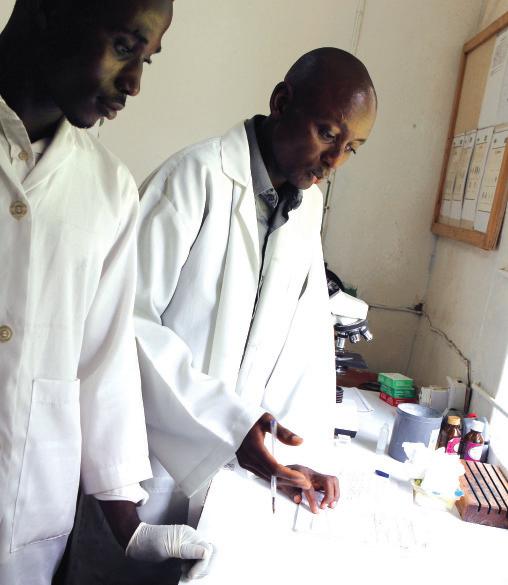
“That idea is in opposition because in Africa, and in traditional Catholic morality, it’s not just what you and I agree on that makes it right; there are other norms and those norms in fact are meant to orient what you and I will do, or not do, at certain moments in our lives with certain persons.
“There, the difference is very sharp. It wasn’t talked about in connection with the controversy, but I’m quite sure that is the real issue; that the Pope represents a set of norms about sexuality that we don’t want to accept because they are more demanding. They are also more life giving and produce more happiness. But in the short run they seem to be more demanding than simply two of us agreeing on what we want to do.
“This is the road to greater happiness, the greater good. We say this not because we thought of it yesterday, but because this has been our experience and this has been the experience of every serious culture; that sexuality is a great gift, a wonderful thing which, in order to be appreciated and used properly, requires discipline, the recognition that everything is not always possible.
“This is a long-standing human wisdom but it goes against the principles of entertainment and marketing and so we’re having a conflict.
“The massive promotion of condoms is a destruction. It’s not meeting the problem and it’s not helping, but unfortunately it is not the only example of wrong-headed approaches imposed on Africa.
“Africa has survived other mistaken policies and it will survive this one also. But my hope is that with the kind of teaching the Holy Father has given, we will make progress and progress consists, secondarily, in improved statistics. The real success is when young people are able to live their sexuality more responsibly. When married couples live their sexuality more responsibly, and where the family of God faces AIDS as a family - that is a sign of God at work in Africa.”
Iinterview by Mark Riedemann for Where God Weeps, a weekly television and radio show produced by Catholic Radio and Television Network in conjunction with the international Catholic charity Aid to the Church in Need.
Page 8 1 December 2010, The Record EDITORIAL/FEATURE The Record editorial
A PILGRIM’S PROGRESS
Camino Salvado Journal
Dr Duncan Jefferson, who trod the Camino Salvado trail with other pilgrims in August and September, concludes his pilgrim’s diary for The Record
DAY 5
3 September: 29.5km
This was to be a “big day at the office”.
After another crisp morning, the regulation morning prayers and reflection, we sang our Camino anthem and set out to conquer the Great Northern Highway north of Bindoon. Our spirits were lifted by a brief visit to St Anne’s Catholic Church in Bindoon where the Blessed Sacrament was exposed: an unexpected blessing in this gem of a building (and certainly well worth a visit). But the road beckoned.
We made good time in the cooler air walking crocodile fashion in our fluorescent vests, waving happily at the passing road trains.
Traffic sped down and we moved slowly up the Bindoon hill: but please believe me that going fast doesn’t necessarily improve the journey: we travelled slowly and engaged with our environment, soaking up the countryside and even getting some pleasure from the tail winds from passing trucks that cooled our hot faces.
By this stage our needs had become quite simple: did I have enough water for this section of the trip? Should I save my mandarin until the next stop or eat it now? Was that “hot spot” on my foot the first signs of a painful blister? Pilgrimage makes one see life through a simpler lens and helps to “de-clutter” one’s life.
Bindoon hill is always a test, but we were heading to the Catholic Agricultural College at the top of the hill and that is a hidden historical treasure: it is also a real sign of all that is good about how our State is evolving. Students from all around the State come to school and board there: pupils from all creeds and classes mix, work and pray together, all in the milieu of a vibrant, brilliantly run, working farm. We were met with love and affection: fed once again with home made cakes and the rejuvenating “cuppa”; then shown the cattle that the students had been preparing for the up-coming farm show. I’m not a man of the land, but these cattle were beautifully presented.
Kevin, the farm manager, had shown us previously which trail to follow through the property, and we probably went through it at the best possible time.
The fields were awash in yellow canola and younger, green cereal crops: it made a magic canvas with the blue sky above and the rolling hills surrounding us. We walked as far as their boundary and then into the neighbouring property belonging to Mr and Mrs Kelly who had kindly given us permission to use their firebreaks as a trail: such is the kindness of our rural community and the generosity of their spirit. Thanks to these good people, we were able to get off the highway for at least 10km: and believe me that is a blessing!
However, the grind of the high-
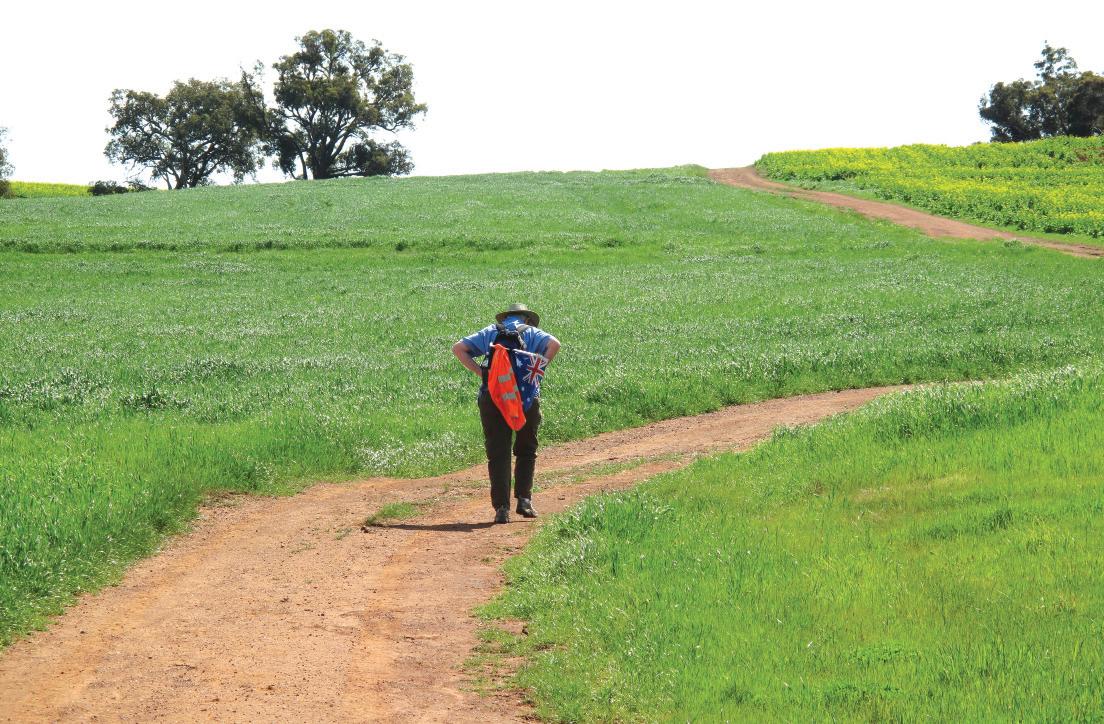
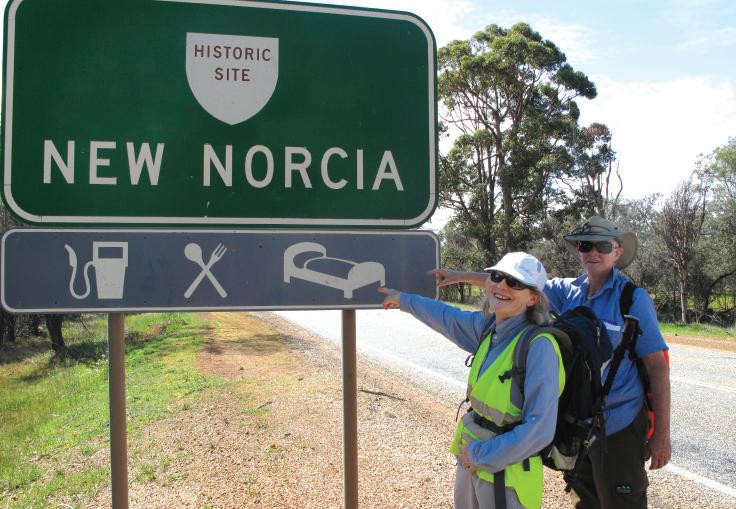
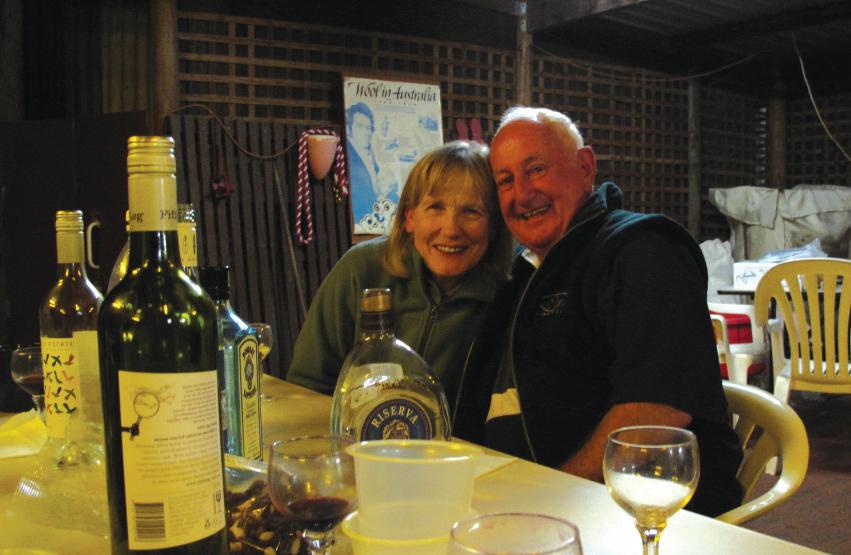
way was still there, and we ground it out until, with whoops of delight, we finally arrived at the bus and the smiling face of Paul.
That evening saw some very special sharing with love as the dominant theme: because without love everything is “dust”: but with love, everything becomes glorious.
DAY 6 4 September: 25km
“Fiat – it is done” – and what a finale.
Firstly, thanks to a fine piece of detective work by Paul, who tactfully suggested an alternative path to more highway walking: a path that would take us 4km inland to a quieter road known as “Old Plains Road”.
In fact, it was fantastically quiet: whereas on the highway we would have encountered road trains, trucks and traffic, on the Old Plains Rd we met one car in three
hours. The road is not sealed, but its gravelled surface rolls through some spectacular countryside until it rejoins the highway 5km from New Norcia.
We made excellent time and everyone was in high spirits, even the “walking wounded” who had rejoined us for the final section. Then we saw the sign we’d been waiting for: “New Norcia 2km”: we were almost there at the end of the Trail – but it wouldn’t be the end of the Camino.
We were greeted so warmly by the chair of the New Norcia Parish Council, Joanne, who led us in procession to the church. As we neared the church, the bells rang out in welcome and tears of joy welled in my eyes: our dreams had taken on flesh and become a reality. We left our back-packs outside and went inside to where the tomb of Dom Salvado is.
Abbott Fr John Herbert OSB welcomed us with genuine Benedictine
The (original) Way of St James
The Way of St James
(Spanish: El Camino de Santiago) is one of the most important Christian pilgrimages, with Santiago de Compostela, Spain, as the final destination.
The pilgrimage goes to the Cathedral of Santiago de Compostela in Galicia in northwestern Spain, where tradition has it that the remains of the apostle St James are buried. Legend has it that St James’ body was taken to Galicia by boat from Jerusalem and carried inland to where Santiago de Compostela is now located. The pilgrimage is believed by some to be one of three pilgrimages for which the sins of the pilgrim will be forgiven. There are several routes that can be taken, the most popular being the Camino Frances, which begins in Saint-JeanPied-de-Port in France.

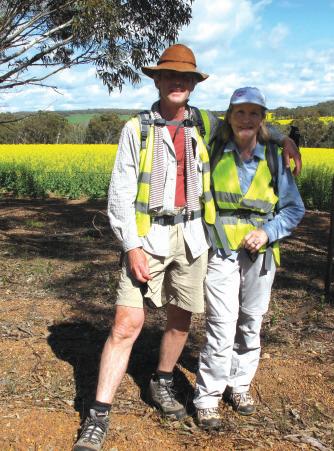
love and hospitality and then led us in precious prayer and thanksgiving for the success of our Pilgrimage. He then watched as we laid the tokens that we had carried with us on our journey –symbols of the burdens and wounds, hopes, dreams and aspirations of each one of us – on the tomb of Dom Salvado.
There were many tears as we shared and reflected on the journey we had just completed: and exultation was tinged with sadness because it was now all over. But there is no doubt that everyone there, the pilgrims, their families who had travelled to meet them and the loving community that had greeted us, were moved and deeply affected by the experience.
So what did we achieve? I think it’s probably best summed up by Peter who said: “I came on the walk thinking that it would be a good thing to do; but I ended up doing the Camino Salvado”.
The walk from the French border to Santiago de Compostela on the main routes of the Camino Frances beginning at Roncesvalles or Jaca takes about a month. Speed hikers can make it in as little as two weeks (about the time bicyclists usually require), but that requires walking 40km or more each day. While most of the route is fairly gentle with only a few long ascents, some days can be challenging. Over the past 20 years a great deal of effort has gone into improving the walkers’ route, and most of the route is now well marked, reasonably well surfaced, and separated from the increasingly heavy traffic on Spanish highways. If one begins in France, the route passes over two major mountain chains and several smaller ones.
One needs to be in reasonably good condition and to have good hiking boots. If you wish to camp, you need to carry clothing and a sleeping bag in a comfortable backpack. But you can stay in hostels (called albergues or refugios) for low cost. Unless one plans to camp in the most crowded months of the summer season, it is unnecessary to carry camping and cooking gear. One can start in France and follow one of the routes of Santiago de Compostela in France to Spain.
To earn the compostela (certificate of accomplishment), one needs to walk a minimum of 100km or cycle at least 200km. For walkers, that means in practical terms starting in the small city of Sarria, for it has transportation connections by bus and rail to other places in Spain.
While many pilgrims only do that final portion of the route, there are great rewards for starting much further away. Due to time constraints, many non-Europeans begin at St Jean Pied-de-Port in France or Roncesvalles in Spain. Beginning in the French city means the first day of walking requires a long and steep climb, perhaps the most arduous single day on the route. Roncesvalles, steeped in history and the site of the defeat and death of Charlemagne’s lieutenant Roland, is a usual starting point for Spaniards.
- Wikitravel
Page 9 1 December 2010, The Record VISTA
While the world obsesses over whether the Pope said condoms are allowed or not, Catholics aro
IN THE TRENC
Book reveals Pope’s inner self
BY JOHN T HAVIS ANALYSIS Catholic News Service
VATICAN CITY - In the middle of Pope Benedict XVI’s new book is a story about a hat, and it sheds light on the trials and tribulations of the modern papacy.
The book’s interviewer, German journalist Peter Seewald, recalled a public appearance one winter day when the Pope donned the camauro, a red velvet cap trimmed with ermine that was last worn by Pope John XXIII. Seewald suggested this was one of those subtle signals that marked a return to the old ways of the Church.
In reading the Pope’s answer, one can almost hear him sighing.
“I wore it only once. I was just cold, and I happen to have a sensitive head. And I said, since the camauro is there, let’s put it on. But I was really just trying to fight off the cold,” he said.
The Pope’s appearance in the cap caused a minor uproar in the media which saw it as a kind of pre-Vatican II fashion statement. In the book, the Pope said he hasn’t put it on since that day, “in order to forestall over-interpretation.”
Light of the World: The Pope, the Church and the Signs of the Times is that kind of book: It deflates myths, explains papal decisions and offers unexpected insights, leaving the German Pontiff in much clearer focus.
Perhaps most surprising is that Pope Benedict, an academic theologian whose speeches can challenge even erudite listeners, comes across in these pages as a very human and accessible figure, one who communicates simply and directly.
“The image that emerges is not that of a man isolated in the Vatican, but a Pope who knows what is going on in the world and is willing to talk about everything, with a clear idea of what can contribute to the spiritual and social well-being of humanity,” said Passionist Fr Ciro Benedettini, vice-director of the Vatican press office.
The Pope himself seemed to realise that this was an opportunity to set the record straight on some things he keeps reading about in the media. Newspapers sometimes portray the German Pontiff as a remote figure who has cut back on meetings and contact with outsiders, but the Pope said that’s inaccurate.
“There are, I believe, few people who have as many meetings as I do,” he said. He said he sees a continual stream of Bishops, world leaders, old friends and close advisers, and relaxes in the evening with his staff to watch DVDs.
“All in all, therefore, I cannot say that I live in an artificial world of courtly personages; on the contrary, through these many meetings I experience very directly and personally the normal, everyday world of this time,” he said.
To those who see him as trying to roll back the Second Vatican Council in small steps, including liturgical modifications, the Pope again cautioned against overinterpretation. For example, he spoke about introducing the practice of having people receive Communion from the Pope on the tongue while kneeling.
“I am not opposed in principle to Communion in the hand; I have both administered and received Communion in this way myself,” he said. He adopted the current practice, he said, to “send a signal and to underscore the real presence with an exclamation point.”
He said he felt this was necessary precisely at papal Masses, which have widely divergent congregations of people, and where people might think everyone is automatically supposed to receive Communion.
“I have heard of people who, after receiving Communion, stick the host in their wallet to take home as a kind of souvenir,” he said.
To those wondering, “What are you trying to do as Pope?” - seemingly a huge question - the book offers important insights. The Pope identified a priority task as rekindling an awareness of God in personal lives and in society. He described this project not in terms of restoring

Church influence, but in responding to global problems that could otherwise add up to catastrophe - economic, environmental, biological and moral catastrophe. In this sense, he said, the Church’s role is to promote a new attitude of moral awareness and a spirit of self-sacrifice.
“Man is clearly in danger; he is endangering both himself and the world .... Man can be saved only when moral energies gather strength in his heart; energies that can come only from the encounter with God,” he said.
Pope Benedict was particularly insistent on the problem of the huge public debt run up by various countries around the world. “We are living at the expense of future generations,” he said, and “huge debts are treated as something that we are simply entitled to.” He called for a global examination of conscience on such economic issues.
In short, the book reveals the Pope as more attuned to the practical issues of the day than many might have imagined. He also comes across as down-to-earth regarding matters of faith.
“I am no mystic,” the Pope said bluntly when his interviewer tries to suggest a mystical vein in his papal role.
Likewise, the Pope wouldn’t be goaded into a discussion of “end times” and fanciful readings of the Book of Revelation, saying he is “sceptical” about such interpretations. He does believe in a real last judgement, but said Scripture cannot be used to calculate when the world will end.
On some topics, the Pope was downright terse, refusing to be led down the journalistic path. The shortest exchange in the book is this one:
“Are you afraid of an assassination attempt?”
“No.”
Overall, the Pope seems to balance between a positive and negative view of the modern world. He said he is disappointed at the lack of interest in the faith and that “the overall trend of our time continues to go against the Church.”
More than once, he referred to “enemies” that lie in wait, ready to strike the Church at the first opportunity. “In Catholic Germany, there is a rather large group of people who, so to say, are on the lookout for an opportunity to attack the Pope; that is a fact,” he said.
He finds hope in a somewhat surprising place: not in traditional Catholic structures and bureaucracy, which he described as “spent and tired,” but in new initiatives, especially those involving young people. While Christianity no longer holds the “command post” in world opinion, it has the right spirit, he said, and added:
“I am quite optimistic that Christianity is on the verge of a new dynamic.”
US-funded AIDS programmes being handed over to Africans to administer
CATHOLIC NEWS SERVICE
CAPE TOWN, South AfricaUS-funded programmes to fight AIDS and HIV are being handed over to Africans to administer, and at least one nun hopes treatment efforts will not be harmed.
As administrators of the President’s Emergency Plan for AIDS Relief, known as PEPFAR, in South Africa are celebrating a successful transfer of administration in 2009, concerns are being raised in Nigeria that the handover planned for March could pose serious problems for patients and other programme participants.
The two countries are getting much of the attention because more than a third of the estimated 22 million HIV or AIDS cases in sub-Saharan Africa are in South Africa and Nigeria. UNAIDS, the Joint United Nations Programme on HIV/AIDS, estimated that in 2009, about 5.6 million South Africans and 2.6 million Nigerians had HIV or AIDS.
Our Lady of Fatima Sister Mary Bulus, health services coordinator in Nigeria’s Lafia Diocese, expressed concern that the organisations named by CRS to take over the programme currently “don’t have the capacity to take on this enormous task.”
Among the organisations named by CRS to run the programmes is the Catholic Secretariat of Nigeria, the administrative office of Catholic Bishops’ Conference of Nigeria.
“I have worked with them (the secretariat) and know their weaknesses,” Sr Mary told CNS in a telephone interview from Akwanga. She said it is likely that “a priest who is not a doctor or a manager” will be put in charge.
“Project management is very different from pastoral care,” she said, adding that she would like to “see serious recruitment of professionals for this work.”
Funded since 2004 under PEPFAR, many of the programmes throughout Africa have been administered by CRS and have encompassed treatment for people with HIV and AIDS as well as support programmes for family members and children orphaned by the disease.
PEPFAR funds support numerous services such as providing free antiretroviral medicines for eligible patients, support for families devastated by AIDS, after-school programmes for children whose parents died from the disease and their caregivers, transportation for health services and counselling. CRS administration of AIDS-related programmes across Africa has been held up as a model because of its focus on meeting local needs. However, PEPFAR guidelines require that all funded programmes be run by local organisations by 2012.
“CRS’s intention has always been to hand over” to local ownership, Karen Moul, communications officer for CRS, said in a 10 November telephone interview from Baltimore. “(This is) not a dumping and getting out.
“We have known for a long time that this has to happen by 2012 and we have been gradually working toward it,” she said.
Under the transfer arrangements, CRS remains available to offer local organisations assistance and advice.
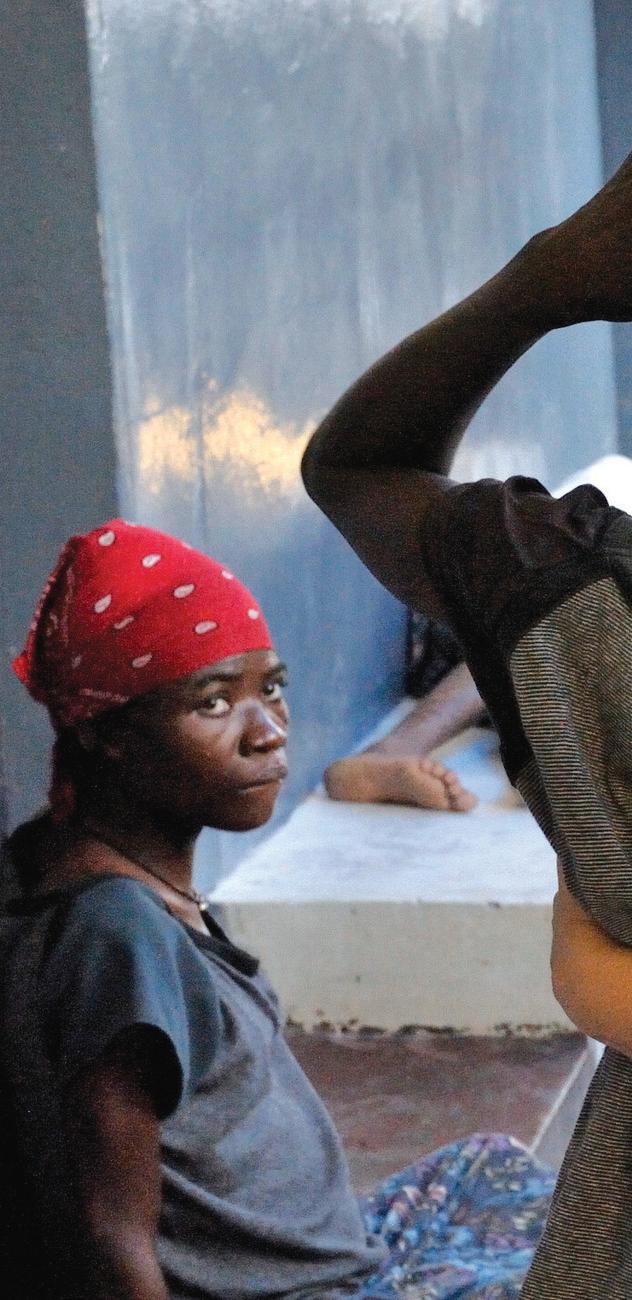
The PEPFAR funds on which th programmes rely are unlikely to exp “anytime soon,” Moul said, noting t in 2008 the US Congress reauthori the programme with up to $48 bill in funds through 2013.
Despite the assurances from CRS Mary said she is concerned that H programmes will run short of v antiretroviral medicines.
“There needs to be a proper ha over to competent people who w handle the programmes in the way C does now, so that the high-quality c can be maintained,” she said.
Catholic News Service attempts reach representatives of the Niger Bishops’ conference for comment w unsuccessful. Across the continent South Africa, where the transfer PEPFAR-funded programmes to lo partners took place in 2009, the ha over went smoothly, said Domini Sr Alison Munro, director of the AI office of the Southern African Cath Bishops’ Conference.
She told CNS by phone in m November that recipients of Church’s HIV services “wouldn’t h noticed there’s been any change ownership.”
In South Africa, the Bishops’ c ference and St Mary’s Hospital n receive the US grants directly.
The Southern African Catho Bishops’ Conference runs 33 aft school programmes for orphans South Africa. The programmes prov for the general care of the youngst including meals, school fees and tra portation to a doctor for treatmen illnesses. Sr Alison said most of children live with a surviving, thou often HIV-positive, parent, foster p ents or relatives or in child-head homes.
“Orphanages are unsustaina financially, and we think it’s health for children to live in normal circu stances in their communities as far possible,” she said.
The conference also operates primary AIDS treatment sites arou the country, with outreach centres remote areas, many of which are local parishes.
In Nigeria’s Lafia Diocese, a p gramme providing free antiretrov medications, counselling and hom based care is complemented by s port for 1,500 orphans in the dioc Sr Mary said. Fifteen of the 25 H
At the “House for the Dying,” a hospice Haiti, Sister Paula, a Spanish nun, sup
Page 10 1 December 2010, The Record VISTA
CHES
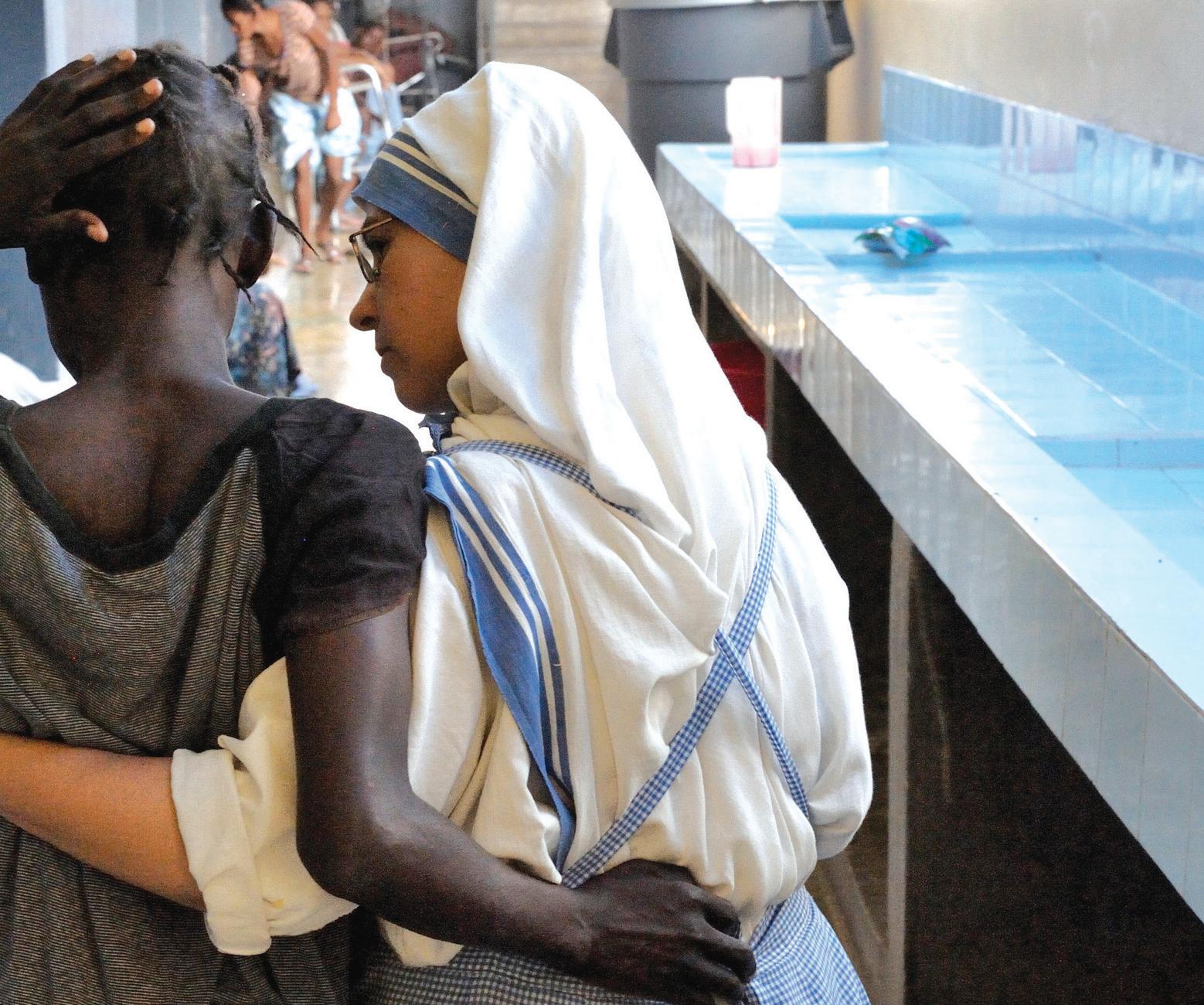
hese pire that ised lion S, Sr HIV vital ndwill CRS care s to rian were t in r of ocal ndcan IDS olic midthe have in onnow olic terin vide ters, ansnt of the ugh parded able hiest umr as 14 und s in e at proviral meupese, HIV
support groups that meet monthly are for orphans, she said.
“We teach orphans and other vulnerable children skills to enable them to take care of themselves and their siblings,” she said. “Without this programme these children would not be in school.”
● Pope Benedict XVI’s statement on condoms - that in some circumstances using a condom to prevent the spread of HIV-AIDS could be a step toward moral responsibility - is not likely to have a huge impact on Catholic programmes for the prevention and treatment of AIDS, two experts said.
Mgr Robert Vitillo, special representative on HIV-AIDS for Caritas Internationalis, said the Pope’s statement is likely to have a greater impact in pastoral counselling than on the hundreds of prevention and treatment programmes offered by the Catholic Church and Catholic agencies throughout the world.
In the book, Light of the World: The Pope, the Church and the Signs of the Times , which the Vatican newspaper excerpted on 20 November, Pope Benedict repeated what he said during a trip to Africa last year, that “we cannot solve the problem (of AIDS) by distributing condoms.”
Focusing exclusively on condoms damages human sexuality, making it “banal” and turning it into a kind of “drug,” the Pope said in the book. But he went on to say that in particular cases - he mentioned prostitutes - condom use may be justified as a first step toward taking moral responsibility for one’s actions.
Mgr Vitillo said the Pope’s remarks do not lessen the Church’s insistence that both the morally correct use of one’s sexuality and the safest sexual practice from a health standpoint is “abstinence outside of marriage and faithfulness inside marriage.”
Catholic programmes providing HIV care, support and treatment emphasise the safest route, he said.
The Pope’s statement, he said, “acknowledges that not everyone follows Church teaching” in that regard, but nevertheless the Church does not abandon them; rather, it recognises that when someone is living in a way that the Church does not consider moral, the use of a condom to protect a partner from infection may be the first step in their learning to take responsibility.
Mgr Vitillo said the Bishops’ conferences of Chad and of Southern Africa have issued pastoral letters saying Church workers must accompany married couples where one or both spouses are HIV-positive, helping them make a conscientious decision regarding the use of condoms to prevent disease while also understanding Church teaching that every sexual act should be open to new life.
In the new book, Pope Benedict did not address the issue of condom use by married couples to reduce the risk of disease.
Lesley-Anne Knight, secretary-general of Caritas Internationalis, said, “The Pope’s reported comments in this book illustrate the importance of compassion and sensitivity in dealing with the complexities of HIV-AIDS prevention. Caritas delivers its HIVAIDS programmes in line with Church teaching and we will consider, in close consultation with the Holy See, whether there are implications for our work in these reported comments of Pope Benedict.”
Caritas Internationalis is the Vatican-based umbrella organisation of 165 national Catholic charities.
Dr Leonardo Palombi, who works with the Sant’Egidio Community’s DREAM programme of AIDS prevention and treatment in Africa, told CNS on 22 November that Africa has been virtually flooded with condoms, yet the disease continues to spread because of a lack of responsibility on the part of men, a lack of respect for women and the lack of antiretroviral treatment for all who need it.
“Condoms aren’t the response to everything,” Palombi said.
In fact, antiretrovirals are even more effective in preventing spread of the disease because “they reduce the viral load in the body and in all body fluids” - reducing the risk of mother-tochild transmission at birth or through breastfeeding and reducing the risk of transmission sexually as well.
“Condoms are given out in great quantities in Africa,” he said. “But a thousand boxes of condoms won’t help if a woman has no power to insist her partner use them.”
“Universal access to therapy is the best way to stop the spread of AIDS” and that is what the Catholic Church has been trying to provide for years, Dr Palombi said.
Benedict’s new book: Open, disarming and inevitably misunderstood
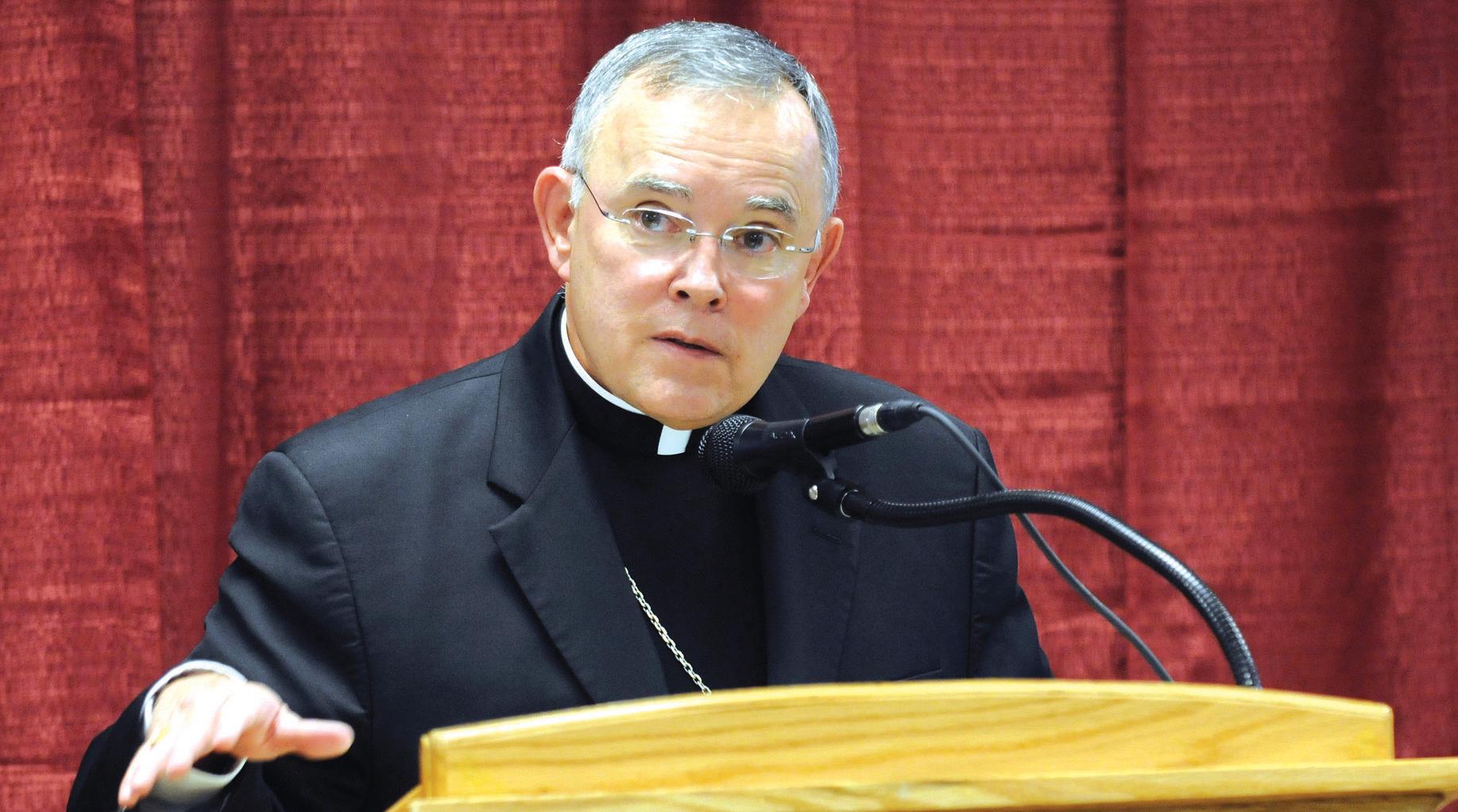
Denver Archbishop Charles J Chaput on the new booklength interview with Pope Benedict XVI
In his foreword to this remarkable book structured as a conversation between Benedict XVI and journalist Peter Seewald, George Weigel praises the German Pope for his “frankness, clarity and compassion.” This is very true.
It’s also an understatement. No serving Bishop of Rome has ever spoken so openly and disarmingly as Benedict XVI does in Light of the World: The Pope, the Church and the Signs of the Times. Benedict (as then-Cardinal Joseph Ratzinger) and Seewald have worked together in the past. While Seewald asks blunt questions, the Pope’s trust in him is clearly high. The resulting exchange between the two men is bracing and memorable, an absolutely mandatory read for anyone who wants a sense of the Petrine ministry and its burdens from the inside.
And yet, one comes away from this text with a mix of exhilaration and sympathy. The exhilaration springs from meeting in Benedict an extraordinary Christian intellect, articulate and unfiltered; a man prudent, generous, and penetrating in his judgement, candid in his selfcriticism, brilliant but accessible in his thinking, and unshakeable in his faith. The sympathy flows from knowing that, in the current media climate, almost anything Benedict says may be hijacked to serve other agendas. And exactly this happened even before the book’s formal release but more on that in a moment.
Seewald covers a lot of terrain with his questions, from China to liturgy to Fatima to the theology of the End Times. Each reader will gravitate to the themes that most interest him or her. But a few are worth special attention.
First, Seewald deals early and extensively with the Church’s sexual abuse scandal. Benedict’s answers are patient, tranquil, humble, and honest. This Pope is not a leader who downplays the damage done to innocent children and families, or evades responsibility, or makes excuses for evil actions. He is well aware of the scope of sexual abuse in other Religious communities and public institutions, but he does not use that as an alibi for the sins of Catholic clergy. Nor does he ever stray from the priority of healing for victims.
Second, for a man once thuggishly caricatured as Rome’s doctrine police, Benedict speaks with convincing sensitivity about the sanctity of human freedom and conscience, and the dignity of other religious believers. Like his predecessor, John Paul II, Benedict has a profound respect for Judaism as the root of Christianity and the Jewish people as our “fathers in faith.”
His discussion of the challenges inherent in dialogue with modern Protestantism, which takes so many different forms, is masterly for its fraternal charity and candour. And while some
readers may find his assessment of Islam too optimistic and irenic - time will tell whether secularism or Islam poses the greater challenge to today’s Christian believers - Benedict wisely notes that:
Islam is lived in very different ways, depending on its various historical traditions. . . . The important thing [is] to remain in close contact with all the currents within Islam that are open to, and capable of, dialogue so as to give a change of mentality a chance to happen even where Islamism still couples a claim to truth with violence.”
Finally, and maybe most powerfully, Benedict offers a withering critique of modern notions of “progress” and the practical atheism that infects nearly every developed society, beginning with Europe. For the Pope, the real battle lines in the modern world do not divide Christianity from other religious traditions. Rather, “In [today’s] world, radical secularism stands on one side, and the question of God, in its various forms, stands on the other.” When secular society seeks to reduce progress to material development, to exile God from public life and to ignore humanity’s profoundly religious needs, then it starves the human spirit and attacks real human progress, which always has a moral dimension.
Ironically, the message of this good and brilliant Pope has been hobbled nearly as much by the baffling failures of some of his own aides as by unfriendly coverage from the world’s media.
One of the sensitive issues that Benedict treats in this book is the question of AIDS in Africa and the use of condoms to prevent the spread of infection. No institution in Africa has done more to combat AIDS and support its victims than the Catholic Church. But intense controversy has always surrounded the Catholic rejection of condom use in AIDS prevention.
The Church holds that condom use is morally flawed by its nature, and that, equally important, condom use does not prevent AIDS and can actually enable its spread by creating a false sense of security. In the context of the book’s later discussion of contraception and Catholic teaching on sexuality, the Pope’s comments are morally insightful.
But taken out of context, they can easily be inferred as approving condoms under certain circumstances. One might reasonably expect the Holy Father’s assistants to have an advance communications plan in place, and to involve Bishops and Catholic media in a timely way to explain and defend the Holy Father’s remarks. Instead, the Vatican’s own semi-official newspaper l’Osservatore Romano violated the book’s publication embargo and released excerpts of the content early.
Not surprisingly, news media instantly zeroed in on the issue of condoms, and the rest of this marvellous book already seems like an afterthought. Don’t let that happen. Don’t let confusion in the secular press deter you from buying, reading for yourself, and then sharing this extraordinary text. It’s an astonishing portrait of an astonishing man.
First published in First Things on 21 November
und
the globe are helping AIDS sufferers...
e for AIDS patients and other seriously ill patients run by the Sisters of Charity in Port-au-Prince, ports a patient in 2009 as she walks.
PHOTO: CNS/PAUL JEFFREY
Page 11 1 December 2010, The Record VISTA


















The Record Bookshop’s December Catalogue





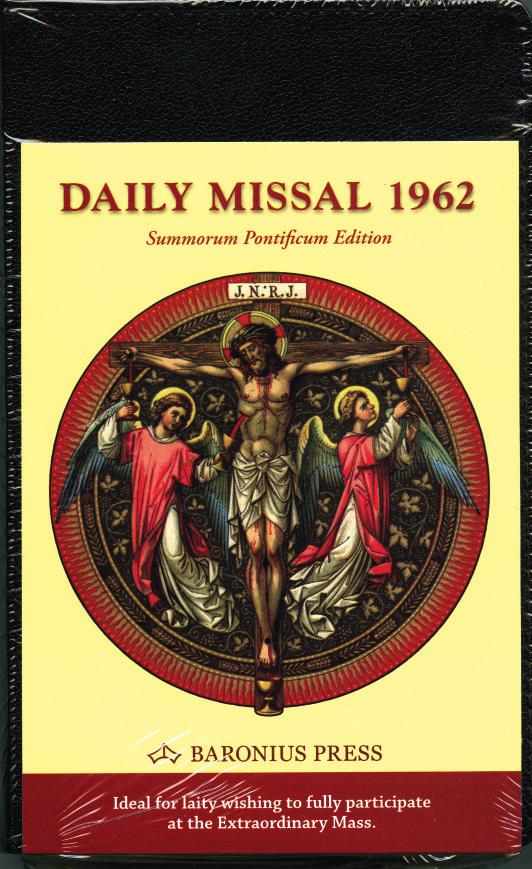

Daily Missal 1962
Baronius Press
RRP $89.95
The only new edition of the traditional Missal of the extraordinary Latin Rite that is approved for use by the Church. This edition includes the full text of the Motu propio summorum Pontificum issued by Pope Benedict XVI. Ideal for laity wishing to fully participate in the Extraordinary Mass.
Features inlude:
All the Masses of the liturgical year
Ordinary of the Mass
Complete Holy Week Liturgy 1962
Common Masses of the Saints and the Blessed Virgin
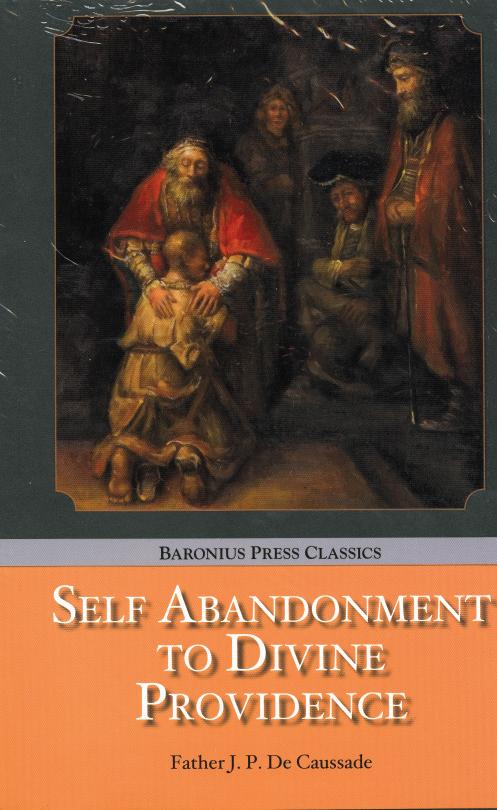

Self Abandonment to Divine Providence
Fr JP De Caussade
RRP $18.95
Fr Caussade’s Self Abandonment to Divine Providence is a book for all those who, in the words of St Benedict, “Truly seek God”. Fr Caussades’ spiritual teaching was derived from two extremely pure sources, St Francis de Sales and St John of the Cross. Another source of influence on Caussade were his penitents, the Nuns of the Visitation.
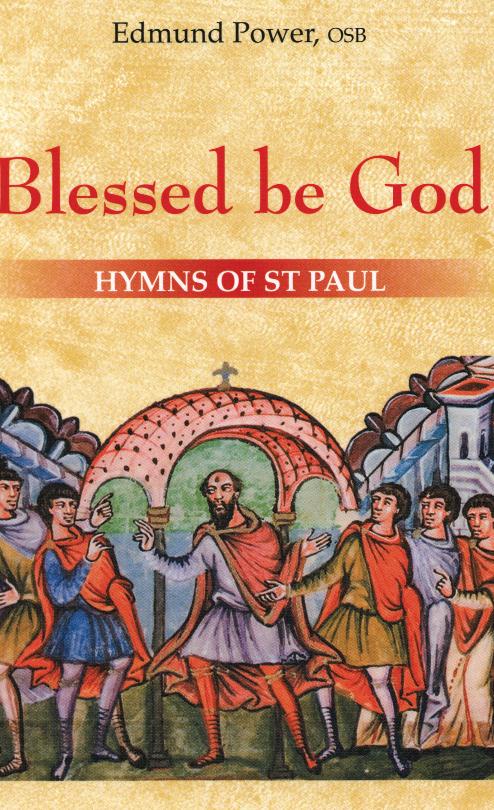

Blessed be God Hymns of St Paul
Edmund Power OSB
RRP $15.95
This book presents ten texts taken from the letters of St Paul. Each text is accompanied by a brief reflection in the style of lectio divina: reading, meditating, praying and contemplat- ing. St Paul’s words invite us to enter more fully into the experience of God. In the power of the Spirit of Jesus, St Paul accompanies us, both spiritually and literally, on our jour- ney. Beautiful miniatures taken from the 9th century Bible of St Paul’s Outside the Walls encourage deeper contemplation.
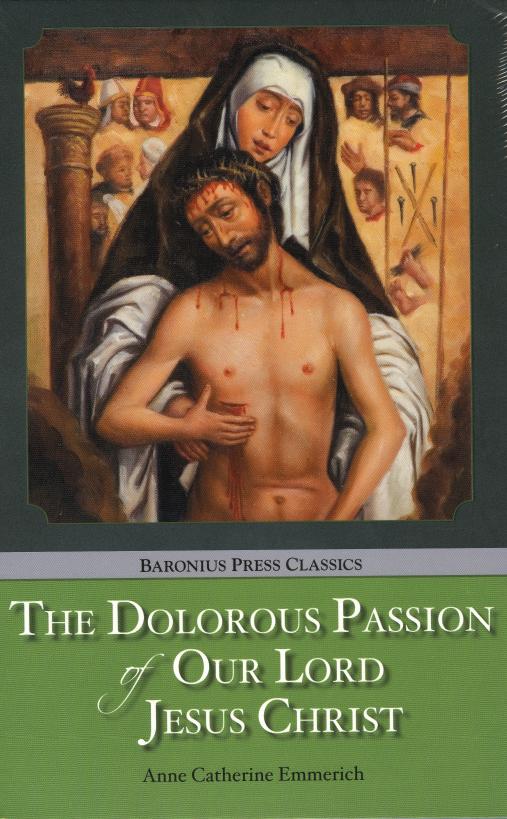

The Dolorous Passion of Our Lord Jesus Christ
Anne Catherine Emmerich
RRP $28.95
The Dolorous Passion has been inspiring thousands since it first appeared in 1833 - being based on the detailed visions of Anne Catherine Emmerich. Recounts with incredible detail the horrendous sufferings undergone by Jesus in securing our redemption, and the infinite love that moti- vated such Agony. While remaining faithful to the Bible, this heartrending account conveys a lasting impression. Our Lord’s Passion and death were brought on by each person’s sins. Here is a book that gives one a holy feeling just to read it. Sure to melt a heart of stone.


The Little Office of the Blessed Virgin Mary
RRP $42.95
This is the first ever edition that includes the complete Gregorian Chant for the Little Office – in traditional four stave notation! The music for the Little Office has never before been gathered together in one volume. For many people the Gregorian chant of the Little Office offers an introduction to the beauty of the Church’s traditional liturgical heritage. This volume will help you sing all the Hours of the Little Office.
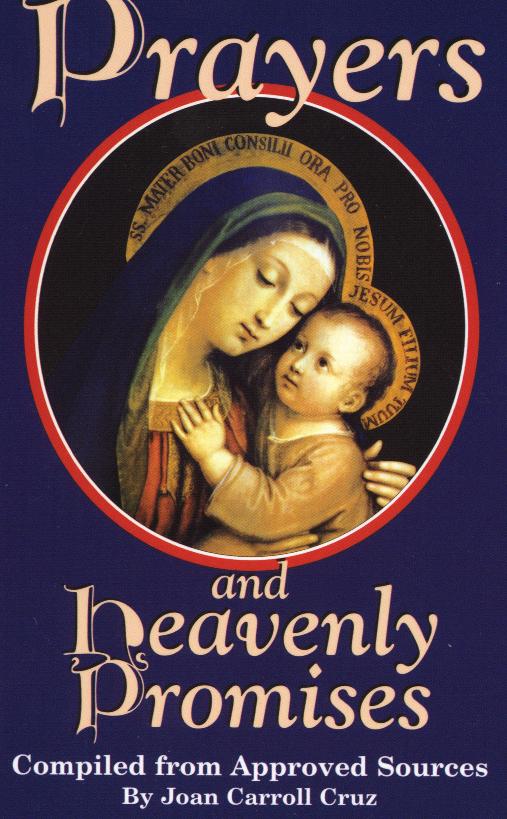

Prayers and heavenly Promises
Joan Carroll Cruz
RRP $8.95
This prayer book contains devotions to the Blessed Mother, the Infant Jesus, the Precious Blood, the Holy Face, the Sacred Heart, and for the souls in Purgatory and many more.
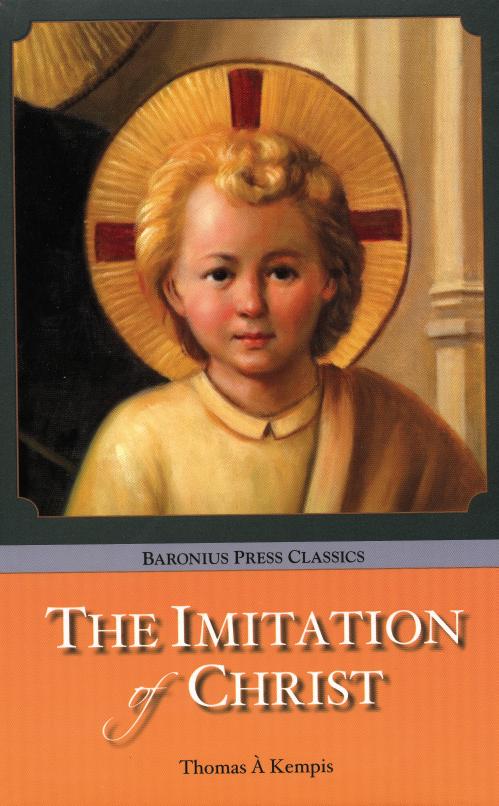



The Imitation of Christ
Thomas A Kempis
RRP $49.95
The Imitation of Christ is widely considered one of the greatest manuals of devotion in Christianity. The life of Christ is pre- sented as the highest study possible to a mor- tal, as Jesus’ teachings far excel all the teachings of the saints. The book gives counsel to read the Scriptures, statements about the uses of adversity, advice for submis- sion to authority, warnings against temptation and how to resist it, reflections about death and the judgement, meditations upon the oblation of Christ, and admonitions to flee the vanities of the world.
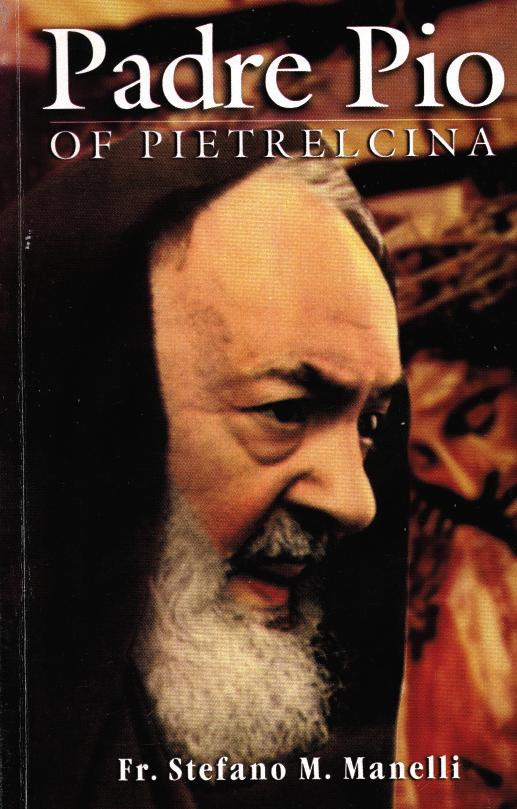

Padre Pio of Pietrelcina
Fr Stefano Manelli
RRP $14.95
The 148-page book on the recently beatified Padre Pio is packed with details about his life, spir- ituality and charisms, by one who knew the Padre intimately. The author qualifies as a spiritual son of Padre Pio in a number of ways. He grew up in a family which had a close relationship with the new Blessed. Padre Pio was the author’s spiritual director. Padre Pio spoke of the Manelli family as “my family.” Fr Stefano turned to Padre Pio for guidance in establishing a new Franciscan community, the Franciscans of the Immaculate.
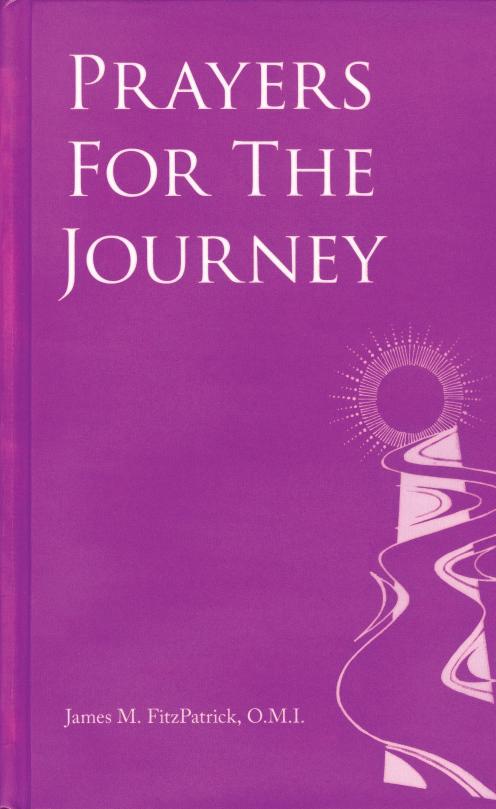

Prayers for the Journey
James Fitzpatrick
RRP $19.95
Praying is being with God and Prayers for the Journey, which offers an original prayer for each day of the year, aims to help us gather up our daily cares and concerns and focus on the God who loves us. Arranged thematically, the prayers can be prayed in sequence or chosen according to specific occasions and needs.


D 1 B R T t t R f T t p
T P L C A R T b s 1 T o T R w t d T s s t S A t P F R F A P a T O B M R T t c C –n t P P F R T t P d i o i q B G H P E R T t l t
Telephone: 9220 5901 Email: bookshop@therecord.com.au Address: 21 Victoria Square, Perth 6000 BIBIANA KWARAMBA Bookshop Manager
Martyrs’ fear relived 30 years later
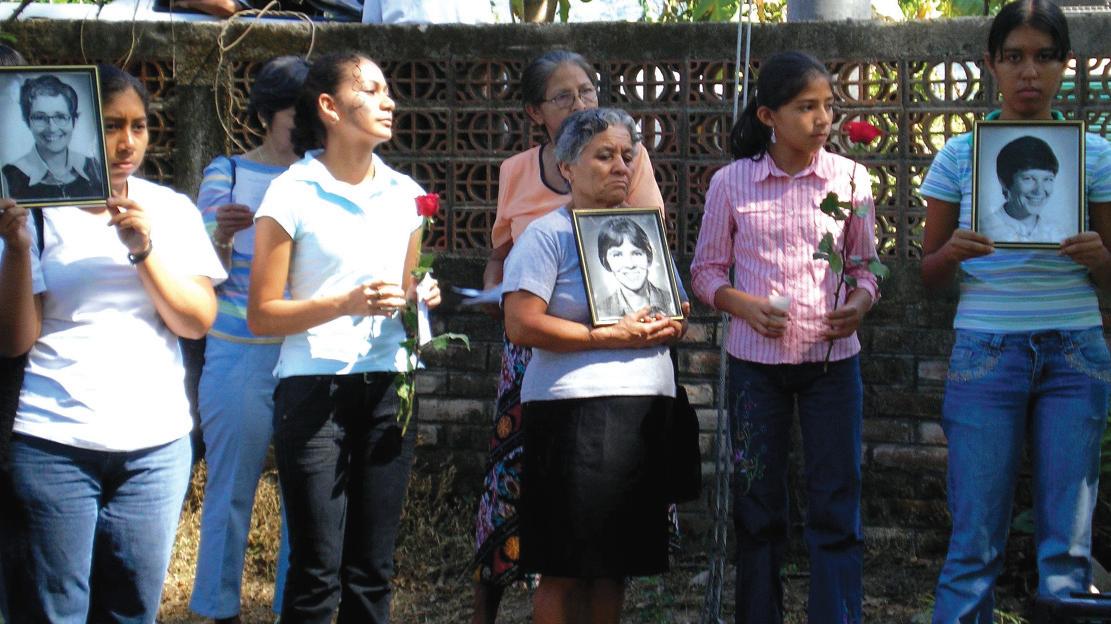
Colleagues recall commitment of churchwomen slain in El Salvador
BY LAURA DODSON Catholic News Service
MELBOURNE, Florida –
December 2 marked the 30th anniversary of the martyrdom of Ursuline Sister Dorothy Kazel, lay missionary Jean Donovan and Maryknoll Sisters Maura Clarke and Ita Ford, the four churchwomen of El Salvador who were savagely brutalised and killed for spreading the Good News and teaching people to read and pray.
“I can’t say this to anybody because they wouldn’t understand,” Sr Dorothy wrote to her former missionary partner, Sr Martha Owen, in October 1980. “I want you to explain why I have to stay.”
El Salvador was experiencing civil unrest, repeated military coups and, finally, civil war.
Amid the death squads and countless disappearances, the four churchwomen attempted to bring life to the communities they served. “Dorothy had a true and genuine concern for people,” Sr Martha said. “She was always open to both sides of an issue - trying to bring light, not heat, to the issue. The preferential option for the poor was in her heart even before we went. She felt the needs of the poor so deeply within herself that she identified with them. She was willing to sacrifice anything. She offered herself for the violence to stop.”
Sr Martha had shared a oneroom hut with Donovan.
“Jean had a call there and tried to follow that,” she said. “She was easy to be around. She was involved with the young people and totally committed to the kids. Jean was everybody’s sister and daughter and maybe God had exactly that in mind.”
Maryknoll Sr Margaret Dillon recalled the decisive moment in the lives of fellow Sisters Maura and Ita. During a retreat in Nicaragua of US Religious at Thanksgiving, Sr Maura, who had been working in Chile, discerned, “God wants me to be in El Salvador,” and then turned to Sr Ita who had experienced several months of the unrest
there, and said, “We will go back together.”
Fr Gregory Chisholm, a Canadian missionary serving in Pucallpa, Peru, was a member of a delegation of six who flew into the San Salvador airport that fateful December day and was greeted by Sisters Dorothy and Donovan who were awaiting the arrival of Sisters Maura and Ita.
“They were very nervous,” Fr Chisholm said.
“They told me to go with the Canadians because the situation was ‘very tense.’ Dorothy said, ‘Pray for us.’ We got into a minibus - the same vehicle in every detail as the Sisters’. Out of a ditch came military guys who stopped us and when we said we were there for the Bishop, they started cursing us.
“We told them, ‘We’re Canadians!’ and they told us, ‘Get out of here,’” the priest recalled. “We learned that 45 minutes later, they stopped and killed the nuns. On our return trip to the airport, we passed by their burnt-out minibus.”
“Sr Dorothy was my mission partner in 1974,” Sr Martha said.
“We went down together to study the language. We were raising the consciousness level of the poor and middle class - bringing them an understanding of their dignity and their rights.
“We taught the people how to say their name in public. They were so frightened they wouldn’t look at you,” she continued.
“We made the people catechists - teaching First Communion classes, Liturgy of the Word sessions, they distributed Communion and developed lay leadership.
“Once war broke out, the catechists were seen as an underground guerilla movement,” she added.
“There was a disconnect totally between a better economic situation and being committed to the poor. Faith does have consequences in the real world.”
The Sisters helped the poor to find food and build shelter. They also taught the farmers about runoff and implemented health care programmes.
The people distributed food, which became a form of leadership development that gave a sense of dignity and self-worth.
“Teaching people to read, teaching people to think, gives them a tool to further develop their sense
Priest stays with people in bombed village
of consciousness and depth of prayer,” Sr Margaret said.
“They can read the Bible and know their dignity. It became good for the folks, but subversive to the powers that be.
“The greater sense was the service we could provide - whatever that might be - not living in harm’s way, but for something. We weren’t fighting against the government but for the Church and God’s reign of peace, justice and love,” she said. “It’s a life wish.”
Sisters Dorothy, Maura and Ita and lay missionary Donovan are remembered every year in the little towns where they served and at the chapel built at the site where their bodies were found.
● Pope Benedict XVI urged the governments of El Salvador and Colombia to continue to press on with efforts to curb the violence and injustice that has afflicted the Latin American countries in the past.
In separate audiences on 18 October with countries’ new ambassadors to the Holy See, the Pope pledged that the Catholic Church would do its part to serve the citizens of those countries and support them in their commitment to root out poverty, drug trafficking and corruption.
Speaking to Manuel Barrera Roberto Lopez, the new ambassador from El Salvador, Pope Benedict praised the Salvadoran government for promoting “a society that is ever more harmonious and supportive” following civil war that lasted from 1980 to 1992. Salvadorans should be able to count on a state that abides by sound judicial, economic and social norms as well as good police and security forces that can guarantee those rights, he said.
He also asked God to “give these citizens the help they need to definitively renounce everything that provokes strife” and convince them that “nothing is obtained and everything is made worse with the detestable violence that makes false claims to people and makes them unworthy.”
In the case of El Salvador, the Pope warned about the presence of sects in the country, which he said “appear to be an easy and comfortable answer to religious searching, but which in reality, upset the culture and the customs developed over centuries” in that country.
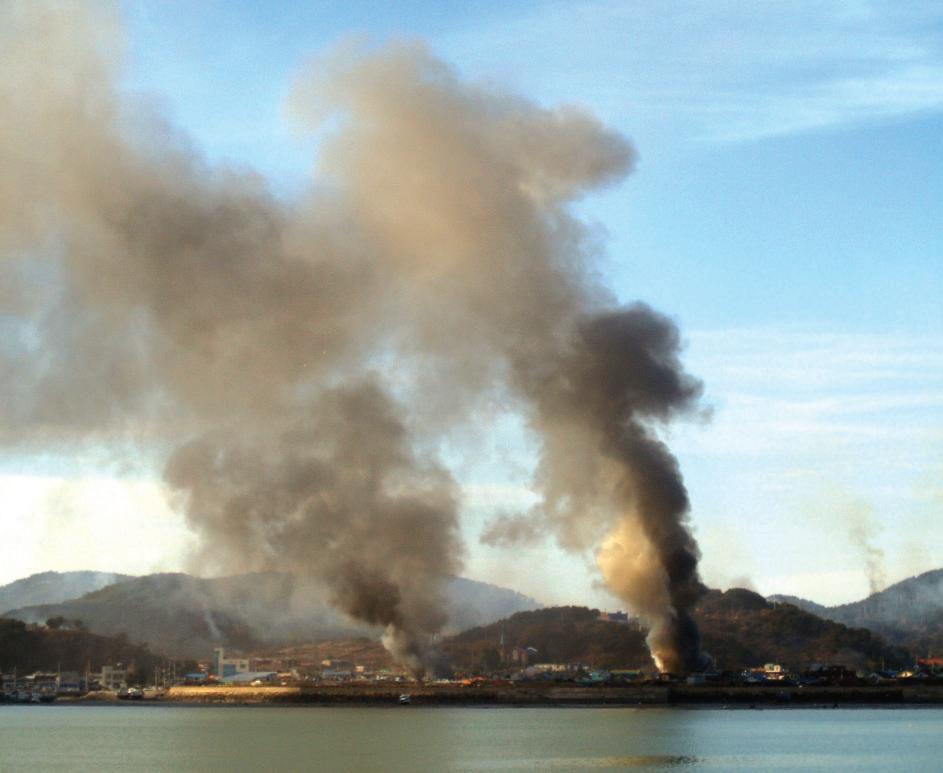
South Korean priests criticise North Korean shelling; church damaged
BY CATHOLIC NEWS SERVICE
INCHEON, South Korea - A South Korean chancellor whose diocese was affected by the recent North Korean military provocation criticised the aggression and expressed concern for local residents.
“The relationship between the North and the South worsened under the current South Korean government,” Father John Kim Yong-hwan, chancellor of Incheon, which covers Yeonpyeong Island, told the Asian Church news agency UCA News. “The South Korean government should introduce dialogue and embrace the North.”
On 23 November, North Korea fired several hundred artillery shells at the South Korean island in the Yellow Sea. The attack killed two soldiers while injuring 13 soldiers and three civilians, said the South Korean military.
The shells also set fire to about 70 houses and mountains in the island, local media reported. Meanwhile, South Korea returned fire, aiming at the North Korean coastal artillery base.
The attack damaged the only Catholic church on the island. However, all Catholics, including Fr Joseph Kim Tae-heon, the parish priest, were safe because they evacuated to a bomb shelter as soon as the shelling began.
While 80 percent of the residents have since gone, Father Kim has opted to stay on the island with those remaining, UCA News reported on 24 November.
North Korea accused the South of firing first. South Korea was
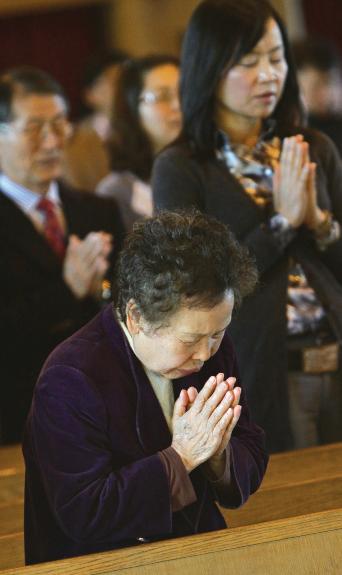
conducting military exercises in the area but said its shells were not directed at the North.
Fr Kim expressed concern for the island’s residents, including its more than 450 Catholics.
Fr Baptist John Kim Hun-il, executive secretary of the Subcommittee for Aid to North Korea under the Korean Bishops’ committee for reconciliation, said North Korea should stop the attack.
“Aiming at civilians and civil houses is inhumane, and it can cause further tragedy in the Korean Peninsula,” he added, urging South Korea to stop the return fire and, through dialogue, persuade the North not to provoke such attacks.
Page 13 1 December 2010, The Record THE WORLD
Smoke rises from South Korean Yeonpyeong Island after being hit by dozens of artillery shells fired by North Korea on 23 November, in this picture taken by a South Korean tourist. South Korea says two marines have been killed and 16 others injured in the bombardment of the South Korean island near the countries’ disputed western sea border.
PHOTO: CNS/YONHAP, REUTERS
Worshippers pray during a weekly Korean Mass at Holy Name of Jesus Church in Woodbury, New York on 28 November. With tensions escalating between North Korea and South Korea, the congregation prayed for peace in the region.
PHOTO: CNS/GREGORY A SHEMITZ
People hold photos of Maryknoll Sr Maura Clarke, Ursuline Sr Dorothy Kazel and Maryknoll Sr Ita Ford during a prayer service in 2007 at a shrine at the site where the three missionaries were murdered in San Salvador, El Salvador. December 2 marked the 30th anniversary of the martyrdom of the three nuns and lay missionary Jean Donovan, who were kidnapped, raped and killed in El Salvador.
PHOTO: CNS/COURTESY OF MARYKNOLL SR MARGARET DILLON
Vatican slams China clampdown
China violates religious freedom, hampers dialogue: Vatican
BY CINDY WOODEN Catholic News Service
VATICAN CITY - The ordination without papal approval of a Bishop in China inflicted a “painful wound” on the Catholic Church, and government pressure on other Bishops to participate in the ceremony was a “grave violation of freedom of religion and conscience,” the Vatican said.
Under close surveillance from local government officials on 20 November, Fr Joseph Guo Jincai was ordained Bishop of Chengdethe first Bishop ordained without papal approval in four years.
Eight Bishops in communion with Pope Benedict XVI laid their hands on Fr Guo, whose ordination was illicit in the eyes of the Church. Some of the ordaining Bishops had been detained by government officials in the days before the ordination in an effort to force them to participate, reported the Asian Church news agency UCA News.
The Vatican, which waited until 24 November to make a statement because it was gathering information, said Pope Benedict “received the news with deep regret.”
As the new Bishop did not have the mandate or blessing of the Pope, the ordination “constitutes a painful wound upon ecclesial communion and a grave violation of Catholic discipline,” the statement said.
The ordination was a violation of Church law and Bishop Guo “finds himself in a most serious canonical condition,” facing “severe sanctions,” including automatic excommunication, it said.
“This ordination not only does not contribute to the good of the Catholics of Chengde, but places
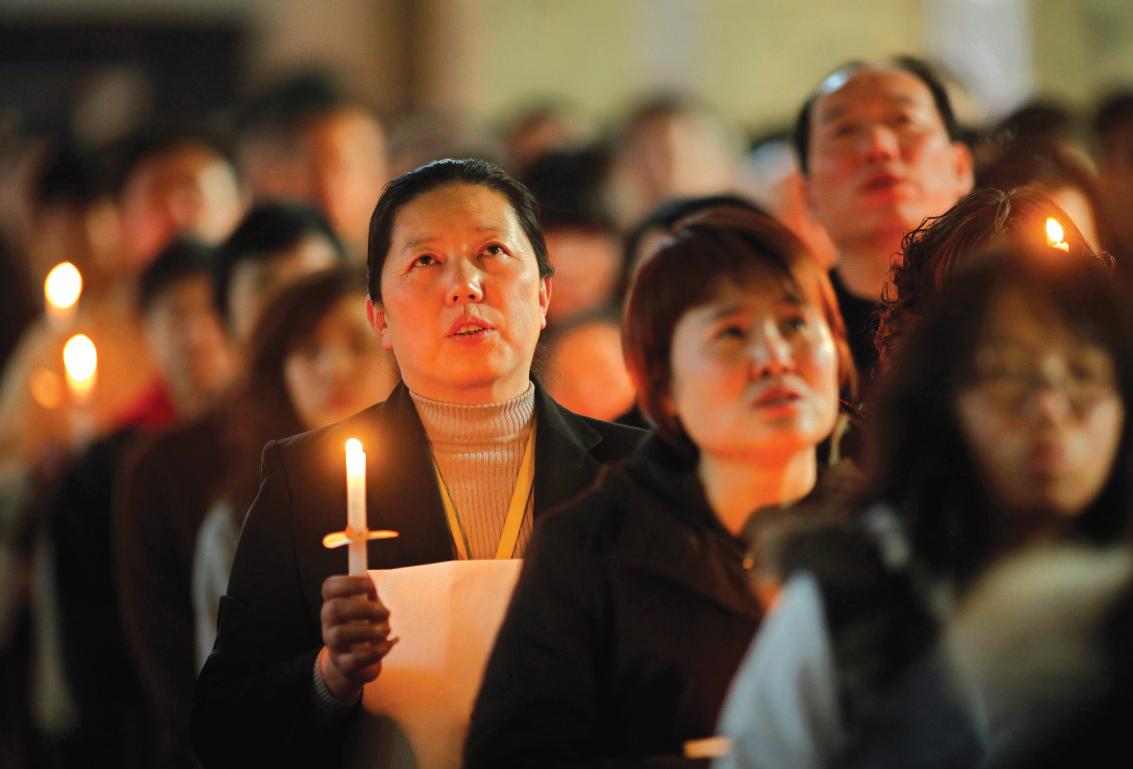
them in a very delicate and difficult condition, also from the canonical point of view, and humiliates them, because the Chinese civil authorities wish to impose on them a pastor who is not in full communion either with the Holy Father or with the other Bishops throughout the world,” the Vatican statement said.
In addition, the Bishops participating in the ordination face canonical penalties unless it can be shown that they were among those forced by government security forces to attend the liturgy.
Retired Bishop John Liu Jinghe of Tangshan refused to attend the ordination, sources told UCA News.
More than 100 Catholics and
dozens of government officials attended the ordination Mass at the church in the rural town of Pingquan on 20 November.
The village was surrounded by about 100 uniformed and plainclothes police. Cameras were banned in the church, and mobile phone signals were blocked in the area.
Bishop Guo became the first Bishop illegitimately ordained since Pope Benedict issued his letter to Chinese Catholics in 2007.
The papal letter strongly criticised the limits placed by the Chinese government on the Church’s activities, but on several key issues, including the appointment of Bishops, it invited civil
Cremations ok, but Church prefers burials: prelates
WASHINGTON - While cremation is not prohibited unless it is chosen for reasons “contrary to Christian teaching,” the Catholic Church prefers that the body of a deceased person be buried in accord with Church custom, according to statements issued by two US Archdioceses.
Cardinal Justin Rigali of Philadelphia and Archbishop Michael Sheehan of Santa Fe, New Mexico said that even when cremation is chosen, the cremated remains of a deceased individual must be treated with respect and integrity. Cremated remains only may be buried in a cemetery or entombed in a mausoleum or columbarium, they said.
Clarifying Church teaching on cremation and proper burial of the dead, both prelates said scattering cremated remains is not permitted under Church teaching.
“Especially to be condemned are the practices of scattering the ashes, enclosing them in jewellery, dividing them among relatives as keepsakes or doing other bizarre things with them,” Archbishop Sheehan wrote in an All Souls’ Day statement.
“Such practices do not give honour to the body and, indirectly, are
an affront to our belief in the resurrection of the dead.” Keeping ashes at home so that family members “may feel close” to their loved ones “shows a lack of faith in the communion of saints, by which we are spiritually united to the departed, in a way far more marvellous than keeping their remains on a shelf in our house,” Archbishop Sheehan said.
Cardinal Rigali said burial at sea is permitted, but cremated remains must be placed in a solid and durable container and not scattered.
Norms governing cremation in Philadelphia took effect on 1 November, All Saints’ Day, and said that burial of the human body recalls the manner of the entombment of Christ even though cremation is allowed.
The norms state it is preferred that remains be cremated after a funeral Mass and require that the length of time between a funeral liturgy and the burial of cremated remains not to exceed 30 days.
In cases where remains are cremated and buried prior to a funeral liturgy, the rite is to be adapted according to the Order of Christian Funerals, the norms said.
For example, the rite of final commendation and rite of com-
mittal would be omitted because they would have already occurred at the burial.
Since 1997, the US Bishops have had permission, in cases where the body has been cremated, to allow the cremated remains to be present at the funeral Mass or liturgy in their dioceses if they judged it pastorally appropriate.
In Santa Fe, Archbishop Sheehan urged pastors to share Church teaching on cremation and burial with the faithful in the pews.
He asked the priests “to do all in their power to see that each Catholic receives the funeral rites of the Church as they deserve as baptised Christians.”
“Let us not be misled by the atmosphere of paganism around us, which rejects the existence of the soul, the sacredness of the body, the mercy of the redemption and the eternal life with God in heaven,” Archbishop Sheehan said.
“Rather, let us render the debt of love we owe the dead in frequent prayer for their eternal rest and let our funeral celebrations show to the entire world that we believe ‘in the resurrection of the dead and the life everlasting,’ won for us by the death and resurrection of our Lord Jesus Christ.”
of China and the Holy See.” Hong Kong Cardinal Joseph Zen Ze-kiun, who attended the Pope’s creation of 24 new Cardinals at the Vatican on 20 November, said he was saddened by news of Bishop Guo’s ordination and information that some Bishops were forced to participate.
However, he told UCA News, “We should not be so quick to condemn those, our brothers, before listening to their self-justification.”
The Cardinal criticised Anthony Liu Bainian, vice president of the Chinese Catholic Patriotic Association, who said China proceeded with the ordination because the Vatican had not given a good reason for its lack of approval. Bainian told UCA News, “We have waited for a long time and could not wait any longer.”
“The last word belongs to him,” Cardinal Zen told UCA News.
“We thought there was a sincere negotiation going on. No, that was not so. He wants everything his way.”
The Vatican’s 24 November statement also expressed concern about Bainian’s influence in the matter.
authorities to a new and serious dialogue.
In recent years, because of government requirements, the priests, nuns and laypeople of Chinese dioceses have elected their new Bishops, and most of those elected have applied to the Holy See for approval. If such approval was given, it often was announced at the episcopal ordination. Ten Chinese Bishops already have been ordained with Vatican approval this year.
Two days before the ordination, Jesuit Fr Federico Lombardi, Vatican spokesman, said the ordinations, if carried out, would damage “the constructive relations that have been developing in recent times between the People’s Republic
“The Holy See notes with regret that the authorities allow the leadership of the Chinese Catholic Patriotic Association, under the influence of Mr Liu Bainian, to adopt attitudes that gravely damage the Catholic Church and hamper the aforesaid dialogue,” the statement said.
Ordained a priest in 1992, Bishop Guo has been vice secretary-general of the Chinese Catholic Patriotic Association and a Catholic representative of the National People’s Congress, China’s parliament.
Church sources told UCA News that the laypeople in Chengde, who are simple in their faith and loyal to the Pope, have no choice but to accept their new Bishop.
“After all, (Bishop) Guo’s reputation among the local faithful is not bad,” a Pingquan Catholic told UCA News.
Priests conduits of Christ’s salvation despite faults
VATICAN CITY - Despite their human weaknesses, priests bring the saving power of Christ to the faithful through the sacraments and the Word of God, Pope Benedict XVI said. “The Eucharist is an extraordinary gift of love that God continually renews in us to nourish our journey of faith, reinvigorate our hope and arouse our sense of charity in order to become ever more like him,” he said during his 24 November general audience.
In his catechesis, the Pope described the life of the 14th century doctor of the Church, St Catherine of Siena, a Dominican and a “woman of great holiness.”
Just like St Catherine, every Catholic should feel compelled to conform one’s life and one’s heart to the heart of Jesus, he said. He asked that everyone let their hearts be transformed “and learn to love like Christ, in familiarity with Him, nourished by prayer, reflection on the word of God and the sacraments,” especially the Eucharist.
People of every social standing were fascinated by St Catherine’s
moral authority, he said. She exercised a “spiritual maternity” like that still benefiting the Church today thanks to the dedication of many lay and consecrated women, said the Pope. Such spiritual mothers encourage people to keep their thoughts and lives focused on God and prompt people to aim to live holier lives, he said.
St Catherine’s love for the Lord and his Church was so great that even though she was aware “of priests’ human defects, she always had a great reverence for them: They confer, through the sacraments and the word, the saving power of the blood of Christ,” the Pope said.
Motivated only by her “deep and constant love for the Church,” St Catherine always encouraged priests and even the Pope “to be faithful to their responsibility,” he said. St Catherine teaches people today that authentic spirituality has Christ at its centre, the Pope said. Like the Italian saint, “let us learn to love Christ and the Church with courage, intensity and sincerity,” he said.
Page 14 1 December 2010, The Record THE WORLD
A woman holds a candle during the Easter Vigil Mass at the Cathedral of the Immaculate Conception in Beijing in April. China has more than 21 million Christian church members, according to statistics from Xinhua News Agency.
PHOTO: CNS/PETAR KUJUNDZIC
Advent: what exactly are we waiting for?
Pope highlights Mary’s example as the “Woman of Advent”
VATICAN CITY (Zenit.org)Advent is a season of waiting and a time to ask ourselves what we are hoping for, what our hearts are longing for, Pope Benedict said on 28 November before praying the midday Angelus in St Peter’s Square.
The Pope noted the beginning of Advent, the season that looks both “to the first coming of the Son of God, when He was born of the Virgin Mary, and to His glorious return, when He will come to judge the living and the dead.”
The Pontiff proposed a reflection on this theme of “waiting,” noting that “it involves a profoundly human reality in which the faith becomes, so to say, completely one with our flesh and our heart.”
“Our whole personal, familial and social existence passes through this dimension of waiting,” he noted. “Waiting is something that is present in a 1,000 situations, from the smallest and most banal to the most important, which draw us in completely and in the deepest way.”
For example, the Holy Father said, “we think of a husband and wife waiting for a child; of waiting for a relative or friend who is coming from far away to visit us; we think of a young person waiting to know his grade on a major exam or the outcome of a job interview; in romantic relationships, of waiting to meet the beloved person, of
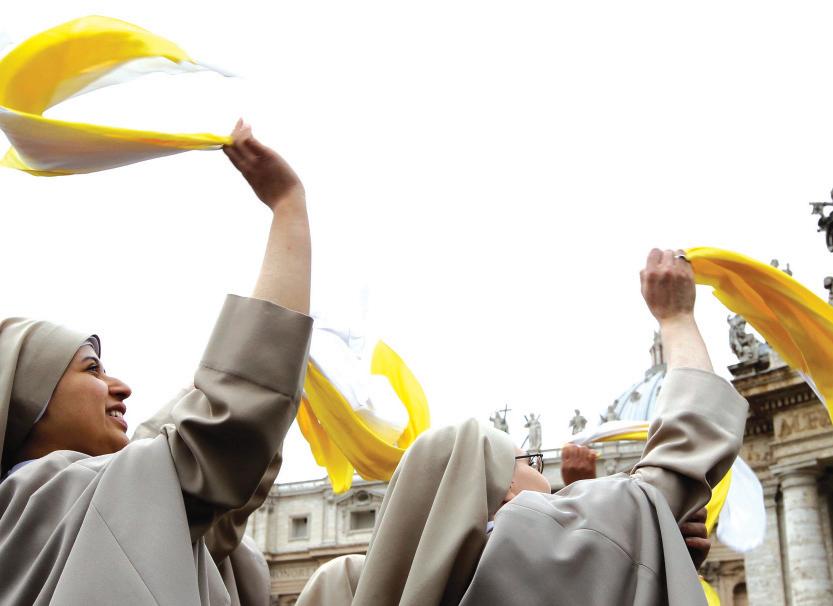
waiting for a letter, or of receiving forgiveness. One could say that man is alive so long as he waits, so long as hope is alive in his heart,” he affirmed.
“Everyone of us, therefore, especially in this season in which we prepare for Christmas, can ask himself: What am I waiting for?
“For what, in this moment of my life, does my heart long? And this same question can be posed at the level of the family, of the community, of the nation.
“What are we waiting for, together? What unifies our aspirations, what do they have in common?”
Pointing to the example of Mary,
the Pope acknowledged that “in her heart the longing for the Saviour was so great, her faith and hope were so ardent, that He was able to find in her a worthy mother.”
“After all, God Himself had prepared her before all time.
“There is a mysterious correspondence between the waiting for God and the waiting for Mary,” the Pope said, “the creature ‘full of grace,’ totally transparent to the plan of love of the Most High.”
“Let us learn from her, the woman of Advent, to live with a new spirit in our daily gestures, with the sentiment of a profound expectation that only the coming of
Pope: Catholic papers have ‘irreplaceable role’
BY JOHN T HAVIS Catholic News Service
VATICAN CITY (CNS) - Pope Benedict XVI said the Catholic press has an irreplaceable role in forming Christian consciences and reflecting the Church’s viewpoint on contemporary issues.
Despite the crisis in print media today, the Catholic newspaper still has a vital role to play in diocesan communications, the Pope said. He made the remarks on 26 November to members of the Italian Federation of Italian Weeklies, which represents 188 Catholic newspapers.
The Pope said that while secular media often reflect a sceptical and relativistic attitude toward truth, the Church knows that people need the full truth brought by Christ.
“The mission of the Church consists in creating the conditions so that this meeting with Christ can be realised. Cooperating in this task, the communications media are called to serve the truth with courage, to help public opinion see and read reality from an evangelical viewpoint,” he said.
A primary task of the Catholic newspaper, he said, is to “give voice to a point of view that reflects Catholic thinking on all ethical and social questions.”
The Pope said the printed newspaper, because of its simplicity and widespread distribution, remains
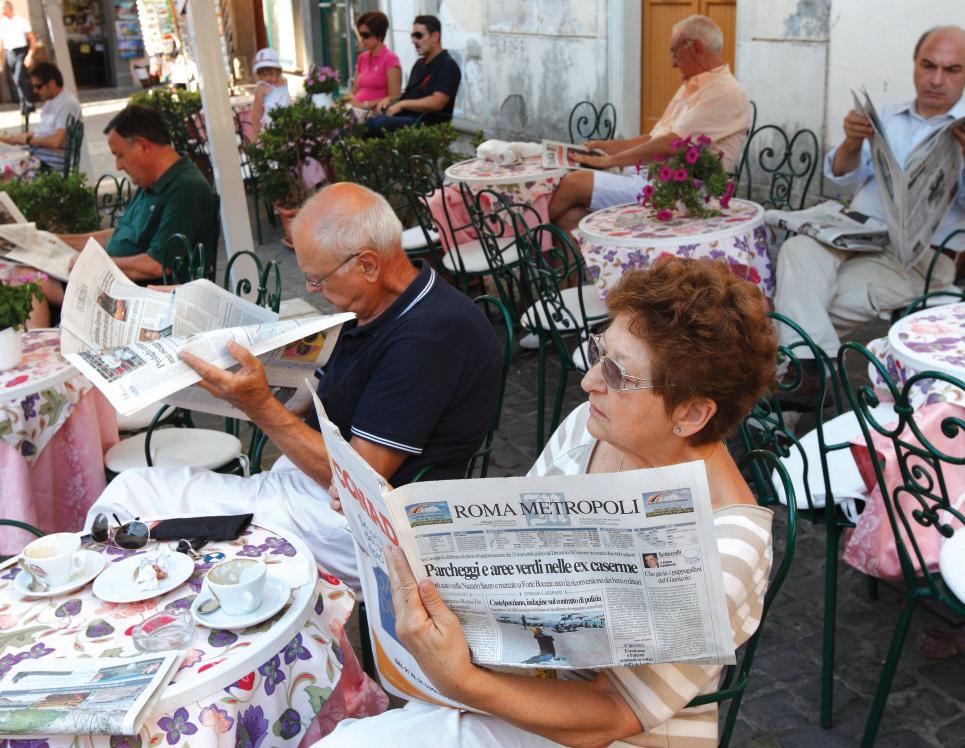
an effective way of spreading news about local diocesan events and developments, including charity initiatives.
As “newspapers of the people,” he said, Catholic papers can also favour real dialogue between different social sectors and debate among people of different opinions.
“By doing this, Catholic newspapers not only fulfill the important
Mercy killing still murder: UK court
A BRITISH woman found guilty of murdering her braindamaged son has lost her appeal after the court ruled that mercy killing is murder.
Frances Inglis was originally given a life sentence with a minimum term of nine years, but the Appeals Court reduced that to five years. After her son Thomas was seriously injured as a result of a brawl in 2007, Ms Inglis tried to kill him with an injection of heroin. However, he was revived and she was charged with attempted murder. While on bail, she succeeded in killing her son.
While acknowledging that this was a tragic case, the Lord Judge stated that: “However disabled Thomas might have been, a disabled life, even a life lived at the extremes of disability, is not one jot less precious than the life of an able-bodied person.
“His life was protected by the law, and no one, not even his mother, could lawfully step in and bring it to a premature conclusion.
“The latest statute to address the problem of mercy killing, currently in force, expressly includes as mitigation for the offence the offender’s subjective belief that he or she was acting out of mercy, but that belief and motivation, however genuine, does not and cannot constitute any defence to the charge of murder.”
Furthermore, he said, “the law of murder does not distinguish between murder committed for malevolent reasons and murder motivated by familial love”.
This is believed to be the first British case of mercy killing to reach the Court of Appeal.
‘Foetal reduction’ essential for IVF: specialist
THE disciplinary hearing of the doctor who treated OctoMom, Nadya Suleman, gives some revealing insights into the way fertility specialists operate.
Testifying in support of Dr Michael Kamrava this week, a famous Beverly Hills colleague, Dr Jeffrey Steinberg, told the court that there was no generally accepted number of embryos to be implanted.
“He was trying very hard to help this woman get pregnant. I can’t fault his judgement,” Steinberg said.
“I can question maybe how aggressive he can be, but again, I wasn’t in the room with the patient.”
In fact, Dr Steinberg went on, many of his patients ask for a large number of embryos to be implanted because they want large families. “In our eyes, those embryos belong to the patients and they have to make decisions about them,” Steinberg said.
And if there are too many?
“Fetal reduction remains as our safety net with in vitro fertilisation,” Steinberg said.
Community life key to Religious vocations boost: Benedict
A healthy, happy community life where members truly are seen as family is one of the most attractive aspects of Religious life, Pope Benedict XVI said.
Members of the men’s Union of Superiors General and the executive committee of the women’s International Union of Superiors General attended the papal audience on 26 November at the end of a meeting on the future of Religious life in Europe.
Pope Benedict told the Religious that although many Orders are experiencing declining numbers, “the difficulties must not lead us to forget that consecrated life has its origin in the Lord: He wanted it for the edification and holiness of His Church, and so the Church will never be without it.”
In their vocations outreach, Religious should never forget how attractive a healthy community life is, the Pope said.
“Fraternal life is one of the aspects that young people look for most” when considering Religious life, he said.
“It is an important prophetic element you offer in a society that is strongly individualistic,” he added.
When making changes, Religious communities must take seriously their obligation to pray and weigh decisions carefully, he said.
Giving birth to a new phobia
New medical conditions are springing up everywhere - and one of the newest is “tocophobia”, that is, the fear of giving birth.
The term seems to be no more than 10 years old, but it has finally come of age and is being featured in the tabloid press. Recently a woman in the UK told the Daily Mail about her own experiences with tocophobia, explaining why she thinks many women will now opt out of childbirth. Laura Kemp went through “22 hours of terror” in giving birth to her son, Paddy, three years ago, and has said she “will never have another child”.
task of providing information, but also perform an irreplaceable formative function” in the education of “critical and Christian consciences,” he said. The Pope said Catholic journalists should give witness to their faith in their work. Their success as Catholic communicators will depend above all on their personal relationship with Christ, he said.
She said that National Health Service figures for elective Caesareans are increasing every year, “haunted by their first taste of giving birth”.
Kemp told the Daily Mail there are two groups of tocophobics: primary, those who haven’t given birth before, and secondary. She is classified as a secondary tocophobic, meaning that having endured one labour she is “desperate to avoid repetition at all costs”.
Kemp says she will “grasp at any opportunity” to get her son mixing with others, so that he does not feel like he has missed out on having brothers and sisters.
- CNS, Mercatornet
Page 15 1 December 2010, The Record THE WORLD
Nuns wave at Pope Benedict XVI during his Angelus prayer in St Peter’s Square at the Vatican on 28 November, when the Pope highlighted Mary’s role as the “Woman of Advent”.
PHOTO: CNS/ALESSANDRO BIANCHI, REUTERS
People read newspapers in the morning at a coffee shop outside the papal villa at Castel Gandolfo, Italy. Pope Benedict said Catholic newspapers have an “irreplaceable role” in forming Catholics and being counter-cultural. CNS
Parishes address marriage decline
Dioceses boost efforts to stress importance of marriage in modern world
BY DENNIS SADOWSKI Catholic News Service
WASHINGTON - Despite a recent Pew Research Centre survey that found a growing number of Americans - now 39 per cent, up from 28 per cent in 1978 - think marriage is becoming obsolete, family ministers across the country say they believe marriage remains a strong institution.
And they’re taking steps to keep it that way.
“That (survey) says that over 60 per cent agree that marriage is not becoming obsolete,” said Bill Boomer, executive director of the Department of Marriage and Family in the Cleveland Diocese. “The majority of first marriages still last. It is still possible to be married for a lifetime.”
Professional ministers such as Boomer, while not buoyed by the survey’s results, told Catholic News Service that they believe marriage will survive, but he acknowledged they must come up with ways to impress upon young generations the important role marriage plays in society.
They also say the Catholic Church’s view that marriage can only exist between one man and one woman is important to share with modern-day culture.
“If we don’t get that message out, that Christian message out in the next few years, our culture will have succeeded in defining marriage for us,” said Lorrie Gramer, co-director of the Family Life Office in the Diocese of Rockford, Illinois.
The Pew survey examined a wide range of issues related to marriage and families. In addition to finding that nearly four in 10 people consider marriage less important as an institution, the survey also revealed that slightly more than half - 52 per cent - of all adults were married in 2008 compared with 72 per cent in 1960.
The decline in marriage has occurred primarily based on educational background. By a 64 per cent to 48 per cent margin, college graduates are more likely to be married than people with a high school diploma or less.
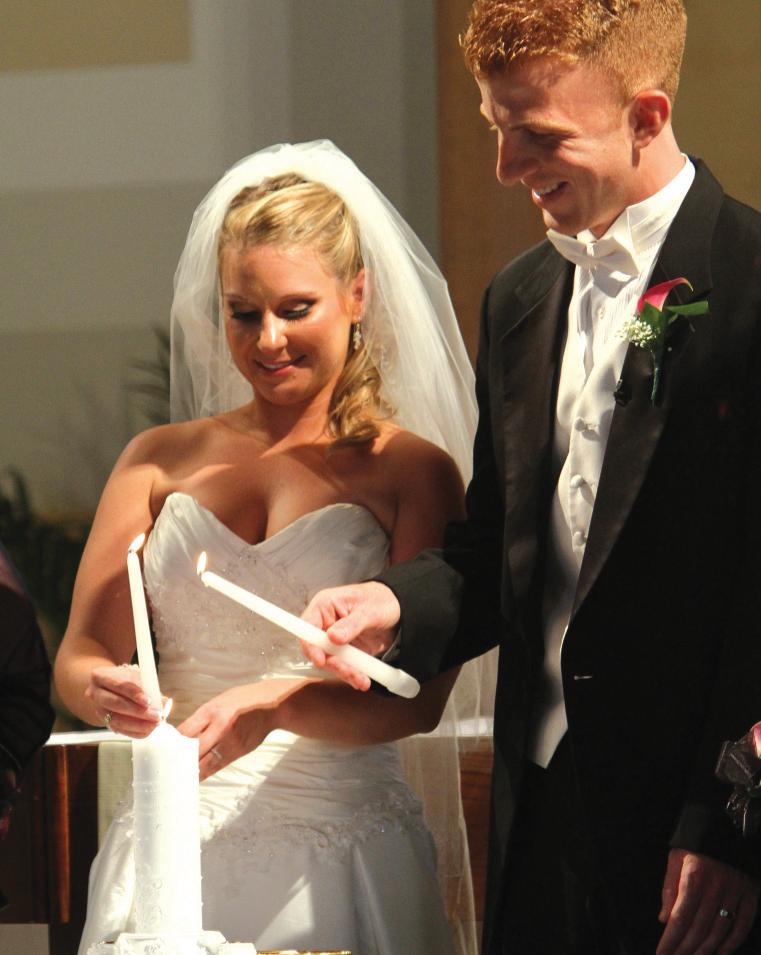
While people in both groups were just as likely to say they want to marry, according to the survey, people with a high school diploma or less placed a higher premium on financial stability as a very important reason to marry.
The survey also found that a vast majority of respondents do not see marriage as the only foundation of family life, with 86 per cent saying a single parent and child is a family, 80 per cent saying an unmarried couple living together with a child is a family and 63 per cent saying a same-sex couple raising a child is a family.
Meanwhile, 69 per cent of those surveyed said the trend toward more single women having children is bad for society. At the same time, 61 percent said a child needs both a mother and father to grow up happily.
A minority of respondents (43 per cent for each question) thought cohabitation without marriage, unmarried couples raising children and gay couples raising children are bad for society.
Chris Codden, director of the
Office of Marriage and Family in the Diocese of St Cloud, Minnesota said efforts are under way nationwide to stress the positive aspects of marriage in everyday life.
“We have to make marriage look healthier and more appealing to young people,” Codden told CNS.
Parish-based programmes in St Cloud also focus on how marriage is portrayed to children.
“We’re particularly looking at how we help parents teach their children not only about sexuality but about the beauty of marriage,” said Codden, who is president of the National Association of Catholic Family Life Ministers.
Such efforts require that married couples have more prominent positions in parish life, Gramer explained, pointing to a diocesan marriage initiative in Rockford that will involve the formation of marriage ministry teams in each parish.
Much of the Rockford effort is focusing on marriage as a social institution as well as a sacrament of the Church. The effort is incorporating various aspects of the For Your Marriage initiative of the US
Marriage in Decline
Marriage is less prevalent today than in any time in U.S. history.
Conference of Catholic Bishops. “We just wanted to get more recognised visibility,” Gramer told CNS. “We wanted to give that witness to those people who are there, especially to young people.”
Judy Clark, co-director with her husband, George, of Family and Adult Ministry and Counselling Services at St Mark Parish in Plano, Texas, echoed Gramer’s view that it is important to show young couples the value of marriage over cohabitation. With US Census Bureau statistics showing that cohabitation before marriage has nearly doubled since 1990, Clark and her colleagues know they have a huge task ahead. The Pew survey found that 44 percent of all adult respondents - and more than half of all adults 30 to 49 years old - say they have cohabited before marriage. Of those who have done so, 64 percent said they saw cohabitation as a step toward marriage.
“The reality is that many of our couples who are coming to us for (preparation) for sacramental marriage are already living together,” Clark acknowledged. “The point is, they’re coming to the church. We’re preparing them for sacramental marriage. We’re not taking time to
condemn or put them down. We’re moving forward.
“I think it’s very important to have an invitational attitude with our young people,” she said. “If you come in heavy-handed, you can lose them.”
Emphasis also is being placed on diocesan programmes to help married couples get through the rough times that occur in every marriage. That’s where married couples can be resources to other married couples, explained Gramer in Rockford.
But in a secular society with changing norms, how does the Church’s approach to marriage education, support and preparation continue to bear fruit if people are finding the institution less important?
It comes down to faith and religious values, said Boomer in Cleveland. It’s in those areas where he believes the Church can make a difference.
“It’s taken us 40 years to get here,” he said. “I think it’s too early to tell (if we’re succeeding). But we’ve got to try.” Boomer added: “I don’t feel alone anymore. I see more parishes doing marriage enrichment things. It’s better than keeping our heads in the sand.”
Hawking’s origin theory ‘unscientific’: Jesuit
Jesuit astrophysicist: Hawking’s theory on origin of universe unscientific
Valencia, Spain (CNA)Renowned astrophysicist and Jesuit Fr Manuel Carreira has condemned British scientist Stephen Hawking’s theory that the universe created itself from nothing as lacking “scientific rigour and validity.”
Fr Carreira said that Hawking’s theory is “unscientific” as it contradicts the laws of physics and provides no proof for its claims, according to AVAN news agency. The priest’s comments came on 23 November during a conference in Valencia, Spain titled “Dialogue with Stephen Hawking on Creation.”
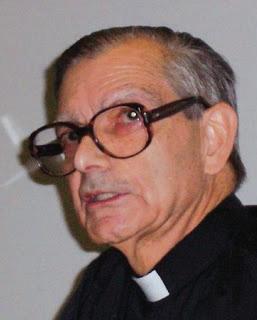
Fr Carreira said Hawking’s theory “does not contribute to knowledge in any way.” While he praised the British scientist for his determination in battling his physical limitations, he said
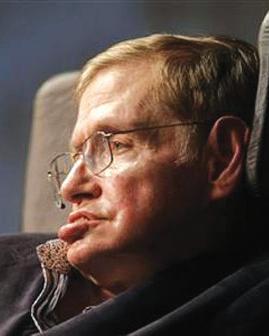
Hawking’s new book is “a highly revealing description of what 20th century science has accomplished and what remains to be done.” But, he added, the book “does not offer anything new.”
The book is only “original” in its illogical denial of human freedom in Chapter one and its claims in the final chapter that “through the force of gravity, a universe created itself from nothing. Nothingness does not have any force or properties”.
It is “purely the absence of all reality.” What is evident, he added, is that “gravity is the result of mass,” such that “since nothingness has no mass, it cannot have gravity either. It would be like saying from zero you could get a bank account.”
Fr Carreira also noted the “compatibility” of science, philosophy and theology in discovering truth. “They are all partial ways of understanding a reality that is very rich and that cannot be known by just one methodology.” All three can “complement each other in bringing about the development of human knowl-
edge,” he added. Science “only speaks of how matter acts,” but it “cannot give a reason” for why that matter exists. The question of the meaning of the universe or of life “is outside the bounds of science and one must seek an answer in another order of reasoning,” the priest said. Thus, science is “a way of knowing what is observable and subject to experimentation, but it cannot be asked to speak of what it cannot prove,” such as “the desire to know, freedom, finality, ethics, art, family or social relations,” he stated. For this reason, “reducing human reality to the four forces of matter is a totally unscientific claim that goes against our experience,” Fr Carreira explained. Fr Carreira is a doctor in physics and professor of philosophy at the Comillas University in Spain. He is also a member of the Vatican Observatory.
Page 16 1 December 2010, The Record THE WORLD
1960 1970 1980 1990 2000 2008 MARRIED NEVER MARRIED SEPARATED/ DIVORCED 52% 27% 14% 72% 15% 5% Source: Pew Research Center for the People & the Press ©2010 CNS MARITAL STATUS OF THOSE AGE 18 AND OLDER
Fr Manuel Carreira SJStephen Hawking
Lazy progressive rhetoric not so enlightened
Life, the Universe and Everything
Anna Krohn
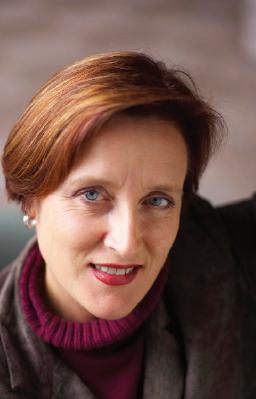
What does progress really mean?
News reports and media commentators too often uncritically use the word “progressive” and “enlightened” to dub any movement towards the acceptance or legalisation of such procedures as euthanasia, reproductive technology or abortion.
The widespread and frankly rather lazy use of such rhetoric has both a divisive and demoralising effect on the many socially concerned and engaged people who oppose such practices.
Firstly, such language implies that those opposing the “reform” agenda have moral and philosophical concerns based on inactivity, mindless reaction, bigotry and fear of change. Secondly, such terminology carries with it an unspoken and unproven assumption: that the erosion of the “intrinsic” and “transcendent” value of human life by the “sweet reason” of secularist arguments is all part of the inevitable and unstoppable process of advancing society and the march of history.
As the insightful English Catholic historian Christopher Dawson wrote as far back as 1961: ‘It is part of the liberal ideology which presupposed the inevitable movement of progress which science (or secularism) continually advances and religion (and all transcendent belief) retreats . . .
We can all feel the hope and courage drain out of us when the secularist agenda dominates the media airplay, the votes in parliament or even the voices around the school reunion lunch table.
But as Dawson also comments, it is exactly the secularistic mythology of “progress” that is contradictory and illogical - it is bound to destroy both the soul of society and the dignity of the person ‘this one-sided development of culture has become a threat to the survival and is contrary to the real interests of humanity and society …’
However, perhaps this one-sided account of progress is wearing thin?
● In the South Australian Parliament, just before this newsletter was finalised, a Bill regulating the permitting of euthanasia in South Australia was defeated on “voices” (that is, it was considered that if put to the vote it would have been defeated 12-9).
Until the night of the vote, the Parnell Bill was expected to win by all sides in the debate.
There was a strong contingent of pro-euthanasia lobbyists, including the notorious Phillip Nitschke, crowded into the public gallery expectant of an influential victory which would snowball reform throughout Australia.
The Bill appeared to be riding on the years of systematic campaign by the South Australian Voluntary Euthanasia Campaign, the sponsor-
ship of the Greens and the widespread media polling data.
The Catholic Women’s League of South Australia and many other community organisations submitted strong opposition to the Parnell Bill. The CWL (SA) urged the Senators to promote “dignity in dying” not with “the full stop of euthanasia” but with the “active” and dynamic relationships of the suffering and terminally ill with family members and an active health and wider community.
In an unprecedented step, the leading bioethicist, Associate Professor Nicholas Tonti-Filippini, spoke of his own experiences of
resolution was moved by Britain’s Christine McCafferty.
It aimed to remove what she called the reactionary, and in her mind “repressive”, “problem of unregulated use of conscientious objection” by medical staff and hospital administrations in the matter of abortion.
Once again, it was expected that the “culture of reform” was dominant in the Council and would most likely vote in favour of voting to “coerce” the referral and cooperation in abortion in all countries throughout Europe.
However, two relatively young members of the Council, one from
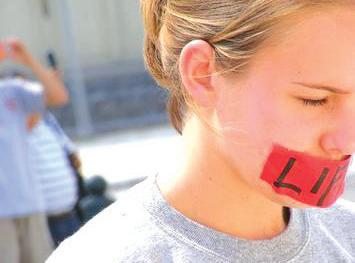
chronic and declining health and palliative care in an intensely moving and intimate letter which was cited by several members of the house: ‘Each year I was reminded (by his health insurance company) how much of a burden I am to my community. The fear of being a burden is a major risk to the survival of those chronically ill. If euthanasia were lawful, that sense of burden would be greatly increased for there would be even greater moral pressure to relinquish one’s hold on a burdensome life. Seriously ill people do not need euthanasia … Rather than help to die, the cause of dignity would be more greatly helped if more was done to help people live more fully with the dying process.’
Dr Tonti-Filippini also added that there were many other aspects of the Bill which were problematic and illiberal: that it was not “broadbased enquiry” by the community, it was not supported by aged-care organisations throughout the state or by the AMA and it did nothing to support the existential “pain” and loneliness of those who suffer.
One female member of the House voted against the Bill even though she declared herself, in principle, “pro-choice”. Ann Bressington MLC recorded her conviction of the danger to those whose health status was most precarious, notably the Indigenous population: ‘I don’t care if it is not hip to be pro-life’, she said, ‘There are slippery slopes, they do exist.’
Other members spoke not of the progress of such legislation, but of their concern that such procedures would spiral downwards - that “voluntary euthanasia would inevitably become involuntary euthanasia.”
● On 8 October in Strasbourg, another so-called “progressive”
Advent wreath precedes Christ
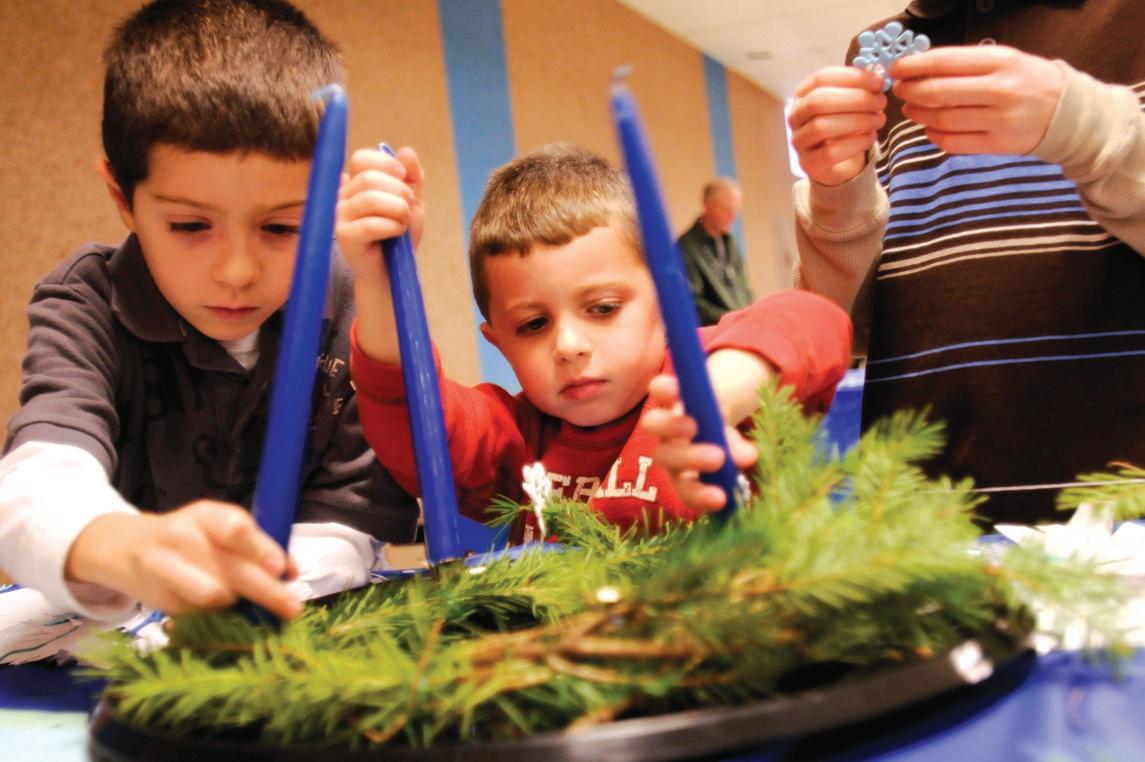
Q&A
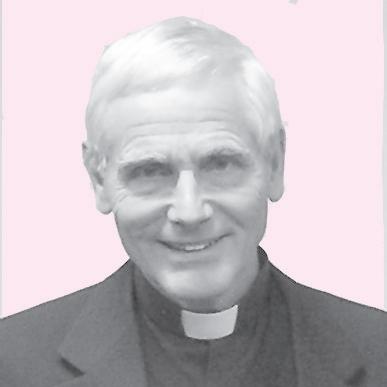 By Fr John Flader
By Fr John Flader
The Advent wreath
Q: In recent years I have seen more and more Advent wreaths, both in homes and in churches. Is this just a nice decoration like a wreath on a door, or does it have some spiritual meaning?
FIreland, Senator Ronan Mullen, and the other from Italy, Senator Luca Volonté, successfully moved amendments which reversed the entire direction of the resolution, effectively moving to safeguard the right of medical practitioners to stand by their consciences.
These amendments were strongly supported by a number of healthlaw groups, the work of WUCWO and the petitions of the French prolife network.
Far from rejecting the value of liberty, the radically drafted legislation restored the moral freedom of medicine. The Director of the European Centre for Law and Justice, Gregor Puppinck, implied that such “reversal” demonstrated not that the Council was retrograde but that history was not a oneway street. Progress can rightly be aligned with the preservation of ‘right to medical conscience. Freedom is a condition of the exercise of medicine and of conscience … it is important to remember this and defend this fundamental liberty.’
Perhaps there are signs that a rediscovery of values and a reawakening by people to the truly advanced principles upon which both the defence of life (BOTH its value and its quality) are built. Is it possible that these two recent and unexpected legislative defeats, one in Australia and one in Europe, are in fact signs of a different kind of “progress”, ones (of what Dawson calls ‘the higher order of transcendent truths and values and ends …’) upon which all caring, sound and just societies are built.
This was first published in the newsletter of Catholic Women’s League. Reprinted with permission. Anna Krohn is convenor of Anima Women’s Network.
or those who may not know, an Advent wreath is a ring of greenery, preferably from an evergreen tree, with four candles. Usually three of the candles are purple and one rose. One of the purple candles is lit on the first Sunday of Advent, this one plus another one on the second Sunday, these two plus the rose one on the third Sunday, and all four on the fourth Sunday. The wreath may have its origin in pre-Christian times when people in northern Europe used wreaths with lit candles in the dark, cold months of Winter as a sign of life and of hope in the coming warmth and light of Spring.
Advent wreaths have been used by Christians since at least the Middle Ages. By the end of the 16th century both Catholics and Lutherans in northern Europe had formal practices associated with them.
The wreath is rich with symbolism. For example, the evergreen boughs can be seen as a symbol of everlasting life. The fir tree, such as the pine or spruce, is green even in the winter and can therefore be a symbol of the everlasting life that Christ brought to the world.
This is seen in the popular German Christmas carol O Tannenbaum (“O Christmas Tree”), which speaks of the truth, or faithfulness, of the tree’s needles, which are green not only in the summer but also in the winter. Another verse speaks of the “clothes” or needles of the tree teaching us of hope and steadfastness, and providing comfort and strength at any time. This can aptly refer to the long years of hopeful waiting for the Messiah, who brings us comfort and strength.
The fact that the wreath is round and unending also speaks of everlasting life, or eternity, brought by Christ.
The four candles represent the four Sundays of Advent.
The length of Advent can vary, depending on which day of the week Christmas falls, but it always begins on a Sunday and comprises the four Sundays before Christmas plus whatever number of days remain until Christmas.
As regards their colour, in the Catholic tradition the vestments worn by the priest in Mass during Advent are purple, except for the third Sunday, when they may be rose, or pink. For this reason the candles have the same colours, and the rose candle is lit on the third Sunday.
The colour purple, which is also used in Lent, symbolises the prayer, penance and good works carried out in preparation for the coming of Christ.
Rose is a joyful colour and is used on the third Sunday of Advent, also called Gaudete (Rejoice) Sunday. The Entrance Antiphon for this Sunday begins with the word “Rejoice”, taken from St Paul’s letter to the Philippians: “Rejoice in the Lord always; again I say, rejoice” (Phil 4:4). We rejoice on this Sunday because we are now beginning the second half of Advent and we are drawing closer to Christmas.
The light given off by the candles symbolises the light brought by Christ, who is “the light of the world” (Jn 8:12). As the candles are progressively lit on the four Sundays, this light increases, symbolising Christ drawing ever nearer.
The Church recognises the Advent wreath officially in its Book of Blessings, which contains a blessing for the wreath to be carried out on the first Sunday of Advent. One of the blessings provided asks that the light of the candles may reflect the splendour of Christ, and another asks that the wreath and its light may be a sign of Christ’s promise to bring us salvation.
And the Vatican’s Directory on Popular Piety and the Liturgy says that the wreath, with the progressive lighting of its four candles, “is a recollection of the various stages of salvation history prior to Christ’s coming and a symbol of the prophetic light gradually illuminating the long night prior to the rising of the Sun of justice” (cf Mal 4:2; Lk 1:78); n 98). All in all, the Advent wreath is a beautiful custom and it is much to be encouraged. It focuses our attention on the very heart of the season, on the coming of Christ who brings light and everlasting life, and thus helps to avoid our becoming distracted by the more material aspects.
Contact director@caec.com.au.
Page 17 1 December 2010, The Record
PERSPECTIVES
FRIDAY, 3 DECEMBER
Catholic Faith Renewal Evening
7.30pm at St John and Paul’s Parish, Pinetree Gully Rd, Willetton. Christmas Carols, sharing by Fr Hugh Galloway followed by Thanksgiving Mass and light refreshments after Mass. We encourage you to bring your family and friends. Enq: Kathy 9295 0913 or Ann 0412 166 164 or catholicfaithrenewal@gmail.com.
Pro-Life Witness
9.30am at St Brigid’s, Midland. Commencing with Mass followed by Rosary procession and prayer vigil at nearby abortion clinic. All are invited to come and pray for the conversion of hearts and an end to abortion. Enq: Helen 9402 0349.
SATURDAY, 4 DECEMBER
Day with Mary
9am-5pm at Immaculate Heart of Mary Parish, 104 Scarborough Beach Rd, corner Deanmore Rd, Scarborough. Day of prayer and instruction based on the Fatima message. 9am Video; 10.10am Holy Mass; Reconciliation, Procession of the Blessed Sacrament, Eucharistic Adoration, Sermons on Eucharist and Our Lady, Rosaries and Stations of the Cross. BYO lunch. Enq: Franciscan Sisters of the Immaculate 9250 8286.
Witness For Life
8.30am at St Augustine’s, Gladstone Rd, Rivervale. Commencing with Mass celebrated by Fr Paul Carey, followed by Rosary procession and prayer vigil at nearby abortion clinic. All are invited to come and pray for the conversion of hearts and an end to abortion. Enq: Helen 9402 0349.
Early Spiritual Exercises of St Ignatius of Loyola
9am-12noon at The MacKillop Room, John XXIII College. Presenter - Chris Gardner member of National Executive Committee for Christian Life Communities. Cost $10, donation unwaged. Registration required. Enq: Murray Graham 9383 0444 or graham.murray@johnxxiii.edu.au.
SUNDAY, 5 DECEMBER
Divine Mercy
1.30pm at Francis Xavier Church, 25 Windsor St, East Perth. An afternoon with Jesus and Mary. Fr Begoni to speak on God’s Love and Mercy. Refreshments afterwards. Enq: John 9457 7771.
MONDAY, 6 DECEMBER
Emmanuel Centre’s Christmas Party
11.30am at 25 Windsor St, Perth. We will reflect on Joseph and the part he played in the birth of Jesus. Join with us and Archbishop Hickey and focus on the meaning and purpose of Christmas. Christmas carols followed by lunch and sharing. Please bring a small plate of finger food to share. Enq: 9328 8113.
TUESDAY, 7 DECEMBER
Catholic Charismatic Renewal: Mass and Celebrations
7pm at Holy Family Church, Thelma St/Canning Hwy, Como. Prayer Teams available after Mass for personal prayer. A collection will be taken up. Please bring a plate for light supper. Enq: Dan 9398 4973.
WEDNESDAY, 8 DECEMBER
Alan Ames Healing Service
7pm at Holy Family Church, 2 Burt St, Kalamunda. Mass followed by healing service.
Feast of the Immaculate Conception – Hour of Grace
12noon-1pm at Holy Spirit Church, Keaney Pl, City Beach. Exposition of the Blessed Sacrament during the Hour with Rosary and quiet time. Enq: 9341 8082.
THURSDAY, 9 DECEMBER
Healing Mass
7pm at Saints John and Paul Church, Willetton. Mass in Honour of St Peregrine, Patron of cancer sufferers and helper of all in need. There will be Veneration of the Relic of St Peregrine and Anointing of the sick. Enq: Jim 9457 1539.
Kelmscott Catholic Mental Health Group – Change of Plans
12 noon at Our Lady of Good Shepherd Parish Hall, 40 Streich St, Kelmscott. Over lunch at the hall, we will share our insights into the purpose and meaning of Christmas and how to survive the festivities. Enq: Barbara 9328 8113.
FRIDAY, 10 DECEMBER
Healing Mass
10am at St Simon Peter Parish, 20 Prendiville Ave, Ocean Reef. If you are suffering from any kind of sickness, physical or emotional, please do come to receive the Sacrament of Healing of the Sick. Light refreshments served in our Parish Centre after the Mass.
SATURDAY, 11 DECEMBER
Divine Mercy and Healing Mass
2.30pm at St Francis Xavier’s Church, 25 Windsor St, East Perth. Main celebrant will be Fr Marcellinus Meilak OFM.
Divine Mercy Prayers, followed by the Veneration of First Class Relic of St Faustina Kowolska. Reconciliation in English will be offered. Refreshments afterwards. Enq: John 9457 7771.
St Padre Pio Day of Prayer
8.30am at St Mary’s, Franklin St, Leederville. Programme as follows: St Padre Pio DVD in parish centre. 10am Exposition of the Blessed Sacrament, Rosary, Divine Mercy, Silent Adoration and Benediction. 11am Holy Mass, St Padre Pio Liturgy, Confessions available. 12pm shared lunch, tea and coffee supplied. Enq: Des 6278 1540.
Carmelite Final Vows
9.30am at the Carmelite Monastery, 100 Adelma Rd, Nedlands. A solemn concelebrated Mass during which Sr Thanh Catherine of Divine Mercy (Thanh Ngoc Tran BUI) will make her Final Vows. Archbishop Hickey will be the Principal Celebrant. All are welcome to the Mass and morning tea afterwards.
SUNDAY, 12 DECEMBER
Anniversary Celebrations
9.30am at Our Lady Help of Christians Church, East Victoria Park. If you have a past association with the parish or school, we welcome you to celebrate with us, Mass followed by refreshments. Please bring copies of photos and/or memorabilia to share and reminisce.
Lessons and Carols
Christmas carols led by singers and instrumentalists from WAAPA (Western Australia Academy of the Performing Arts) Scriptures read by members of the local media, political, sport and Religious communities . Refreshments afterwards. St Paul’s Catholic Church, 106 Rookwood St, Mt Lawley. Contact: 9271 5253/stpaulsmtl@iinet.net.au.
The World Apostolate of Fatima -Eucharistic Hour 3.15pm at Our Lady’s Assumption Church, Dianella. The hour in reparation for sin of abortion in Australia. All welcome. Enq: 9339 2614.
THURSDAY, 16 DECEMBER FRIDAY, 24
DECEMBER
Preparation for the birth of Jesus Christ
To prepare ourselves for the birth of Jesus Christ there is a Portuguese tradition of having Mass every morning for nine days ending on Christmas Eve. The Mass will be said in English and the choir will sing songs dedicated to the birth of Christ in Portuguese. This will be held at St Jerome’s Parish, Spearwood and begin s at 5.30am each day of the novena.
FRIDAY, 17 DECEMBER
Medjugorje Evening of Prayer
7-9pm at All Saint’s Chapel, 77 St.George’s Tce, Allendale Square, Perth. An Evening of Prayer with Our Lady Queen of Peace. Eucharistic Adoration, Rosary, Holy Mass. Celebrant Fr Bogoni. Ivan, alleged Visionary from Medjugorje, coming to St Mary’s Cathedral 22 February 2011 6-9pm. Enq: 9402 2480 or email medjugorje@ y7mail.com.
EVERY SUNDAY
Pilgrim Mass - Shrine of the Virgin of the Revelation 2pm at Shrine, 36 Chittering Rd, Bullsbrook. Commencing with Rosary followed by Benediction. Reconciliation is available before every celebration. Anointing of the Sick administered during Mass every second Sunday of the month. Pilgrimage in honour of the Virgin of the Revelation, last Sunday of the month. Side entrance to the church and shrine open daily between 9am-5pm. Enq Sacri 9447 3292.
Extraordinary Form of Latin Holy Mass
11am Sunday and 7.30pm Monday except 3rd Monday of the month, at St Joseph’s Parish, 20 Hamilton St, Bassendean.
EVERY SUNDAY IN NOVEMBER
New Studio Sale to support the Cathedral 9am-12pm at 213 Yangebup Rd, Yangebup. Work by Margaret Fane at 50% off and offers considered to make way for new work. Enq: Margaret 0432 834 743 or margaretfane.com.au.
THIRD SUNDAY OF THE MONTH
Oblates of St Benedict
2pm at St Joseph’s Convent, York St, South Perth. Oblates are affiliated with the Benedictine Abbey of New Norcia. All welcome to study the rule of St Benedict and its relevance to the everyday life of today for lay people. Vespers and tea later. Enq: Secretary 9457 5758.
EVERY FOURTH SUNDAY OF THE MONTH
Holy Hour for Vocations to the Priesthood, Religious Life
2-3pm at Infant Jesus Parish, Wellington St, Morley. The hour includes Exposition of the Blessed Eucharist, silent prayer, Scripture and prayers of intercession. Come and pray that those discerning vocations to the priesthood or Religious life hear clearly God’s loving call to them.
LAST MONDAY OF EVERY MONTH
Christian Spirituality Presentation
7.30-9.15pm at the Church hall behind St Swithan’s Anglican Church, 195 Lesmurdie Rd, Lesmurdie. Stephanie Woods presents The Desert Period of Christianity, 260 to 600AD. From this time period came the understanding of the monastic lifestyle and contemplative prayer. No cost. Enq Lynne 9293 3848.
EVERY TUESDAY
Novena and Benediction to Our Lady of the Miraculous Medal
6pm at the Pater Noster Church, Marmion and Evershed Sts, Myaree. Mass at 5.30pm. Enq: John 0408 952 194.
EVERY WEDNESDAY
Holy Spirit of Freedom Community
7.30pm at The Church of Christ, 111 Stirling St, Perth. We are delighted to welcome everyone to attend our Holy Spirit of Freedom Praise Meeting. Enq 9475 0155 or hsofperth@gmail.com.
SECOND WEDNESDAY OF THE MONTH
Chaplets of the Divine Mercy
7.30pm at St Thomas More Catholic Church, Dean Rd, Bateman. A beautiful, prayerful, and sung devotion will be accompanied by Exposition and followed by Benediction. All are welcome. Enq: George Lopez on 9310 9493(h) or 9325 2010(w).
EVERY THURSDAY
Catholic Questions and Answers
7-7.30pm at St Joseph’s Parish Centre, 20 Hamilton St, Bassendean. Catechesis learned easily with questions and answers. The Catechism of the Catholic Church. Adult learning and deepening of the Catholic Faith, with Fr John Corapi DVD series, 7.30-9pm.
Divine Mercy
11am at St John and Paul Church, Pine Tree Gully Rd, Willetton. Pray the Rosary and Chaplet of Divine Mercy, and for the consecrated life especially here in John Paul parish, conclude with veneration of the First Class Relic
of St Faustina. Please do come and join us in prayer. Enq: John 9457 7771.
Taize Prayer and Meditation
7.30-8.30pm at Our Lady of Grace Church, 3 Kitchener St, North Beach. Prayer and meditation using songs from the Taize phenomenon. In peace and candlelight, we make our pilgrimage. All are warmly invited. Enq: Joan 9448 4457 or parish 9448 4888.
The Cathedral Praise Meeting
7.45pm at Faith Centre, 450 Hay St, Perth. When the Spirit Comes – A Holy Spirit Seminar. Each evening –Worship, Teaching, Small Group Sharing, Refreshments. All Welcome. Enq: Flame Ministries International 9382 3668.
FIRST FRIDAY OF THE MONTH
Holy Hour for Vocations to the Priesthood and Religious Life
7pm at Little Sisters of the Poor Chapel, 2 Rawlins St, Glendalough. Mass, followed by Adoration with Fr Doug Harris. All welcome. Refreshments provided.
Communion of Reparation All Night Vigil
7pm-1am at Corpus Christi Church, Lochee St, Mosman Park. Vigil consists of Mass, Rosary, Confession and Adoration. Celebrant Fr T Bogoni. All warmly welcomed. Enq: Vicky 0400 282 357.
Catholic Faith Renewal Evening
7.30pm at St John and Paul’s Parish, Pinetree Gully Rd, Willetton. Songs of Praise, sharing by a priest followed by Thanksgiving Mass and light refreshments after Mass. All welcome to attend and bring your family and friends. Enq: Kathy 9295 0913, Ann: 0412 166 164 or catholicfaithrenewal@gmail.com.
The Alliance, Triumph and Reign of the United Hearts of Jesus and Mary
9pm at St Bernadette’s Church, Glendalough. Commences with exposition of the Blessed Sacrament followed by Reflections, Rosary and alternating with healing sessions. Vigil concludes with the Holy Mass at midnight. Come, be healed and be part of the Lord’s Mighty Work. Enq: Fr Doug 9444 6131 or Dorothy 9342 5845.
Healing Mass
7pm at St Peter’s Parish, Wood St, Inglewood. Reconciliation, praise and worship, exposition of Blessed Sacrament, Benediction, anointing of the sick, and special blessing. Celebrants Fr Sam and other clergy. All welcome. Enq: Priscilla 0433 457 352, Catherine 0433 923 083 or Mary-Ann 0409 672 304.
AA ALCOHOLICS ANONYMOUS
Is alcohol costing you more than just money? Enq: AA 9325 3566.
OPPORTUNITY FOR COMMUNITY SERVICE
Emmanuel Self-Help Centre for People with Disabilities is looking for volunteers to transport newspapers and other recyclable paper from its Perth office to a Canning Vale paper mill about every six weeks. Manual car driver’s licence required. Physical fitness is advantageous as heavy lifting is involved; Centre staff will assist. Enq: Fr Paul 9328 8113 or emmanuelcentre@westnet.com.au.
AL ANON FAMILY GROUPS
If your home is unhappy because somebody drinks too much, we can help with understanding and supporting families and friends of problem drinkers. Enq: 9325 7528.
ST MARY MACKILLOP COMMEMEMORATIVE MERCHANDISE
eg commemorative mugs and plates, collector’s items, all available from the Mary MacKillop Centre, 16 York St, South Perth. Enq: Sr Maree 0414 683 296.
Page 18 1 December 2010, The Record
PANORAMA
ACROSS
4 Love

15
9 Catholic actor, Jack ____, of TheWizard of Oz fame
10 Second word of a Latin hymn title
11 ____ culpa
12 He is ____!
13 “I ____ in God, the Father Almighty …”
14 ____of desire
19
22 Holy one
23 Christmas month (abbr.)
25 ____ Creed
26 Word of praise
29 Catholic author, JRR ____
33
34 Catholic pastime?
35 Blow on the
36
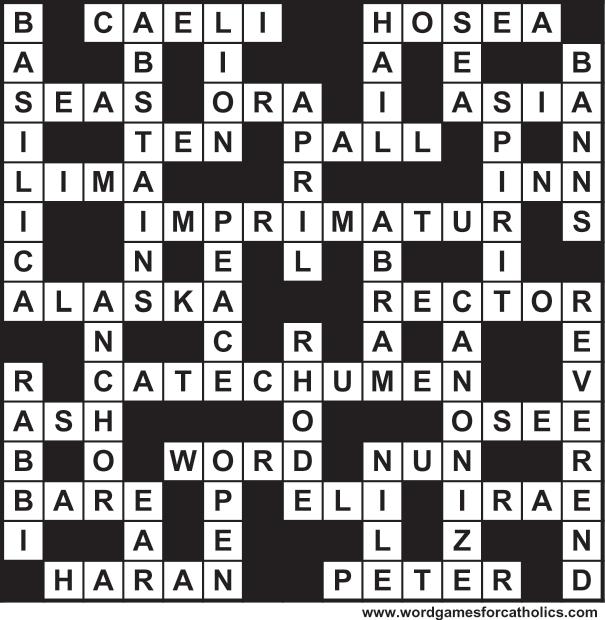
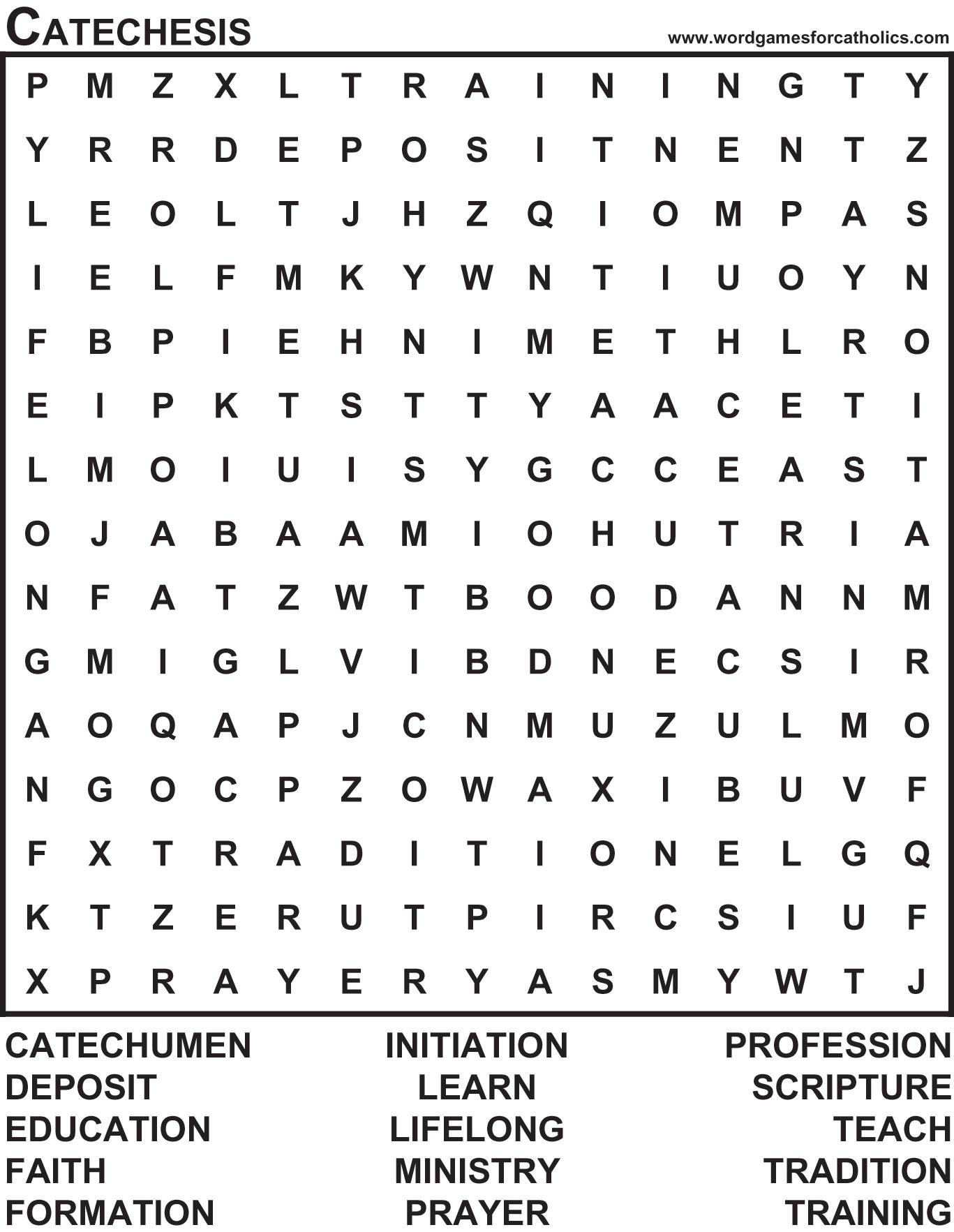
ACCOMMODATION
HOLIDAY ACCOMMODATION
ESPERANCE 3 bedroom house f/furnished Ph 09 9076 5083.
FEMALE HOUSE MATE WANTED Opportunity to live with young Catholic women in the style of the Emmanuel community. A room will be available at the end of the year to join a household of four. Where: 29 Jugan St, Mount Hawthorn, close to St Bernadette’s, Glendalough, shopping and cafes. Enq: Olivia livlav@hotmail.com or 0423 415 823.
BOOK BINDING
NEW BOOK BINDING, General Book Repairs; Rebinding; New Ribbons; Old Leather Bindings Restored. Tydewi Bindery 0422 968 572.
TRADE SERVICES
BRENDON HANDYMAN
SERVICES Home, building maintenance, repairs and renovations. NOR. Ph 0427 539 588.
BRICK RE-POINTING Ph Nigel 9242 2952.
PERROTT PAINTING Pty Ltd
For all your residential, commercial painting requirements. Ph Tom Perrott 9444 1200.
PICASSO PAINTING Top service. Ph 0419 915 836, fax 9345 0505.
LAWN MOWING
WRR LAWN MOWING & WEED
SPRAYING Garden clean ups and rubbish removal. Get rid of bindii, jojo and other unsightly weeds. Based in Tuart Hill. Enq 9443 9243 or 0402 326 637.
FURNITURE REMOVAL
ALL AREAS. Competitive Rates. Mike Murphy Ph 0416 226 434.
DAYBREAK HEALING
Each session offers computerised health scan.
ACUPUNCTURE Aroma-oil
Cupping Massage. Clinic: Guildford / Morley Ph: 0438-979036.
SETTLEMENTS
ARE YOU BUYING OR SELLING
real estate or a business? Why not ask Excel Settlements for a quote for your settlement. We offer reasonable fees, excellent service and no hidden costs. Ring Excel on 9481 4499 for a quote. Check our web site on www.excelsettlements.com.
FOR SALE
ART FOR THE CATHEDRAL www.margaretfane.com.au.
RELIGIOUS PRODUCTS
CATHOLICS CORNER Retailer of Catholic products specialising in gifts, cards and apparel for Baptism, Communion and Confirmation. Ph 9456 1777. Shop 12, 64-66 Bannister Rd, Canning Vale. Open Mon-Sat.
CONVENIENT LOCATIONS FOR BIBLES, BOOKS CARDS, CDs/DVDs, candles, medals, statues and gifts at Ottimo. Shop 108, Trinity Arcade, 671 Hay Street, Perth. Ph 9322 4520. Mon-Fri 9am-6pm Sat 10am2pm and at Station Street Market Subiaco on Fri-Sun 9am-5pm.
RICH HARVEST YOUR CHRISTIAN SHOP Looking for Bibles, CDs, books, cards, gifts, statues, Baptism/Communion apparel, religious vestments, etc? Visit us at 39 Hulme Ct (off McCoy St), Myaree, Ph 9329 9889 (after 10.30am Mon to Sat). We are here to serve.
KINLAR VESTMENTS Quality hand-made and decorated vestments: Albs, Stoles, Chasubles, altar linen, banners etc. 12 Favenc Way, Padbury. By appointment only. Ph Vicki 9402 1318 or 0409 114 093.
Wh Isa 40:1-11 Prepare a way
Ps 95:1-3.10-13 Sing to the Lord
Mt 18:12-14 A hundred sheep
8 W THE IMMACULATE CONCEPTION OF THE BLESSED
Wh VIRGIN MARY (Solemnity)
Gen 3:9-15.20 ‘Where are you?’
Ps 97:1-4 Sing a new song
Eph 1:3-6.11-12 Chosen in Christ
Lk 1:26-38 Deeply disturbed
9 Th St Juan Diego (O)
Vio Isa 41:13-20 The hand of the Lord
Ps 144:1.9-13 Everlasting kingdom
Mt 11:11-15 Focus of earlier prophecies
10 F Isa 48:17-19 The Lord your God
Vio Ps 1:1-4.6 The good, the wicked
Mt 11:16-19 Never satisified
11 S St Damasus I, pope (O)
Vio Sir 48:1-4.9-11 Elijah the glorious
Ps 79:2-3.15-16.18-19 Rouse your might!
Mt 17:10-13 Elijah has come
Page 19 1 December 2010, The Record CLASSIFIEDS
OPPORTUNITIES BUSINESS OPPORTUNITY Work from Home - P/T or
02 8230 0290 or visit
Deadline: 11am Monday Walk With Him 5 S 2nd SUNDAY OF ADVENT Vio Isa 11:1-10 The coming Messiah Ps 71:1-2.7-8.12-13.17 Mercy and justice Rom 15:4-9 Lesson on hope Mt 3:1-12 Preparing the way 6 M St Nicholas, Bishop (O) Vio Isa 35:1-10 Do not be afraid Ps 84:9-14 Peace for his people Lk 5:17-26 Your sins are forgiven 7 Tu St Ambrose, Bishop, Doctor of the Church (M)
F/T,
www.dreamlife1.com.
resurrection
17 Expressed doubts over the
of Christ
Fear of the Lord
21 A dove brought back this branch back to Noah
31 Head of an abbey
Religious instruction, formerly (abbr)
cheek delivered by the Bishop at Confirmation
____ obstat DOWN 1 An angel
Tunic-like vestments
Sacred song
The Diocese of Mobile is located in this US state
Server 6 “___ homo”
Last book of the Bible
St Juan ___
2
3
4
5
7
8
What Goliath was 16 Catholic Actress Dunne 18 Patriarch pit stop? 20 “____ to you, scribes and pharisees …” (Mt 23:13) 23 She was the downfall of Samson 24 Church section
Type of sin
Title for Jesus
Daniel was in this animalʼs den
Apple-eater?
Alien god of the Exodus C R O S S W O R D W O R D S L E U T H
WEEK’S SOLUTION CLASSIFIEDS The Record Bookshop Email: bookshop@therecord.com.au Address: 21 Victoria Square, Perth 6000 Phone: 92205914
27
28
30
31
32
LAST


















The Record Bookshop’s December Catalogue





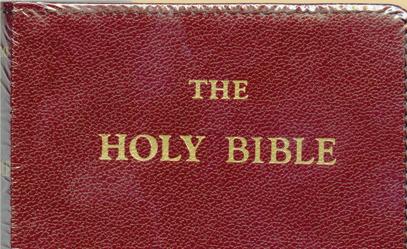



The Holy Bible Pocket size
Douay-Rheims Version
RRP $44.95
This pocketDouay-Rheims edition is the most beautiful and traditional Catholic Bible in English. The first digitally typeset edition with newly redrawn col- our maps, beautifully bound in real Moroccan leather (white flexible cover) with gilt edges. This edition brings together the very best of three Douay-Rheims Editions and has been beautifully retypeset, faithfully to reproduce the original 1899 Gibbons edition. No one can fault the quality and authenticity of the Douay-Rheims Bible, but all previous editions have had to compro- mise on the quality of the text printing.


The Holy Bible Medium
Douay-Rheims Version
RRP $89.95
Handy Size Douay- Rheims Holy Bible Bonded Leather Edition. Compared to the more modern editions of holy writ, the centuries old Douay is the most loyal of all to the literal meaning of the inspired text. If you wish to give someone the written word of God as a gift, why not fulfill that to the letter with this time honored edition. Wrapped in black bonded leather, it makes a perfect gift. This handy size Bible (5.5 x 8.5 ) has a clear and readable typeface. Bonded leather hardcover 1,392 pages as well as Satin ribbon page markers


Holy Family Christmas Wreath













The Holy Bible large
Douay-Rheims Version
RRP $97.95
The most beautiful and traditional Catholic Bible in English! The first ever digitally typeset edition with newly redrawn col- our maps, beautifully bound in leather with gilt edges. This edition brings together the very best of three Douay-Rheims Editions: The Old and New Testaments, maps digitally redrawn by hand and fully coloured, and Engravings recreating key moments in Biblical history. In our edition, they have been scanned, carefully remastered and enhanced, and their captions have been retypeset and corrected to match the appropriate verses in the Bible text.





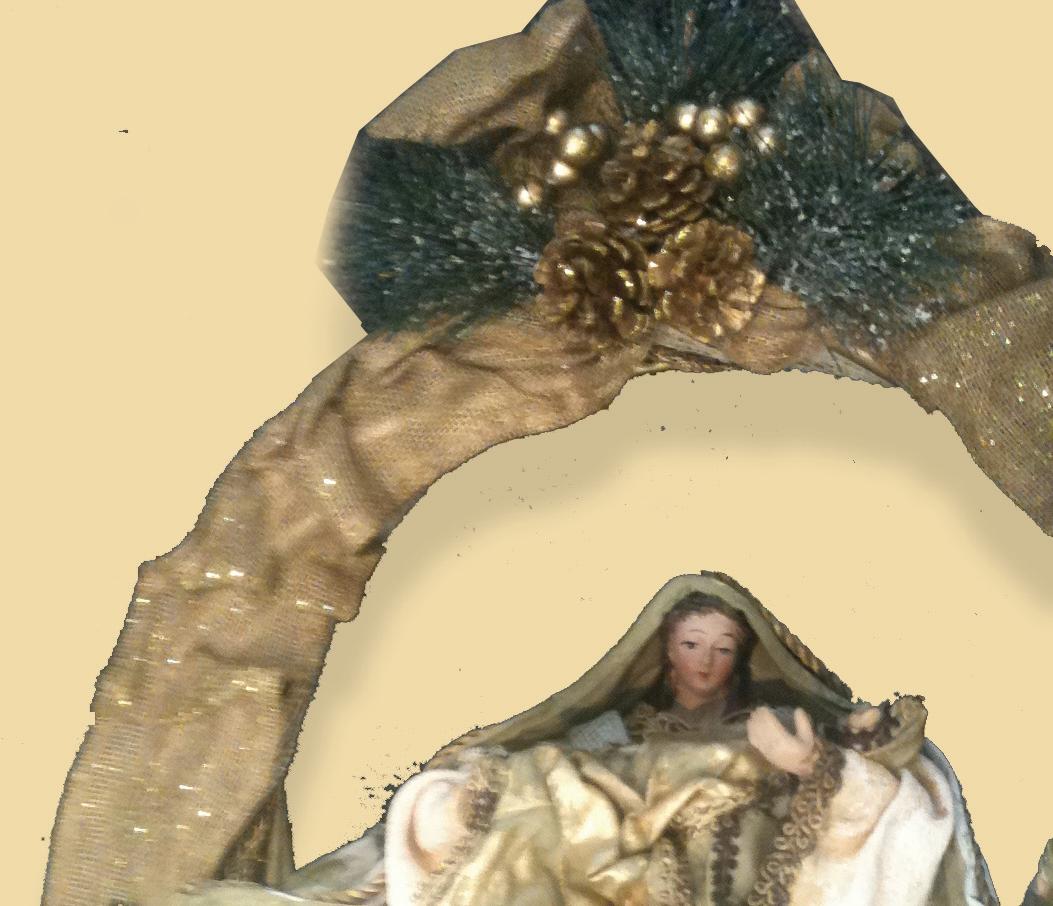
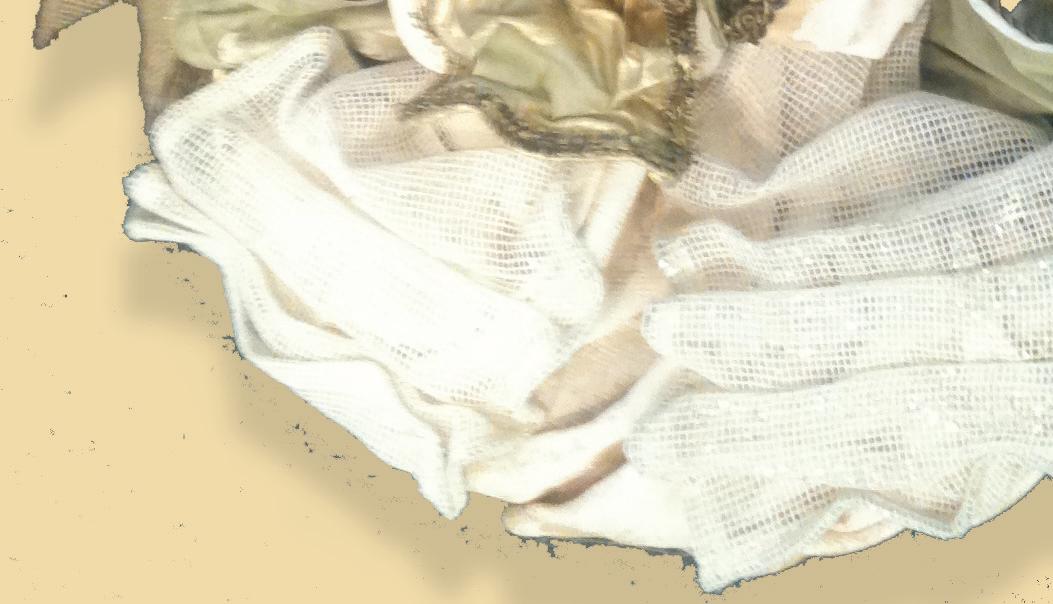





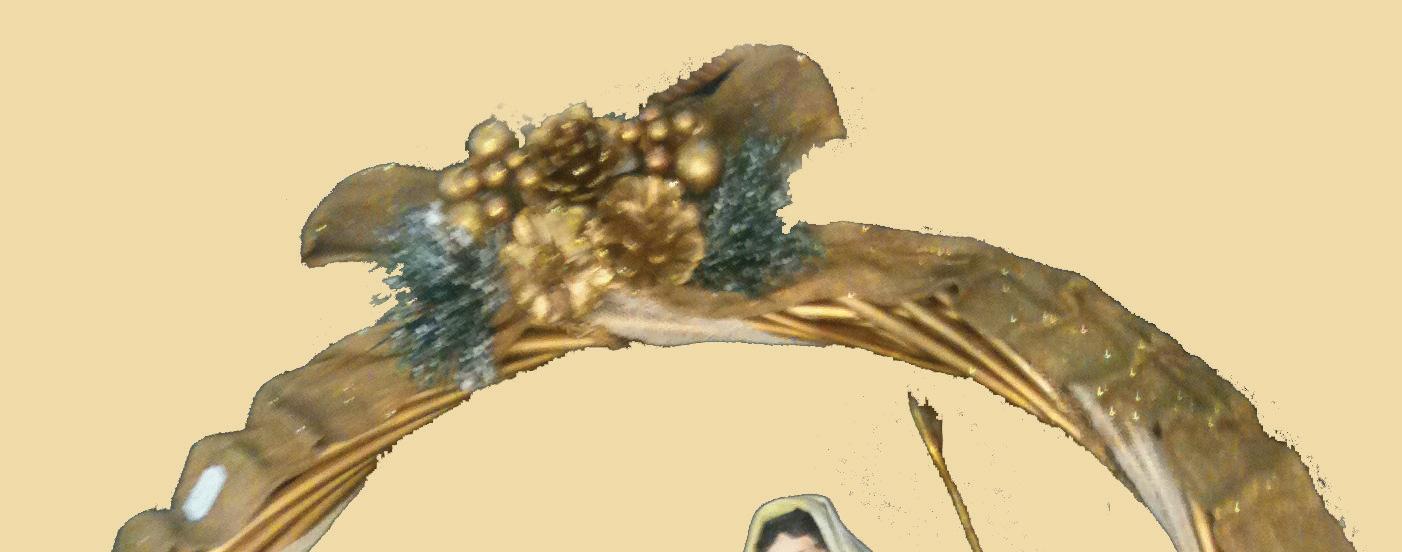
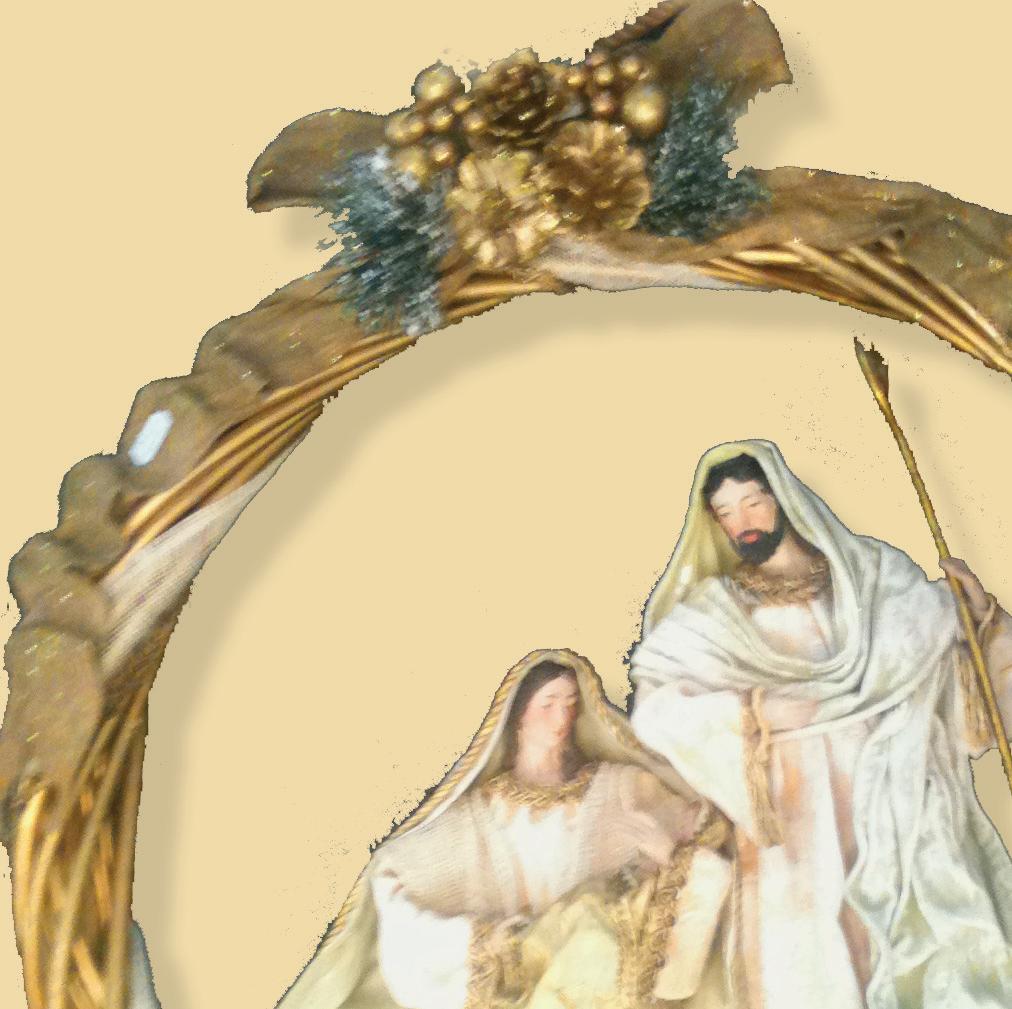
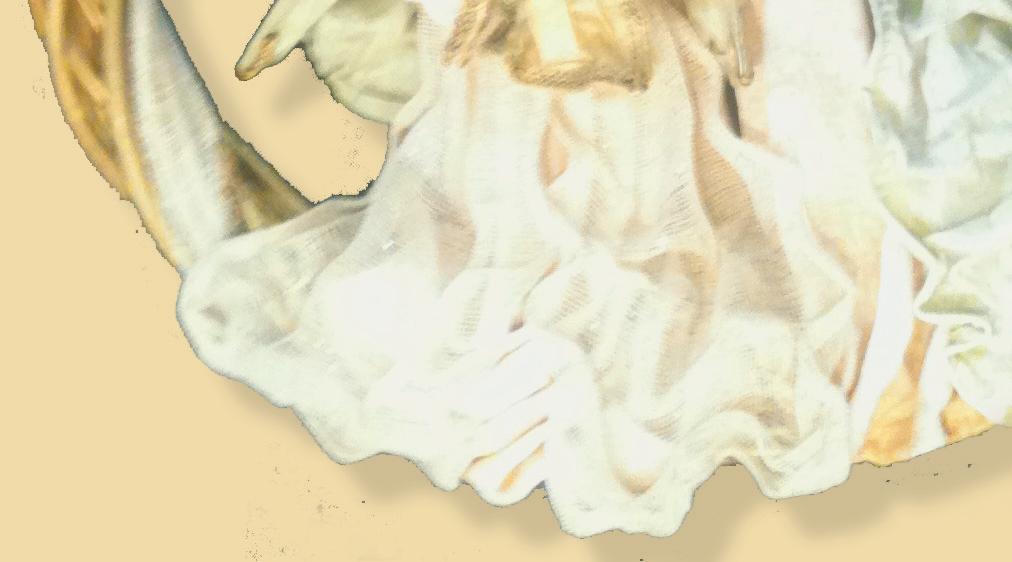









T
P D R T p m d i d w
T M D R H R B C m w D a T l D R T t i d w o b e
Telephone: 9220 5901 Email: bookshop@therecord.com.au Address: 21 Victoria Square, Perth 6000 BIBIANA KWARAMBA Bookshop Manager
Large: $94.95 Small: $44.95







 BY BRIDGET SPINKS
BY BRIDGET SPINKS















 Honduran Cardinal Oscar Rodriguez Maradiaga of Tegucigalpa, who told The Record that the debate triggered by Pope Benedict XVI’s comments in a new book-length interview regarding condoms is an ideal opportunity to explain to Catholics of Church’s teachings on the subject, as many don’t know it. CNS
Graeme Scullion, Year 7, packs Christmas bags for the homeless.
Honduran Cardinal Oscar Rodriguez Maradiaga of Tegucigalpa, who told The Record that the debate triggered by Pope Benedict XVI’s comments in a new book-length interview regarding condoms is an ideal opportunity to explain to Catholics of Church’s teachings on the subject, as many don’t know it. CNS
Graeme Scullion, Year 7, packs Christmas bags for the homeless.






























































 By Fr John Flader
By Fr John Flader

































